 09/05/2009 17:42 09/05/2009 17:42 |
|
| | | OFFLINE | | Post: 17.402
Post: 120 | Registrato il: 28/08/2005
Registrato il: 20/01/2009 | Administratore | Utente Junior | |
|

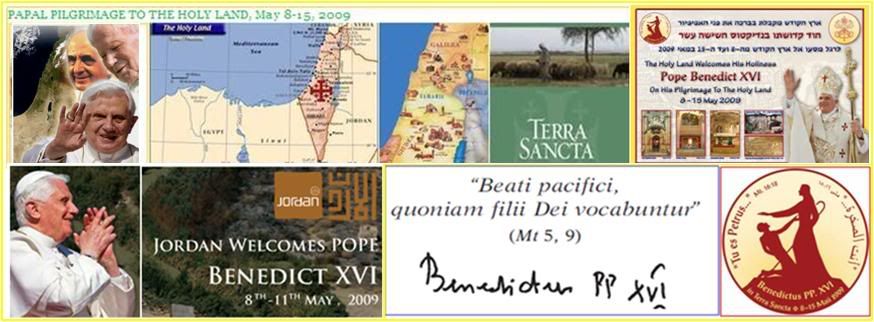 This was the third public event on the Holy Father's schedule today. Accounts of the first two events, with the texts of his addresses, are on the preceding page.
DAY 2- VISIT TO THE HASHEMITE MUSEUM
This was the third public event on the Holy Father's schedule today. Accounts of the first two events, with the texts of his addresses, are on the preceding page.
DAY 2- VISIT TO THE HASHEMITE MUSEUM
AND THE KING HUSSEIN MOSQUE OF AMMAN:
Address to Muslim religious leaders,
the diplomatic corps of Amman and
university rectors of Jordan
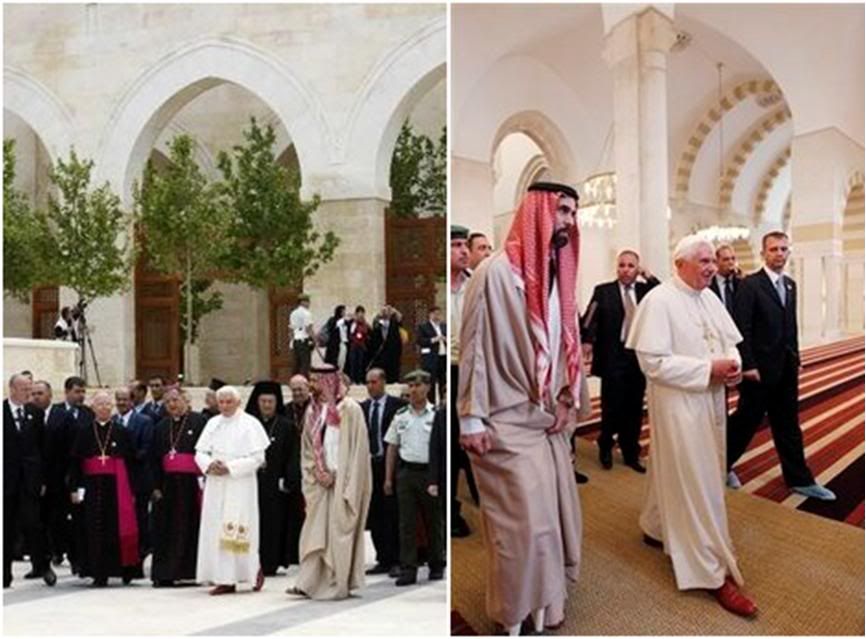 Prince Ghazi, whose initiative led to the dialog initiative 'A COMMON WORD', was the Holy Father's host at the Museum and Mosque.
ADDRESS AT THE KING HUSSEIN MOSQUE
Prince Ghazi, whose initiative led to the dialog initiative 'A COMMON WORD', was the Holy Father's host at the Museum and Mosque.
ADDRESS AT THE KING HUSSEIN MOSQUE
Your Royal Highness,
Your Excellencies,
Distinguished Ladies and Gentlemen,
It is a source of great joy for me to meet with you this morning in this magnificent setting. I wish to thank Prince Ghazi Bin Muhammed Bin Talal for his kind words of welcome.
Your Royal Highness’s numerous initiatives to promote inter-religious and inter-cultural dialogue and exchanges are appreciated by the people of the Hashemite Kingdom and they are widely respected by the international community.
I know that these efforts receive the active support of other members of the Royal Family as well as the nation’s government, and find ample resonance in the many initiatives of collaboration among Jordanians. For all this, I wish to express my own heartfelt admiration.
Places of worship, like this splendid Al-Hussein Bin Talal mosque named after the revered late King, stand out like jewels across the earth’s surface.
From the ancient to the modern, the magnificent to the humble, they all point to the divine, to the Transcendent One, to the Almighty. And through the centuries these sanctuaries have drawn men and women into their sacred space to pause, to pray, to acknowledge the presence of the Almighty, and to recognize that we are all his creatures.
For this reason we cannot fail to be concerned that today, with increasing insistency, some maintain that religion fails in its claim to be, by nature, a builder of unity and harmony, an expression of communion between persons and with God.
Indeed some assert that religion is necessarily a cause of division in our world; and so they argue that the less attention given to religion in the public sphere the better.
Certainly, the contradiction of tensions and divisions between the followers of different religious traditions, sadly, cannot be denied. However, is it not also the case that often it is the ideological manipulation of religion, sometimes for political ends, that is the real catalyst for tension and division, and at times even violence in society?
In the face of this situation, where the opponents of religion seek not simply to silence its voice but to replace it with their own, the need for believers to be true to their principles and beliefs is felt all the more keenly.
Muslims and Christians, precisely because of the burden of our common history so often marked by misunderstanding, must today strive to be known and recognized as worshippers of God faithful to prayer, eager to uphold and live by the Almighty’s decrees, merciful and compassionate, consistent in bearing witness to all that is true and good, and ever mindful of the common origin and dignity of all human persons, who remain at the apex of God’s creative design for the world and for history.
The resolve of Jordanian educators and religious and civic leaders to ensure that the public face of religion reflects its true nature is praiseworthy.
The example of individuals and communities, together with the provision of courses and programmes, manifest the constructive contribution of religion to the educational, cultural, social and other charitable sectors of your civic society.
Some of this spirit I have been able to sample at first hand. Yesterday, I experienced the renowned educational and rehabilitation work of the Our Lady of Peace Centre where Christians and Muslims are transforming the lives of entire families, by assisting them to ensure that their disabled children take up their rightful place in society.
Earlier this morning, I blessed the foundation stone of Madaba University where young Muslim and Christian adults will side by side receive the benefits of a tertiary education, enabling them to contribute justly to the social and economic development of their nation.
Of great merit too are the numerous initiatives of inter-religious dialogue supported by the Royal Family and the diplomatic community and sometimes undertaken in conjunction with the Pontifical Council for Inter-religious Dialogue.
These include the ongoing work of the Royal Institutes for Inter-faith studies and for Islamic Thought, the Amman Message of 2004, the Amman Interfaith Message of 2005, and the more recent Common Word letter which echoed a theme consonant with my first encyclical: the unbreakable bond between love of God and love of neighbour, and the fundamental contradiction of resorting to violence or exclusion in the name of God (cf. Deus Caritas Est, 16).
Such initiatives clearly lead to greater reciprocal knowledge, and they foster a growing respect both for what we hold in common and for what we understand differently.
Thus, they should prompt Christians and Muslims to probe even more deeply the essential relationship between God and his world so that together we may strive to ensure that society resonates in harmony with the divine order.
In this regard, the co-operation found here in Jordan sets an encouraging and persuasive example for the region, and indeed the world, of the positive, creative contribution which religion can and must make to civic society.
Distinguished friends, today I wish to refer to a task which I have addressed on a number of occasions and which I firmly believe Christians and Muslims can embrace, particularly through our respective contributions to learning and scholarship, and public service.
That task is the challenge to cultivate for the good, in the context of faith and truth, the vast potential of human reason. Christians in fact describe God, among other ways, as creative Reason, which orders and guides the world. And God endows us with the capacity to participate in his reason and thus to act in accordance with what is good.
Muslims worship God, the Creator of Heaven and Earth, who has spoken to humanity. And as believers in the one God we know that human reason is itself God’s gift and that it soars to its highest plane when suffused with the light of God’s truth.
In fact, when human reason humbly allows itself to be purified by faith, it is far from weakened; rather, it is strengthened to resist presumption and to reach beyond its own limitations.
In this way, human reason is emboldened to pursue its noble purpose of serving mankind, giving expression to our deepest common aspirations and extending, rather than manipulating or confining, public debate.
Thus, genuine adherence to religion – far from narrowing our minds – widens the horizon of human understanding. It protects civil society from the excesses of the unbridled ego which tend to absolutize the finite and eclipse the infinite; it ensures that freedom is exercised hand in hand with truth, and it adorns culture with insights concerning all that is true, good and beautiful.
This understanding of reason, which continually draws the human mind beyond itself in the quest for the Absolute, poses a challenge; it contains a sense of both hope and caution.
Together, Christians and Muslims are impelled to seek all that is just and right. We are bound to step beyond our particular interests and to encourage others, civil servants and leaders in particular, to do likewise in order to embrace the profound satisfaction of serving the common good, even at personal cost.
And we are reminded that because it is our common human dignity which gives rise to universal human rights, they hold equally for every man and woman, irrespective of his or her religious, social or ethnic group.
In this regard, we must note that the right of religious freedom extends beyond the question of worship and includes the right – especially of minorities – to fair access to the employment market and other spheres of civic life.
Before I leave you this morning I would like to acknowledge in a special way the presence among us of His Beatitude Emmanuel III Delly, Patriarch of Baghdad, whom I greet most warmly.
His presence brings to mind the people of neighbouring Iraq many of whom have found welcome refuge here in Jordan. The international community’s efforts to promote peace and reconciliation, together with those of the local leaders, must continue in order to bear fruit in the lives of Iraqis.
I wish to express my appreciation for all those who are assisting in the endeavors to deepen trust and to rebuild the institutions and infrastructure essential to the well-being of that society.
And once again, I urge diplomats and the international community they represent together with local political and religious leaders to do everything possible to ensure the ancient Christian community of that noble land its fundamental right to peaceful coexistence with their fellow citizens.
Distinguished friends, I trust that the sentiments I have expressed today will leave us with renewed hope for the future. Our love and duty before the Almighty is expressed not only in our worship but also in our love and concern for children and young people – your families – and for all Jordanians.
It is for them that you labor and it is they who motivate you to place the good of every human person at the heart of institutions, laws and the workings of society.
May reason, ennobled and humbled by the grandeur of God’s truth, continue to shape the life and institutions of this nation, in order that families may flourish and that all may live in peace, contributing to and drawing upon the culture that unifies this great Kingdom!
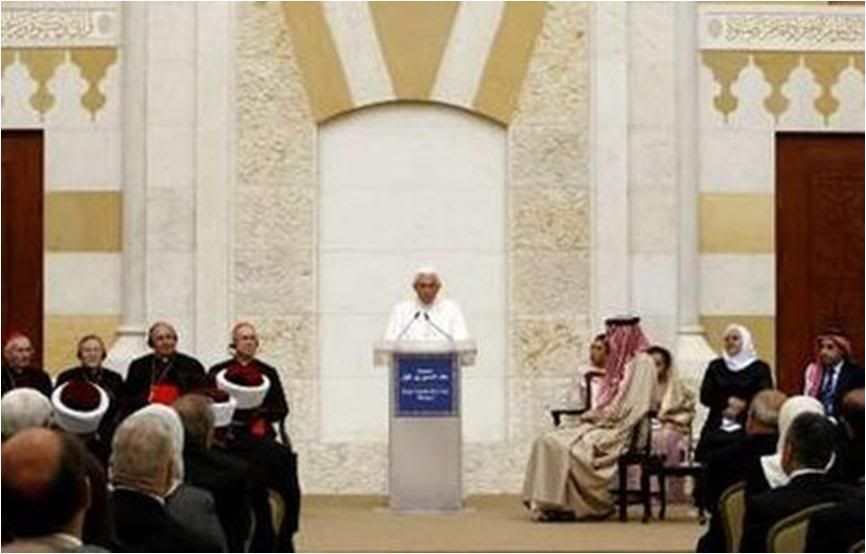 The man behind 'A Common Word'
The man behind 'A Common Word'
thanks the Pope for expressing regret
that Muslims took offense at
Regensburg lecture citation
By VICTOR L. SIMPSON

AMMAN, Jordan. May 9 (AP) – The top religious adviser to Jordan's king thanked Pope Benedict XVI on Saturday for expressing regret after a speech three years ago that many Muslims deemed insulting to Islam's Prophet Muhammad.
Prince Ghazi bin Mohammed spoke after giving Benedict a tour of the biggest mosque in Amman, his second visit to a Muslim place of worship since becoming Pope in 2005.
Benedict is in Jordan on his first Middle East tour in which he hopes to improve strained ties with both Muslims and Jews.
The Pope angered many in the Muslim world in 2006 when he quoted a medieval text that characterized some of Muhammad's teachings as "evil and inhuman," particularly "his command to spread by the sword the faith."
Shortly after giving the speech, Benedict said he regretted that the comments offended Muslims.
Ghazi, who is also King Abdullah II's cousin, thanked Benedict for the clarification he issued after the speech that the views did not reflect his own opinion but were instead "simply a citation in an academic lecture."
[How could Simpson fail to mention that Prince Ghazi was the moving spirit behind 'A Common Word', nor even mention the substantial emphasis the prince gave to that effort and its institutionalization in the Catholic-Muslim Forum????]
Benedict told the audience of religious leaders and government officials assembled at the King Hussein Mosque Saturday that Muslims and Christians must strive to be seen as faithful worshippers of God "because of the burden of our common history" that has often been marked by misunderstanding.
The Pope said it is often "ideological manipulation of religion sometimes for political ends that is the real catalyst for tension and division and at times even violence in society."
Vatican spokesman Federico Lombardi said the Pope did not pray during his visit to the mosque but did stop in a "respectful moment of reflection." [How does Fr. Lombardi know that the reflectionw as not a prayer at the same time??? And why must it be pointed out that 'he did not pray' - as though to do so were sinful or imrporper!]
He was not asked to take his shoes off when he entered the mosque, which is customary for Muslims, said Lombardi.
Ghazi, who was dressed in a white robe and red and white-checkered headscarf, asked the Pope to speak up for Muslim minorities in parts of the Philippines* and sub-Saharan Africa who he said were "hard-pressed by Christian majorities."
Benedict expressed "deep respect" for Islam on Friday, when he arrived in Jordan on the first day of his Mideast tour, but his comments in 2006 continue to fuel criticism by some Muslims.
Jordan's hard-line Muslim Brotherhood, the country's largest opposition group, said they were boycotting the Pope's visit because he did not issue a public apology ahead of time as they demanded.
The Pope has also had strained ties with Jews that he hopes to improve during his Mideast tour, which will take him to Israel and the Palestinian territories.
Benedict spoke of an "inseparable bond" between the Catholic Church and the Jewish people Saturday when he visited Mount Nebo, the wind-swept hill overlooking the Jordan valley where the Bible says Moses saw the Promised Land.
"May our encounter today inspire in us a renewed love for the canon of sacred scripture and a desire to overcome all obstacles to the reconciliation of Christians and Jews in mutual respect and cooperation in the service of that peace to which the word of God calls us," said the German-born Benedict.
The Pope sparked outrage among many Jews earlier this year when he revoked the excommunication of an ultraconservative bishop who denies the Holocaust. [And still Simpson does not add the simple statement that the revocation had nothing to do with Williamson's personal merits at all because excommunication is a a punishment for violation of church law and not a judgment on a person's opinions or even his private conduct.]
Benedict's forceful condemnation of anti-Semitism and acknowledgment of Vatican mistakes have softened Jewish anger over the bishop. But another sore point has been World War II Pope Pius XII, whom Benedict has called a "great churchman." Jews and others say he failed to do all he could to stop the extermination of European Jews.
Despite the disputes, Jewish leaders say Benedict, who served in the Hitler Youth corps as a young man in Germany and then in the army before deserting near the end of the war, has an excellent record in fighting anti-Semitism.
[Again, why not add just one word 'conscripted into the Hitler Youth and then the army, because the way Simpson phrased it would let the reader sho knew nothing about JosephRatzinger to think that he voluntarily entered the Hitler Youth and the German army! The bad faith consistently shown in his reporting by a veteran Vatican correspondent like Simpson is truly inexcusable. He was among the most inflammatory in the way he reported the Regensburg lecture in 2006 after the Muslims had started to protest!]
He has already visited synagogues in Cologne, Germany, and New York and is expected at Rome's central synagogue later this year.

* [I must confess I was shocked when I heard the Prince say that about the Philippines. There has never been any history of Christian maltreatment of Muslims in my country. It's the other way around - in the 1960s, Muslim separatist guerillas started to operate in the southern island of Mindanao, where most Filipino Muslims live (Islam came to it by way of neighboring Indonesia) even if they have never constituted more than 10% of the population on that island and in the country.
These are the guerrillas responsible for the well-known kidnappings and other acts of violence that have increasingly afflicted many parts of the Philippine South in the past decade.]
From the website of

here is the complete text of Prince Ghazi's speech today.
ADDRESS TO H.H. POPE BENEDICT XVI
AT THE KING HUSSEIN MOSQUE, AMMAN, JORDAN
By: H.R.H. Prince Ghazi bin Muhammad bin Talal
Saturday May 9th, 2009 CE, 14th Jamada Al-Uwla, 1430 AH
Al-Salaam ‘Aleikum,
Pax Vobis,
On the occasion of this historic visit to the King Hussein bin Talal
Mosque here in Amman, Jordan, I bid Your Holiness Pope Benedict XVI
welcome in four ways.
First, as a Muslim, I bid Your Holiness welcome today, as we understand this visit to be a deliberate gesture of goodwill and mutual respect from the Supreme Spiritual Leader and Pontiff of the largest denomination of the world’s largest religion to the world’s second largest religion.
Indeed, Christians and Muslims together make up over 55% of the world’s population and so it is especially significant that this is only the third time in history a reigning Pope has visited a mosque; the first being by Your Holiness’s much beloved predecessor Pope John Paul II to the historical Umayyad Mosque in Damascus (which contains the remains of John the Baptist [may peace be upon him]) in 2001, and the second being by Your Holiness to the Magnificent Blue Mosque of Sultan Ahmed in Istanbul in 2006.
The beautiful King Hussein Mosque here in Amman, Jordan, is Jordan’s State Mosque and it was built and personally supervised by His Majesty King Abdullah II in loving honour of his late father, Jordan’s great King Hussein (may God have mercy on his soul).
Thus, this is the first time inn history that a Pope has ever visited a new mosque. Hence we see in this visit a clear message of the necessity of interfaith harmony and mutual respect in the contemporary world, as well as concrete proof of the willingness of Your Holiness to personally take a leading role in this.
This gesture is all the more remarkable given the fact that this visit to Jordan by Your Holiness is primarily a spiritual pilgrimage to the Christian Holy Land (and in particular to the Site of the Baptism of Jesus Christ [may peace be upon him] by John the Baptist [peace be upon him] at Bethany beyond the Jordan (John 1:28 and John 3:26).
And yet Your Holiness has made time in your intense and tiring schedule — tiring for a man of any age — for this visit to the King Hussein Mosque in order to honour Muslims.
I must also thank Your Holiness for the “regret” you expressed after the Regensburg lecture of September 13th 2006, for the hurt caused by this lecture to Muslims.
Of course, Muslims know that nothing said or done in this world can harm the Prophet (may peace and blessings be upon him), who, as his last words attested, is with the Highest Companion — God Himself — in Paradise, but Muslims were nevertheless hurt because of their love for the Prophet (may peace and blessings be upon him), who is, as God says in the Holy Quran, closer to the believers than their own selves (Al-Ahzab, 33:6).
Hence, Muslims also especially appreciated the clarification by the Vatican that what was said in the Regensburg lecture did not reflect Your Holiness’s own opinion, but rather was simply a citation in an academic lecture.
It hardly needs to be said, moreover, that the Prophet Mohammad (may peace and blessings be upon him) whom Muslims love, emulate and know as a living reality and spiritual presence, is completely and entirely different from the historical depictions of him in the West since St. John of Damascus.
These distorted depictions by those who either do not know Arabic or the Holy Quran and the Hadith, or who do not understand the historical and cultural context of the Prophet’s life — and thus misunderstand and misconstrue the spiritual motives and intentions behind many of the Prophet’s (may peace and blessings be upon him) actions and words — are unfortunately responsible for much historical and cultural tension between Christians and Muslims.
It is thus incumbent on Muslims to explain the Prophet’s example (may peace and blessings be upon him) above all with deeds of virtue, charity, piety and goodwill; recalling that the Prophet himself (may peace and blessings be upon him) was of an exalted standard of character (Al-Qalam, 68:4).
For God says in the Holy Quran: “Verily ye have in the Messenger of God a beautiful pattern of conduct for whosoever hopes in God and the Last Day, and remembereth God much”. (Al-Ahzab, 33:21)
Finally, I must also thank your Holiness for many other friendly gestures and kindly actions towards Muslims since your ascension in 2005 — including graciously receiving both H.M. King Abdullah II bin Al-Hussein of Jordan in 2005 and H.M. King AbdAllah bin Abd Al-Aziz of Saudi Arabia, the Custodian of the Two Holy Places in 2008 — and eespecially for your warm reception of the historical “A Common Word Between Us and You” Open Letter of October 13th 2007, by 138 leading international Muslim scholars (whose numbers continue increasing to this day).
It was as a result of this initiative — which, based on the Holy Qur’an and the Bible, recognised the primacy of the Love of God and Love of the Neighbour in both Christianity and Islam — that the Vatican under your personal guidance held the first seminar of the International Muslim Catholic forum from November the 4th – 6th 2008.
We will be shortly, Deo volente, following up with H.E. the very able Cardinal Tauran the work initiated by this meeting, but for now, I would like to cite and echo your words from the speech your Holiness gave on the occasion of the end of the First Seminar:
The theme which you have chosen for your meeting — “Love of God, Love of Neighbour: the Dignity of the Human Person and Mutual Respect” — is particularly significant. It was taken from the Open Letter, which presents love of God and love of the neighbour as the heart of Islam and Christianity alike.
This theme highlights even more clearly the theological and spiritual foundations of a central teaching of our respective religions. ….
I am well aware that Muslims and Christians have different approaches in matters regarding God. Yet we can and must be worshippers of the One God who created us and is concerned about each person in every corner of the world. ….
There is a great and vast field in which we can act together in defending and promoting the moral values which are part of our common heritage.…
Now I cannot help but remember God’s words in the Holy Qur’an:
Yet they are not all alike; some of the People of the Scripture are a community upright, who recite God’s verses in the watches of the night, prostrating themselves. / They believe in God and in the Last Day, enjoining decency and forbidding indecency, vying with one another in good works; those are of the righteous. / And whatever good they do, they shall not be denied it, and God knows the God-fearing. (Aal-‘Imran, 3:113-115)
And:
…And you will truly find the nearest of them in love to those who believe to be those who say ‘Verily, we are Christians’; that is because some of them are priests and monks, and because they are not proud. (Al-Maida, 5:82)
Second, as a Hashemite, and a descendant of the Prophet Muhammad (may peace and blessings be upon him), I also bid Your Holiness welcome to this mosque in Jordan, remembering that the Prophet (may peace and blessings be upon him) welcomed his Christian neighbours from Najran to Medina and invited them to pray in his own Mosque, which they did, in harmony, without either side compromising their own spiritual beliefs. This, too, is an invaluable message which the world desperately needs to remember.
Third, as an Arab — a direct descendant of Ishmael (peace be upon him) of whom the Bible says God would make him a great nation (Genesis, 21:18) and that God was with him (Genesis, 21:20) — I bid Your Holiness welcome.
One of the cardinal virtues of the Arabs — whom traditionally have survived in some of the hottest and most inhospitable climates in the
world — is hospitality. Hospitality is born of generosity and it recognises the needs of the neighbour and considers those who are far or who come from afar as neighbours, and indeed this virtue is confirmed by God in the Holy Qur’an with the words:
And worship God, and associate nothing with Him. Be kind to parents, and near kindred, and to orphans, and to the needy, and to the neighbour who is near, and to the neighbour who is a stranger, and to the friend at your side, and to the wayfarer, and to what your right hands possess. Surely God loves not the conceited, and the boastful. (Al-Nisa, 4:36)
Arab hospitality means not only loving to give and help, but also being generous of spirit and thus appreciative.
In 2000, during the late Pope John Paul II’s visit to Jordan, I was working with the Jordanian Tribes, and some tribesmen were saying they really liked the late Pope. Someone asked them why they liked him, since he was a Christian and they were Muslims.
They smiled and said: “because he visited us!”, and of course the late Pope John Paul II, like yourself could have easily just gone to Israel and Palestine, but instead chose to start his pilgrimage with a visit to us here in Jordan, which we appreciate.
Fourth and finally, as a Jordanian, I bid Your Holiness welcome. In Jordan, everyone is equal before the law regardless of religion, race, origin or gender, and those who work in the government are responsible to do their utmost to care for everyone in the country with compassion and with justice.
This was the personal example and message of the late King Hussein who over his long reign of forty-seven years felt for everyone in the country as he did for his own children.
It is also the message of his son, H.M. King Abdullah II who accordingly has made it the singular goal of his life and reign to make the life of every Jordanian — and indeed every person in the world — as decent, dignified and happy as he possibly can with Jordan’s meagre resources.
Today, Christians in Jordan enjoy, by law, 8% of the seats in Parliament and similar quotas at every level of government and society — even though their numbers are less than that in actual fact — in addition to their own personal status laws and Church courts.
Their Holy Sites and legal Educational Institutes and other needs are safeguarded by the state — and Your Holiness has just seen this in person at the New Catholic University of Madaba, and will. God willing, soon see the New Catholic Cathedral and the new Melkite Church at the Baptism Site — and so Christians prosper today in Jordan as they have for the last 2000 years in peace and harmony, and with goodwill and genuine brotherly relations between them and their Muslim neighbours.
This is in part of course because Christians used to be more numerous in Jordan percentage-wise than they are today but declining Christian birth rates and conversely, high levels of education and prosperity(which has led to their being in demand as immigrants to the West) have reduced their numbers.
It is also, however, due to the fact that Jordan appreciates that Christians were in Jordan for 600 years before Muslims. Indeed, Jordanian Christians are perhaps the oldest Christian community in the world — and the majority have always been Orthodox adherents to the Orthodox Patriarchate of Jerusalem and the Holy Land — which, as Your Holiness knows better than I, is the Church of St. James, and was founded during Jesus’s own lifetime (may peace be upon him).
Many of them are descended from the ancient Arab Ghassanid and Lakhmid Tribes, and they have throughout history shared the fate and the struggles of their Muslim fellow tribesmen.
Indeed, in 630 CE during the Prophet Muhammad’s own lifetime — may peace and blessings be upon him — they joined the Prophet’s own army (led by his adopted son Zeid ibn Al-Haritha and his cousin Jafar bin Abi Taleb) and fought against the Byzantine army of their fellow Orthodox at the Battle of Mutah (it is because of this battle that they earned their tribal name “‘Uzaizat” which means “the reinforcements” — and Latin Patriarch Fuad Twal himself comes from these tribes); then in 1099 CE they were slaughtered by Catholic Crusaders at the Fall of Jerusalem alongside their Muslim comrades; later from 1916-1918 CE during the Great Arab revolt they fought against the Muslim Turks alongside Arab Muslim comrades; they thereafter languished for a few decades along with their Muslim fellows under a Protestant Colonial Mandate, and in the Israeli Arab Wars of 1948, 1967 and 1968 they fought with their Muslim Arab comrades against Jewish opponents.
Christian Jordanians have not only always defended Jordan, but have also tirelessly and patriotically helped to build Jordan, playing leading roles in the fields of education, health, commerce, tourism, agriculture, science, culture and many other fields.
All this is to say then, that whilst Your Holiness may believe them to be your fellow Christians, we know them to be our fellow Jordanians, and they are as much a part of the country as the land itself.
We hope that this unique Jordanian spirit of interfaith harmony, benevolence and mutual respect will serve as an example to the whole world, and that Your Holiness will carry it to places like Mindanao and certain parts of sub-Saharan Africa where Muslim minorities are hard-pressed by Christian majorities, as well as to other places where the opposite is the case.
Now, just as we welcome Your Holiness today in four ways, we receive Your Holiness today in four ways:
First, we receive Your Holiness as the Spiritual Leader, Supreme Pontiff and the successor of St. Peter for 1.1 billion Catholics, who are neighbours of Muslims everywhere in the world, and who we greet through receiving you.
Second, we receive Your Holiness, as Pope Benedict XVI in particular, whose reign has been marked by the moral courage to do and speak his conscience, no matter what the vogue of the day; who is personally also a Master Christian Theologian responsible for historical Encyclical Letters on the beautiful cardinal virtues of Charity and Hope; who has re-facilitated the traditional Latin Mass for those who choose it, and who has simultaneously made intra-faith and inter-faith dialogue a top priority of his reign in order to spread goodwill and understanding throughout all peoples of the world.
Third, we receive Your Holiness as a Head of State who is also a world and global leader on the vital issues of morality, ethics, the
environment, peace, human dignity, the alleviation of poverty and suffering, and even the global financial crisis.
Fourth and finally, we receive Your Holiness as a simple pilgrim of peace who comes in humility and gentleness to pray where Jesus Christ, the Messiah — may be peace be upon him — prayed, was baptised and began his mission two thousand years ago.
So welcome to Jordan, Your Holiness Pope Benedict XVI!
God says in the Holy Qur’an to the Prophet Muhammad (may peace and blessings be upon him):
Glory be to your Lord, the Lord of Might, [exalted is He] above what they allege! / And peace be to the messengers. / And praise be to God, Lord of the Worlds. (Al-Saffat, 37:180-182)
© 2009, Ghazi bin Muhammad bin Talal
[Modificato da TERESA BENEDETTA 09/05/2009 22:02] |
| |
|
| |
 09/05/2009 20:50 09/05/2009 20:50 |
|
| | | OFFLINE | | Post: 17.403
Post: 121 | Registrato il: 28/08/2005
Registrato il: 20/01/2009 | Administratore | Utente Junior | |
|
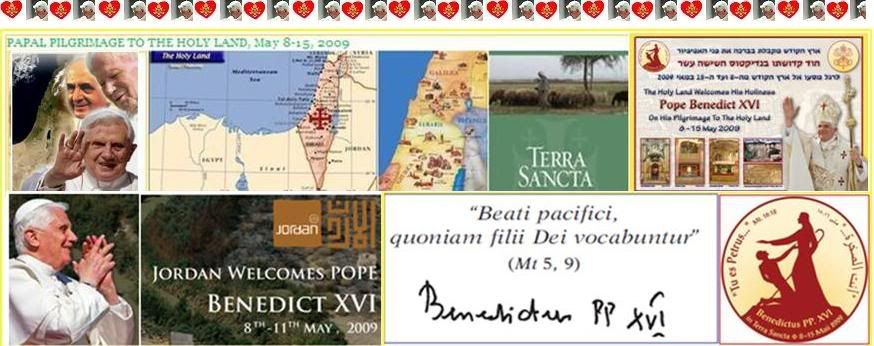 All my hackles were up as I started to read Jeff Israely's instant take on the Holy Father's Regensburg follow-up today. But despite the usual biases, both ideological aa well as self-serving, he does get the point this time and says so!
All my hackles were up as I started to read Jeff Israely's instant take on the Holy Father's Regensburg follow-up today. But despite the usual biases, both ideological aa well as self-serving, he does get the point this time and says so!
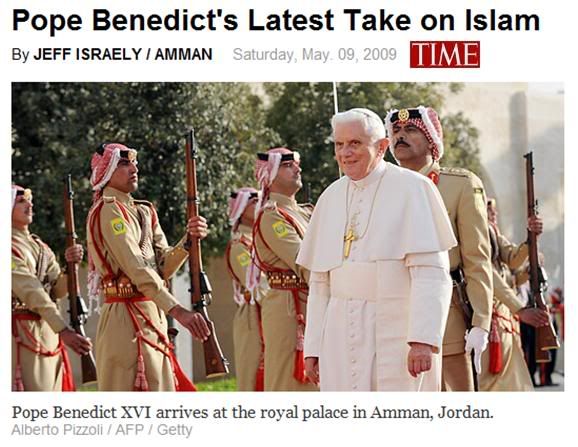
Under Pope Benedict XVI's reign, the Vatican dossier on Islam could be entitled: "Regensburg, and Everything After."
Regensburg was the professor Pope's landmark 2006 discourse at his former university that included a nasty historical citation about the prophet Mohammed and provocatively asked if Islam lacks reason, making it inherently prone to violence.
The worldwide protests among Muslims, including a handful of church burnings and the killing of a nun, forced the Pope to quickly change his approach, and soften his tone.
[Your opinion, Israely, and that of your like-minded colleagues! Not objective fact. All of you are covering this pilgrimage with vulture eyes on just how to 'trip up' the Pope on Islam or on the Jews. All of the reportage by the Western MSM so far has been oriented along Regenbsurg and Williamson - events that you consider and constantly deride as blunders by Benedict, so you are all invested in proving yourselves 'right', even if all the evidence you can muster is your own self-interested, self-serving and tendentious reporting.]
But while he has spent the past two-plus years reaching out to Islamic leaders, Benedict has subtly tried to keep alive the hard questions he posed at the German university.
Benedict has expanded on this formula since landing Friday in the moderate Muslim kingdom of Jordan, the first stop on his eight-day Holy Land pilgrimage.
He told King Abdullah II upon his arrival in Amman that he has "deep respect" for Islam, and on Saturday he was welcomed in the country's largest mosque and gave another fascinating — if less radioactive — philosophical treatise.
Indeed, it is in dissecting this Pope's ideas — often now cloaked in more diplomatic language that was absent in Regensburg [There was nothing undiplomatic about Regensburg, as there never is about Benedict, except the Byzantine emperor's words if not considered in the context of when he was saying it and to whom(i.e., a Byzantine emperor engaging in extended civilized debate with a Persian Muslim on the eve of the Muslims' final conquest of Byzantium] — that we can see that he is still preoccupied with the contemporary interplay (or lack thereof) of faith and reason, and the risk of rising inter-religious conflict.
[Joseph Ratzinger/Benedict XVI has been writing and talking about the faith-reason interplay for decades! What do you mean he is 'still preoccupied' about it? It wasn't a transient whim that made him choose it as the theme for his Regensburg lecture. And was he supposed to stop taking an interest in it just because snooty morons* passing themselves off as intellectuals far superior to the man from Marktl savaged one lecture - a lectio magistralis in every sense - that they were too biased to report properly and in context????]
Speaking after a visit inside the al-Hussein Ben-Talal mosque, the Pope acknowledged that "tensions and divisions between the followers of different religious traditions, sadly, cannot be denied."
But Benedict said that Muslims and Christians have a shared obligation to counter the contemporary idea that "religion is necessarily a cause of division in our world."
Instead, he said, faith is in fact necessary in a world in which reason alone can become a form of extremism. "When human reason humbly allows itself to be purified by faith... it is strengthened to resist presumption and reach beyond its own limitations."
This idea of a faithless allegiance to reason as the cause of rising secularism is a concern of both Muslim and Christian leaders, and was a much less cited theme of his Regensburg lecture.
But the source of tension two years ago was the flipside: Benedict's contention that Islam has an absolutist conception of God that doesn't leave room for reason.
On Saturday, however lightly, he seemed to return to this point. "Christians describe God, among other ways, as creative Reason, which orders and guides the world," the Pope said. "Muslims worship God, the Creator of Heaven and Earth, who has spoken to humanity."
The Pope seems to still believe that this distinction — between Christian faith that is "purified" by human reason, and Muslim faith that is simply received from God — is worth deeper exploration with his Islamic counterparts.
"Religion," he said at an earlier discourse Saturday, "can be corrupted .... when pressed into the service of ignorance or prejudice, contempt, violence and abuse." He called for a "mature belief in God."
The speech at the mosque intertwined theology and a more nuanced view of current events than the purely philosophical discourse in 2006. [Ah so, now you can call it a 'purely philosophical discourse' which it was and as it was meant to be! !Then why did you all present Regensburg as an act of deliberate provocation on the basis of a single citation that was entirely apposite in an academic lecture?]
"Often it is the ideological manipulation of religion, sometimes for political ends, that is the real catalyst for tension and division and at times even violence in society."
Jordan is the ideal setting to return to these sensitive themes, home to the royal Hashemite lineage that traces back to Mohammed, and a modern tradition of religious tolerance.
This was also where a group of Islamic scholars from around the world first launched a response to Regensburg, which led to the creation of an official Muslim-Catholic dialogue that kicked off with a summit at the Vatican in November on the religions' shared principles of love of God and love of neighbor.
Speaking before the Pope on Saturday, Prince Ghaszi Bin Muhammad Bin Talal, the top religious advisor to the Jordanian King, thanked Benedict for having expressed regret for "the hurt caused by the [Regensburg] lecture to Muslims" and for other words and gestures since.
Still, Ghaszi pointedly condemned "distorted depictions" in the West of the roots of Islam as "responsible for much historical and cultural tension between Christians and Muslims."
He said it was now clear that the Pope's comments about the prophet in 2006 was just "a citation in an academic lecture," but added that it is incumbent on Muslims to explain the Prophets' example above all with deeds of virtue, charity, piety and goodwill."
Vatican spokesman Father Federico Lombardi was asked afterwards whether the Pope's view on Islam has changed since Regensburg.
"It's a journey, there's progress," he said. "We have to learn from what the Muslims tell us about Islam."
This Pope has sought to infuse "frankness" in the inter-faith dialogue that was a cornerstone of John Paul II's papacy. But talking about both what unites and divides different religious traditions, requires not only talking frankly but listening carefully.
[What is that supposed to mean? That Benedict does not 'listen carefully'? If interfaith dialog was a cornerstone of John Paul II's policy, then let us say that it was in its period of gestation then. Benedict XVI performed Caesarean surgery at Regensburg to bring it to light, squalling and all. And it is now taking baby steps. Surely that is progress!]
 For some reason, neither John Allen nor Cindy Wooden of CNS thought there was anything extraordinary about the Holy Father's address at teh mosque today! And Allen chooses to emphasize something rather banal. Two mosque visits against John Pauyl's one - big deal already.
Benedict XVI sets new papal record
For some reason, neither John Allen nor Cindy Wooden of CNS thought there was anything extraordinary about the Holy Father's address at teh mosque today! And Allen chooses to emphasize something rather banal. Two mosque visits against John Pauyl's one - big deal already.
Benedict XVI sets new papal record
for mosque visits

May 9, 2009
The late Pope John Paul II reigned so long and did so much that it’s difficult to imagine Benedict XVI surpassing his records in most areas, especially after a scant four years in office.
Today, however, Benedict moved past John Paul II in one telling category: He’s doubled his predecessor’s total of mosques which he actually entered.
Late this morning, Benedict visited the Hussein bin-Talal mosque in the Jordanian capital of Amman. That makes two mosque tours for Benedict XVI, after a visit to the legendary Blue Mosque in Istanbul, Turkey, in late 2006.
Though John Paul made appearances at many mosques over the years, he only entered one – the Umayyad Mosque in Damascus, Syria, in 2001.
Granted, the visit in Amman wasn’t quite the same stunner as Istanbul. For one thing, the symbolism was different; Benedict didn’t share a moment of silent prayer with an imam, and he didn’t take off his shoes. He did both in the Blue Mosque in 2006.
Nonetheless, the Pope’s choice to go to the mosque at all, which is named for Jordan’s late King Hussein, offered further confirmation of the rising importance of Islam for this Pope and for the broader Catholic church.
In his address, Benedict delivered a version of what has, in effect, become his standard “stump speech” when addressing Muslim audiences: Islam and Christianity as natural allies in defense of common values and a positive role for religion in society, but, at the same time, the need to reject extremism and to respect religious freedom.
The latter tends to be an especially urgent concern for church leaders, given the limitations and occasional persecution facing Christian minorities in some Islamic societies.
“Because of the burden of our common history, so often marked by misunderstanding,” Benedict said, Muslims and Christians must “bear witness to all that is good and true,” especially “the common origin and dignity of all human persons.”
Praising Jordan’s leadership in inter-faith dialogue, Benedict said it coincides with his own emphasis on “the fundamental contradiction of resorting to violence in the name of God.”
Benedict also called for respect for religious freedom, which, he said, “extends beyond the question of worship and includes the right – especially of minorities – to fair access to the employment market and other spheres of civic life.”
Benedict added a special word on Christians in Iraq, acknowledging the presence at the mosque in Amman of the Catholic patriarch of Baghdad, Emmanuel III Delly.
In the wake of the two Gulf Wars, roughly one million Iraqis have arrived in Jordan as refugees, including a disproportionate share of Iraq’s Christian population, fleeing both war and a rising tide of Islamic fundamentalism.
“I urge diplomats and the international community they represent, together with local political and religious leaders, to do everything possible to ensure the ancient Christian community of that noble land its fundamental right to peaceful coexistence with their fellow citizens,” the Pope said.
Prince Ghazi bin Muhammad bin Talal, a cousin of King Abdullah II, welcomed Benedict to the mosque this morning. Ghazi is widely seen as a leader in inter-faith relations, and played a key role in organizing a positive response from Islamic clerics and scholars to Benedict’s controversial 2006 speech in Regensburg, Germany, in which be quoted a Byzantine emperor who asserted that Muhammad, the founder of Islam, “brought things only evil and inhuman.”
Using careful diplomatic language, Ghazi thanked Benedict for the “regret” the pPpe expressed after Regensburg. Whether or not the Pope adequately apologized for Regensburg has been a matter of some controversy here, as officials with the Muslim Brotherhood in Jordan and its political wing, the Islamic Action Front, have demanded a clearer apology from the Pope.
Ghazi recalled the ancient roots of Christian-Muslim coexistence in Jordan. He recalled, for example, that in 630 A.D, local Christian tribes joined an army led by Muhammad in a battle against a Byzantine army -- even though these Christians were mostly Orthodox, as were the Byzantines.
In fact, Ghazi pointed out, the current Latin Patriarch of Jerusalem, Jordanian Archbishop Foaud Twal, is a Jordanian and a descendent of one of those tribes.
As the Pope moved through the Hussein mosque, he was accompanied by Ghazi and an architect who explained aspects of its design and history, not by an imam or other Muslim cleric.
Fr. Federico Lombardi, the Vatican spokesperson, said during a briefing for reporters shortly after the visit that the Pope didn’t pray. Instead, Lombardi said, his attitude was one of “respectful reflection.”
Lombardi also said the Pope didn’t take off his shoes before entering the mosque because his hosts had arranged strips of carpet to walk along.
“We were all ready to take off our shoes,” Lombardi said. “But the people who welcomed us didn’t ask us to do it … It would be absolutely wrong to make a problem out of it.” [Lombardi also said that Prince Ghazi himself and the Muslims who took the Pope around kept their shoes on. But hey, it's a modern mosque inaugurated in 2006, and the state mosquem too - so the hosts were prepared with a convenient solution for non-Muslim visitors.]
Earlier today, Benedict XVI visited an ancient basilica at Mt. Nebo, which tradition regards as the place where Moses looked upon the Promised Land. Benedict used the opportunity to offer his first gesture to Judaism, which will become a more prominent theme when he reaches Israel next week. The site on Mt. Nebo, he said, “reminds us of the inseparable bond between the church and the Jewish people.”
Benedict also blessed the cornerstone of a new Catholic university in Jordan operated by the Latin Patriarchate, saying that it illustrates the importance of education for “breaking the spell cast by ideologies old and new.”
“Religion is disfigured when pressed into the service of ignorance or prejudice, contempt, violence and abuse,” he said.
Later today, Benedict will take part in a vespers service at the Greek Melkite Cathedral of Saint Georges in Amman, when he is expected to stress the importance of the Eastern Christian tradition. It’s also an opportunity for Benedict to offer encouragement to the Christian population, not only of Jordan but also throughout the Middle East.
 Cindy Wooden does have a couple of positive comments from Muslims who were at the mosque today. I wish more reporters thought of doing that.
Visiting mosque, Pope says
Cindy Wooden does have a couple of positive comments from Muslims who were at the mosque today. I wish more reporters thought of doing that.
Visiting mosque, Pope says
believing in God means respecting others
By Cindy Wooden

AMMAN, Jordan, May 9 (CNS) -- To believe in God is to pray, to be merciful and compassionate, to witness to the truth and to uphold the dignity of every person, Pope Benedict XVI said after visiting a monumental new mosque in Amman.
Acknowledging that much of the history of Christian-Muslim relations has been marked by misunderstanding and tension, the pope said it is faith that calls members of both communities to respect each other and join together to promote the common good.
The pope visited the King Hussein Mosque in Amman May 9, the second day of his eight-day trip to the Holy Land. It was his second visit as pope to a mosque; he made history in 2006 when he entered the Blue Mosque in Istanbul, Turkey, and stood praying next to the imam.
Jesuit Father Federico Lombardi, Vatican spokesman, told reporters in Amman, "It would not be precise to say the pope prayed in the mosque (today), but it would be right to say he paused in respectful meditation in a place where numerous people also pray and meditate before God."
"The pope was prepared to take off his shoes" out of respect for the Muslim custom, Father Lombardi said, but he was not asked to do so because the Jordanians had unrolled a thick cloth for their guests to walk on.
Pope Benedict said the new mosque, with its copper-topped dome and four copper-topped minarets, and other places of worship "stand out like jewels across the earth's surface. From the ancient to the modern, the magnificent to the humble, they all point to the divine, to the Transcendent One, to the Almighty."
Entering a place of worship, people turn their minds to God and recognize that they are his creatures, the pope told the Muslim clerics and scholars, members of the diplomatic corps and representatives of Jordanian universities present for his speech.
The common experience of knowing God is the creator and lord of all, he said, should lead all believers to witness to that knowledge by upholding the most noble aspects of their faith and by resisting all attempts to manipulate faith for political or ideological reasons.
"We cannot fail to be concerned that today, with increasing insistency, some maintain that religion fails in its claim to be by nature a builder of unity and harmony, an expression of communion between persons and with God," the pope said.
Many people in the world see religion purely as a motive of division, a concern that leads them to resist any attempt to allow the faith of an individual or group to influence public life and public policies, he said.
A central point of the pope's speech was the need to "cultivate for the good, in the context of faith and truth, the vast potential of human reason."
Reason is a gift of God, he said, and when people allow their intellectual capacities to be purified by faith, it helps them see beyond their own little worlds and their own interests.
"In this way, human reason is emboldened to pursue its noble purpose of serving mankind, giving expression to our deepest common aspirations and extending, rather than manipulating or confining, public debate," Pope Benedict said.
When faith and reason inform each other, he said, society is protected from "the excesses of the unbridled ego which tend to absolutize the finite and eclipse the infinite; it ensures that freedom is exercised hand in hand with truth, and it adorns culture with insights concerning all that is true, good and beautiful."
The relationship between faith and reason also was the central point in the pope's 2006 talk at the University of Regensburg, Germany, a speech that offended many Muslims because it included a quotation from a medieval Byzantine emperor, who said the prophet Mohammed had brought "things only evil and inhuman, such as his command to spread by the sword the faith." The pope afterward clarified that he was not endorsing the emperor's words.
Although the pope did not refer back to the Regensburg speech in his address, his official host at the Jordanian mosque, Prince Ghazi bin Muhammad bin Talal, thanked the pope for expressing regret "for the hurt caused by this lecture."
"Of course, Muslims know that nothing that can be said or done in this world can harm the prophet" Mohammed, the prince said, "but Muslims were nevertheless hurt because of their love for the prophet."
The Mohammed known, loved and emulated by Muslims "is completely and entirely different" from the figure often presented in the West, he said.
"It is incumbent upon Muslims to explain the prophet's example above all with deeds of virtue, charity, piety and good will," Prince Ghazi said.
The prince welcomed the pope as the spiritual leader of the Catholic Church, a defender of moral values and as a promoter of ecumenical and interfaith dialogue.
"But most of all, we receive Your Holiness as a simple pilgrim of peace who comes in humility and gentleness to pray where Jesus Christ the Messiah, peace be upon him, prayed and was baptized and began his mission 2,000 years ago," he said.
The prince, who was instrumental in drafting and promoting the 2007 Common Word declaration of 138 Muslim scholars, told the pope that he and many other Muslim scholars were prepared to continue dialogue with the Catholic Church and find ways to serve humanity together.
Pope Benedict expressed his hope that "reason, ennobled and humbled by the grandeur of God's truth" would shape the life and institutions of Jordan so the people would flourish in peace.
At a press conference after the mosque visit, Father Lombardi said he would not agree that Pope Benedict had changed his mind about Islam, but rather had moved forward in a process of learning about Islam by meeting and speaking with Muslims.
"Sure, there has been a process, progress," Father Lombardi said.
Nawal Al Faoury, a member of the Jordanian Senate who attended the talk, said the pope's visit was positive for "dialogue and being together and common understanding about a lot of issues."
She said that, like the prince, she was satisfied that the pope did not mean to offend Muslims with his Regensburg speech, "and I think we have to forgive ourselves and others ... because we do want to live in peace all over the world."
Hamdi Murad, a professor of religious studies at the University of Jordan, said, "I am sure his visit opened a new, pure and white page for relations between Muslims and Christians.
"This also has closed that page that had some -- if we can say -- misunderstanding between Muslims and Christians. So we have many hopes and wishes for the future after this visit," Murad added.
[Modificato da TERESA BENEDETTA 10/05/2009 00:10] |
| |
 10/05/2009 00:24 10/05/2009 00:24 |
|
| | | OFFLINE | | Post: 17.404
Post: 122 | Registrato il: 28/08/2005
Registrato il: 20/01/2009 | Administratore | Utente Junior | |
|

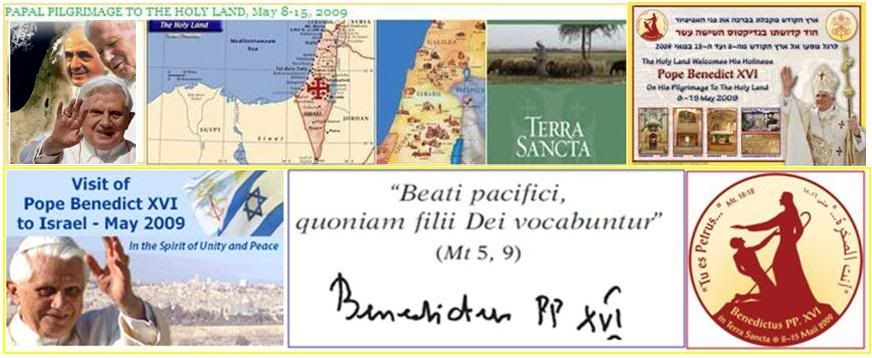 Cindy Wooden has a very commendable enterprise story that more of the Vaticanistas should have done.
Visit to Israel: Leaders know
Cindy Wooden has a very commendable enterprise story that more of the Vaticanistas should have done.
Visit to Israel: Leaders know
and appreciate Pope's teaching on Judaism
By Cindy Wooden

VATICAN CITY, May 8 (CNS) -- As Pope Benedict XVI prepared to visit Israel in early May, Jewish leaders involved in dialogue appeared to be hopeful and not particularly wary about what the Pope would say.
On the other hand, many members of the Jewish community and Catholics sensitive to their feelings appeared to be holding their breath, praying that the Pope would not inadvertently offend his hosts.
The difference stems from the fact that Jewish leaders know Pope Benedict's teaching about Jews and Judaism from his theological speeches and articles. [Some Jewish leaders do - the Italian rabbis, for instance, seem to ignore everything Ratzinger-benedict XVI has ever said about Judaism and anti-Semitism and want him to start from scratch every time, They're the ones who Is aid would never be satisfied until the Pope has 'I am not anti-Semitic' or 'I love the Jews' visibly stitched on his garments so no one cam miss the message!]
Speaking in Rome in March, Rabbi Michael Schudrich, the U.S.-born chief rabbi of Poland, said the Holy Land trip can be "very enlightening and help Pope Benedict show in a very clear way" the sensitivity and respect that has been clear in his writings for decades.
In evaluating the Pope's work, Jewish leaders appreciate several facts:
- Pope Benedict explicitly recognizes that God chose the Jewish people as his own and established a special bond with them;
- He recognizes that for centuries Christians used Jesus's death as an excuse to denigrate -- and even persecute -- the Jews; and
- He understands that the contempt some Christians had for the Jews created an atmosphere that the Nazis easily and progressively manipulated to the point of killing 6 million Jews.
But theological work does not grab the headlines the way gestures do and a Vatican explanation of a papal misstep may limit the damage, but it is hard to eliminate all suspicion.
Those who are worried can't seem to shake their puzzlement over the fact that in January the Pope lifted the excommunication of a bishop who minimized the Holocaust.
The Vatican later made it clear that Bishop Richard Williamson, a member of the Society of St. Pius X, who had denied the extent of the Holocaust, must publicly recant his views if he wants to function as a bishop in the Catholic Church.
Writing to the world's bishops in March, Pope Benedict said he was saddened that people seemed to jump to the conclusion that he was stepping back from efforts to promote reconciliation between Catholics and Jews and was rejecting the teaching of the Second Vatican Council.
"Precisely for this reason I thank all the more our Jewish friends, who quickly helped to clear up the misunderstanding and to restore the atmosphere of friendship and trust," the Pope wrote after emphasizing the horror of the Holocaust and the importance of remembering it.
The papal apology was effective with the Church's Jewish dialogue partners because they were able to put the issue into the perspective of what they knew about the German-born pope's thinking, especially from what he had published as Cardinal Joseph Ratzinger.
The day the Vatican released the Pope's apologetic letter, Pope Benedict met with a delegation from the Chief Rabbinate of Israel.
Rabbi Shear-Yashuv Cohen, chief rabbi of Haifa, told the Pope, "We thank the Holy See for making this renewal (of dialogue) possible by the clear and unequivocal statements deploring the Holocaust denial and making it very clear that the Catholic Church leaders are committed" to continue working for improved relations with the Jews.
In his remarks to the rabbis, the Pope reaffirmed in summary form his understanding of the teachings of the Second Vatican Council that make respect, dialogue and reconciliation between Catholics and Jews possible.
"The church recognizes that the beginnings of her faith are found in the historical divine intervention in the life of the Jewish people and that here our unique relationship has its foundation," he said.
"The Jewish people, who were chosen as the elected people, communicate to the whole human family knowledge of and fidelity to the one, unique and true God," the Pope said.
The teachings are the same as those meticulously spelled out by then-Cardinal Ratzinger during a speech to a major international Catholic-Jewish conference in Jerusalem in 1994.
The speech -- widely republished and included in Cardinal Ratzinger's book, Many Religions, One Covenant -- is such a clear synthesis of his thinking about Jews and Judaism that Jesuit Father Federico Lombardi, Vatican spokesman, included the full text in background materials for Vatican Radio reporters covering the trip.
The future pope began with an acknowledgment: "The history of the relationship between Israel and Christendom is drenched with blood and tears. It is a history of mistrust and hostility, but also -- praise be to God -- a history marked again and again by attempts at forgiveness, understanding and mutual acceptance."
The Holocaust, he said, was not simply a horror to be remembered, but it is a demand on humanity -- especially on believers in the one God -- to engage in a mission of reconciliation and mutual acceptance.
But respect for the Jewish people and their ongoing special relationship with God does not and cannot mean that the pope will not speak about the gift of salvation in Jesus Christ as he visits the land of the savior's birth, life, death and resurrection.
The Pope is well aware, however, that for centuries Christians blamed the Jews, rather than human sinfulness, for Jesus's death and that attitude was at the root of the so-called "teaching of contempt."
It was a central topic in Cardinal Ratzinger's 1994 speech.
Even as a child growing up in Germany, he told his audience, "I could not understand how some people wanted to derive a condemnation of Jews from the death of Jesus because the following thought had penetrated my soul as something profoundly consoling: Jesus' blood raises no calls for retaliation, but calls all to reconciliation."
In the Bible, he said, "there are not two effects of the cross -- a damning one and a saving one -- but only a single effect, which is saving and reconciling."
[The full text of that 1994 address was posted early on in the NEWS ABOUT BENEDICT thread of the PRF and re-posted on this PILGRIMAGE thread, as well.]
 Wooden has another enterprise story. CNS did well to assign both of its Vatican reporters to ocover this trip in addition to their local correspondents.
British knights hope papal trip
Wooden has another enterprise story. CNS did well to assign both of its Vatican reporters to ocover this trip in addition to their local correspondents.
British knights hope papal trip
will contribute to peace in Holy Land
By Cindy Wooden

AMMAN, Jordan, May 9 (CNS) -- In the crowds that welcomed Pope Benedict XVI to Jordan and followed him to Catholic schools and churches were several dozen people who have taken an oath to pray for and financially support the Catholic Church in the Holy Land.
Four dozen members of the Equestrian Order of the Holy Sepulcher of Jerusalem were finishing a visit to the Holy Land when Pope Benedict arrived May 8.
In addition to funding schools, parishes, seminaries, hospitals and other projects of the church in the region, members of the order also helped the Vatican and the Latin Patriarchate of Jerusalem cover the costs of the papal visit.
Michael Whelan, the order's lieutenant for England and Wales, said, "The work of the order is to help the Christians in the Holy Land.
"It would help most if, out of the Pope's visit, there came a new effort for a just and peaceful solution of the Palestinian situation so that Christians and Muslims could have the peace and freedom they need to live and to continue the peaceful coexistence that marked their relations for centuries," Whelan said.
"Christians, Muslims and Jews need to recognize each other's faith, each other's differences, but also their common links to the Holy Land," he said.
"At heart, they are all people with families, with cares, with aspirations and hopes for peace," he said.
Bernard Waddingham, treasurer of the British lieutenancy, said the order has made a special commitment to support the schools run by the Latin patriarchate in Jordan, Israel and the Palestinian territories.
The knights of England and Wales send pilgrimages to the Holy Land every six months, visiting the schools and other projects and personally handing over checks.
"We go around giving money -- I have a holy checkbook," Waddingham said.
Members of the group were among the people inside the Church of the Good Shepherd at the Regina Pacis center May 8 and planned to be at the May 10 Mass.
Margaret Waddingham, the treasurer's wife, said she was grateful to be at Good Shepherd with some of the Jordanians they have gotten to know through their work with the order.
"It was extraordinary seeing the faith and hope, especially of the young people, and their joy makes me want to help everyone," she said.
[Modificato da TERESA BENEDETTA 10/05/2009 00:31] |
| |
 10/05/2009 01:50 10/05/2009 01:50 |
|
| | | OFFLINE | | Post: 17.405
Post: 123 | Registrato il: 28/08/2005
Registrato il: 20/01/2009 | Administratore | Utente Junior | |
|
 DAY 2- VESPERS AT ST-GEORGES
DAY 2- VESPERS AT ST-GEORGES
GREEK MELKITE CATEHDRAL
Coming and going, the Holy Father was besieged by the nuns and other religious who were invited to celebrate Vespers with him. outside the Church, an Iraqi family displayed their flag on their street window.
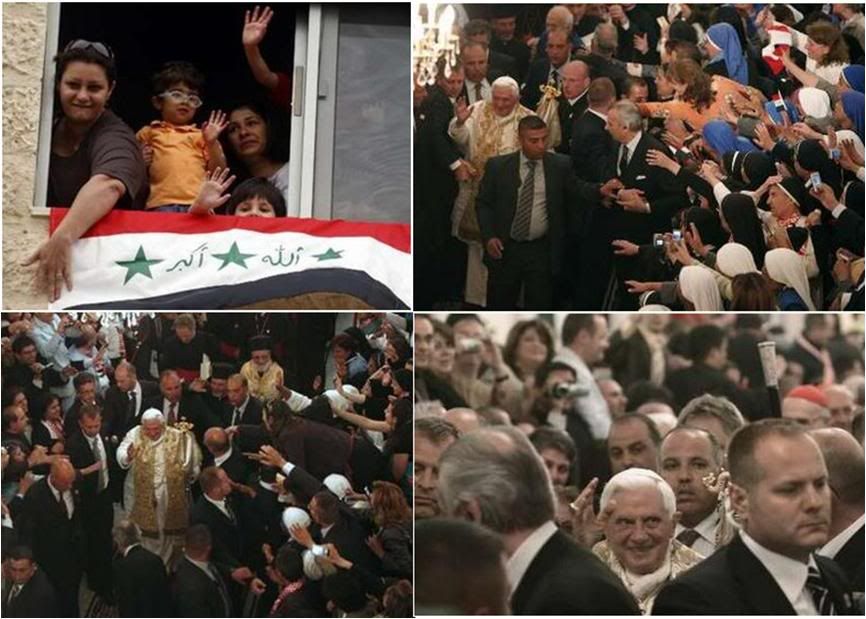
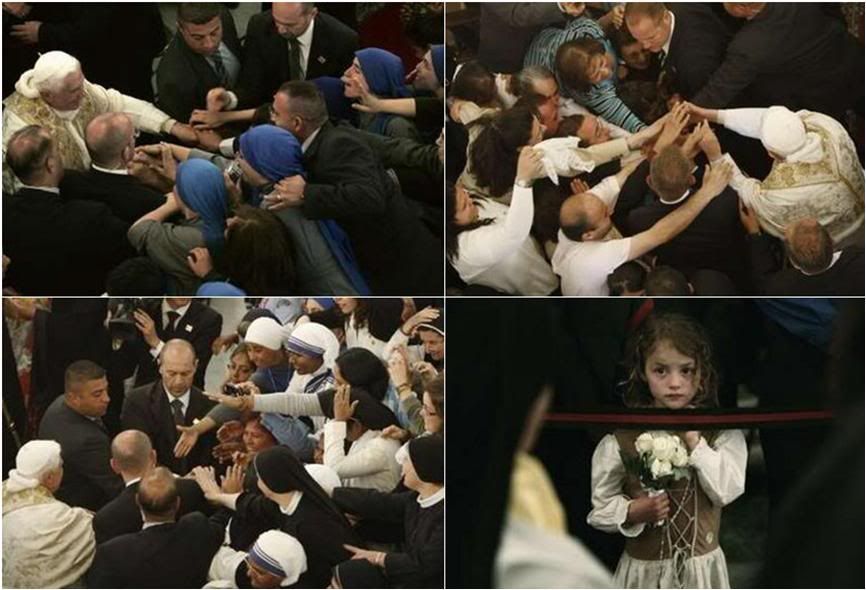
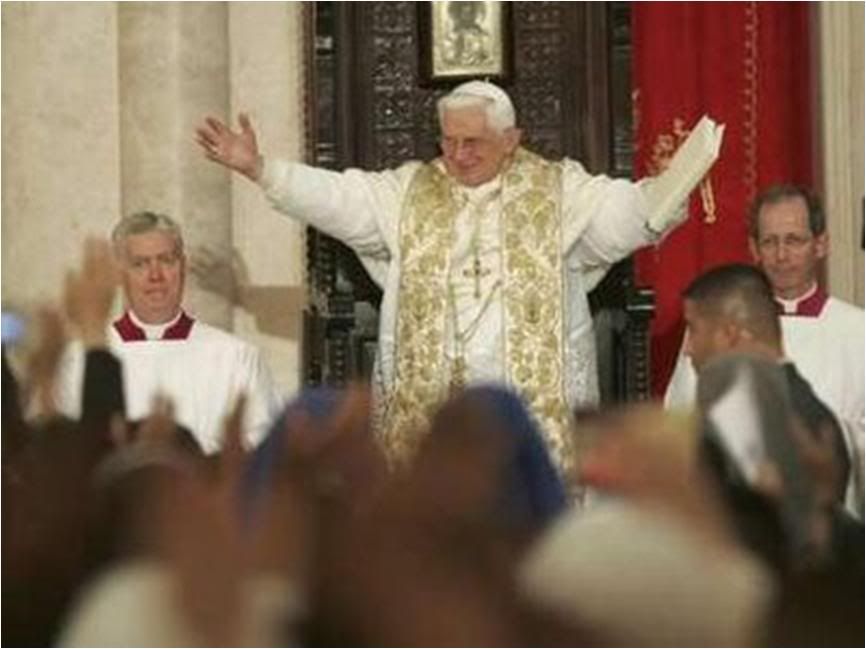 Pope encourages Oriental-rite
Pope encourages Oriental-rite
Christians to be firm in the faith
Amman, Jordan, May 9, 2009 (CNA)- Shouts of “Viva el Papa” and “Benedicto” rung out in the Greek Melkite Cathedral of St. George in Amman as Pope Benedict XVI celebrated Vespers on Saturday evening. He challenged Eastern Catholics to continue resolutely testifying to the faith.
The 90-minute celebration involved a procession with the Gospel, signing in Arabic by a 50 member choir, Pope Benedict receiving an icon of Sts. Peter and Paul, and a speech by the Holy Father.
In his speech, Pope Benedict encouraged the Church in the Middle East to persist in giving witness to the saving power of Jesus, despite the hardships they endure in several countries.
The presence of Iraqi Christians, who had fled persecution in their home countries, was evidenced by the Iraqi who waved their flags to greet the Pope.
The Holy Father reminded those gathered in St. George's Cathedral that, “All Christians are called to respond actively to the Lord’s mandate – as Saint George did in dramatic ways according to popular record – to bring others to know and love him.
“In fact the vicissitudes of history have strengthened the members of particular Churches to embrace this task with vigor and to engage resolutely with the pastoral realities of today,” he said.
As Pope Benedict exited the cathedral, the faithful swarmed to the center isle, once again wishing him a long life and chanting his name in Italian.
On Sunday, the Pope will celebrate Mass in Amman's International Stadium for tens of thousands people. Later in the day, the Pontiff will visit the site where Jesus was baptized in the Jordan by John the Baptist.
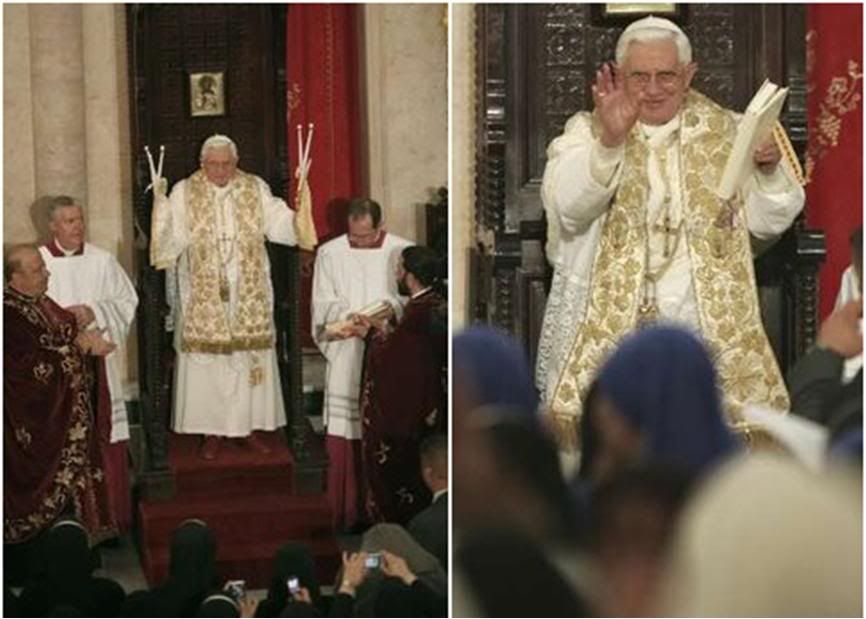
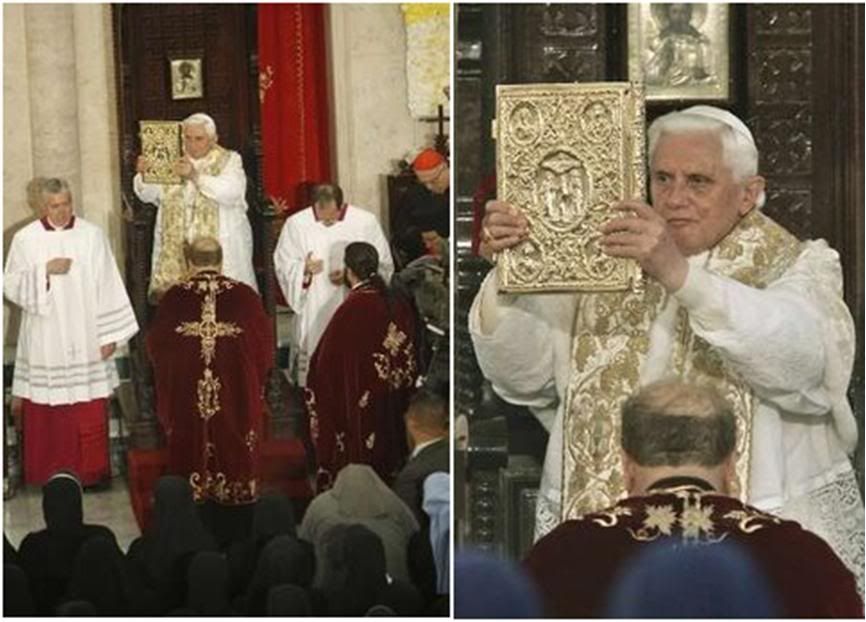
THE HOLY FATHER'S VESPERS HOMILY
Dear Brothers and Sisters,
It is a great joy for me to celebrate Vespers with you this evening in the Greek-Melkite Cathedral of Saint George.
I warmly greet His Beatitude Gregorios III Laham, the Greek Melkite Patriarch, who has joined us from Damascus; Emeritus Archbishop Georges El-Murr; and His Excellency Yaser Ayyach, Archbishop of Petra and Philadelphia, whom I thank for his kind words of welcome which I gladly reciprocate with sentiments of respect.
I also greet the leaders of the other Catholic Churches present in the East – Maronite, Syrian, Armenian, Chaldean and Latin – as well as Archbishop Benediktos Tsikoras of the Greek Orthodox Church.
To all of you and to the priests, Sisters and Brothers, seminarians and lay faithful gathered here this evening I express my sincere thanks for giving me this opportunity to pray with you and to experience something of the richness of our liturgical traditions.
The Church herself is a pilgrim people and thus, through the centuries, has been marked by determinant historical events and pervading cultural epochs.
Sadly, some of these have included times of theological dispute or periods of repression. Others, however, have been moments of reconciliation – marvellously strengthening the communion of the Church – and times of rich cultural revival, to which Eastern Christians have contributed so greatly.
Particular Churches within the universal Church attest to the dynamism of her earthly journey and manifest to all members of the faithful a treasure of spiritual, liturgical, and ecclesiastical traditions which point to God’s universal goodness and his will, seen
throughout history, to draw all into his divine life.
The ancient living treasure of the traditions of the Eastern Churches enriches the universal Church and could never be understood simply as objects to be passively preserved.
All Christians are called to respond actively to the Lord’s mandate – as Saint George did in dramatic ways according to popular record – to bring others to know and love him.
In fact the vicissitudes of history have strengthened the members of particular Churches to embrace this task with vigor and to engage resolutely with the pastoral realities of today.
Most of you trace ancient links to the Patriarchate of Antioch, and your communities are thus rooted here in the Near East. And, just as two thousand years ago it was in Antioch that the disciples were first called Christians, so also today, as small minorities in scattered communities across these lands, you too are recognized as followers of the Lord.
The public face of your Christian faith is certainly not restricted to the spiritual solicitude you bear for one another and your people, essential though that is. Rather, your many works of universal charity extend to all Jordanians – Muslims and those of other religions – and also to the large numbers of refugees whom this Kingdom so generously welcomes.
Dear brothers and sisters, the first Psalm (103) we prayed this evening presents us with glorious images of God the bountiful Creator, actively present in his creation, providing life with abundant goodness and wise order, ever ready to renew the face of the earth!
The Epistle reading we have just heard, however, paints a different picture. It warns us, not in a threatening way, but realistically, of the need to stay alert, to be aware of the forces of evil at work creating darkness in our world (cf. Eph 6:10-20).
Some might be tempted to think this a contradiction; yet reflecting on our ordinary human experience we recognize spiritual struggle, we acknowledge the daily need to move into Christ’s light, to choose life, to seek truth.
Indeed, this rhythm – turning away from evil and girding ourselves with the Lord’s strength – is what we celebrate at every Baptism, the gateway to Christian life, the first step along the way of the Lord’s disciples.
Recalling Christ’s baptism by John in the waters of the Jordan, the assembled pray that the one to be baptized will be rescued from the kingdom of darkness and brought into the splendour of God’s kingdom of light, and so receive the gift of new life.
This dynamic movement from death to newness of life, from darkness to light, from despair to hope, that we experience so dramatically during the Triduum, and is celebrated with great joy in the season of Easter, ensures that the Church herself remains young.
She is alive because Christ is alive, truly risen. Vivified by the presence of the Spirit, she reaches out every day, drawing men and women to the living Lord.
Dear Bishops, priests, Brothers and Sisters, dear lay faithful, our respective roles of service and mission within the Church are the tireless response of a pilgrim people.
Your liturgies, ecclesiastical discipline and spiritual heritage are a living witness to your unfolding tradition. You amplify the echo of the first Gospel proclamation, you render fresh the ancient memories of the works of the Lord, you make present his saving graces and you diffuse anew the first glimmers of the Easter light and the flickering flames of Pentecost.
In this way, imitating Christ and the Old Testament patriarchs and prophets, we set out to lead people from the desert towards the place of life, towards the Lord who gives us life in abundance.
This marks all your apostolic works, the variety and calibre of which are greatly appreciated. From kindergartens to places of higher education, from orphanages to homes for the elderly, from work with refugees to a music academy, medical clinics and hospitals, interreligious dialogue and cultural initiatives, your presence in this society is a marvellous sign of the hope that defines us as Christian.
That hope reaches far beyond the confines of our own Christian communities. So often you find that the families of other religions, with whom you work and offer your service of universal charity, hold concerns and worries that cross religious and cultural boundaries.
This is especially noticeable in regard to the hopes and aspirations of parents for their children. What parent or person of good will could not be troubled by the negative influences so pervasive in our globalized world, including the destructive elements within the entertainment industry which so callously exploit the innocence and sensibility of the vulnerable and the young?
Yet, with your eyes firmly fixed on Christ, the light who dispels all evil, restores lost innocence, and humbles earthly pride, you will sustain a magnificent vision of hope for all those you meet and serve.
May I conclude with a special word of encouragement to those present who are in formation for the priesthood and religious life. Guided by the light of the Risen Lord, inflamed with his hope, and vested with his truth and love, your witness will bring abundant blessings to those whom you meet along the way.
Indeed the same holds for all young Christian Jordanians: do not be afraid to make your own wise, measured and respectful contribution to the public life of the Kingdom. The authentic voice of faith will always bring integrity, justice, compassion and peace!
Dear friends, with sentiments of great respect for all of you gathered with me this evening in worship, I again thank you for your prayers for my ministry as the Successor of Peter and I assure you and all those entrusted to your pastoral care of a remembrance in my own daily prayer.
Too bad none of the newsphotos so far show the presentation of a special pastoral staff to the Pope and an icon of Saints Peter and Paul. The Vespers celebration according to the Greek Melkite rite was compelling with most of the liturgy sung in a different musical idiom from that of the Roman rite.
The liturgy was also rich with references to the Resurrection, and there was an unusual portion in which the priests renewed their vows of celibacy in view of the World Day of Vocations observed in Jordan on May 10. The Pope led the Consecration Prayer, which was followed by a Song for St. Benedict!.
[Modificato da TERESA BENEDETTA 10/05/2009 16:53] |
| |
 10/05/2009 02:17 10/05/2009 02:17 |
|
| | | OFFLINE | | Post: 17.406
Post: 124 | Registrato il: 28/08/2005
Registrato il: 20/01/2009 | Administratore | Utente Junior | |
|

 Will the Papal visit
Will the Papal visit
be tourism's deliverance?
By Irit Rosenblum

Sunday, May 10, 2009
Pope Benedict XVI arrives in Israel tomorrow, and the Tourism Ministry is hoping he will bring in tidings of tourist dollars.
When his predecessor, Pope John Paul II, paid a visit in 2000, the ministry predicted it would bring 500,000 Christian pilgrims to Israel that year. By that September the actual number was 750,000. The target this time around is for 25% more tourists in 2009 than in 2008.
In 2000 the Pope was accompanied by 47,000 pilgrims. Only about 10,000 are expected to arrive with Pope Benedict, although in the past few days there have been indications that this number could reach 15,000, including people entering via Egypt and Jordan.
Despite the popular image of pilgrims as thrifty, budget tourists, pilgrim tourism makes a significant contribution to the economy: Each pilgrim spends an average of $1,500 per visit. At that rate, the 15,000 pilgrims now anticipated would funnel about $22.5 million into the economy this week alone.
Genesis Tours, which makes the travel arrangements for most pilgrims to Israel, is placing most of them in kibbutzim in the Galilee and hotels around Nazareth and Lake Kinneret.
"For a full week, thousands of pilgrims from Europe and South America will be visiting the sites in the Galilee, bringing welcome activity to local businesses in this slow season," said Kurt Kaufman, the general manager of Genesis Tours.
The rest of the country will see fewer financial rewards from this week's pilgrims. The amphitheater at Mount of the Precipice in Nazareth, where the Pope is to celebrate mass on Thursday, is being expanded to accommodate 40,000 people and will continue to be used as a concert venue in the future.
The Garden of Gethsemane in Jerusalem, where the Pope will celebrate Mass on Tuesday, was renovated in coordination with the Franciscan monastery there. The stage will be removed after the Mass, but future tourists and pilgrims will benefit from the improvements to the site.
The Tourism Ministry spent NIS 3 million on infrastructure work for the Upper Room on Mt. Zion, site of the Last Supper. Pope Benedict is not scheduled to visit the baptism site Al-Qasr al-Yehud, near Jericho, but it has been improved for the benefit of future pilgrims.
About 300 journalists from around the world are covering the Pope's visit to the region. By way of comparison, when U.S. President George W. Bush came to Israel, only 100 reporters were with him.
The Jerusalem municipality, the Foreign Ministry and the Tourism Ministry will have a press center at city hall to assist foreign and local journalists during the four-day visit. It will be Israel's largest and best-appointed such center.
In addition, the balcony of the municipality building will be converted for use as a live broadcast site, overlooking the Jerusalem skyline. The building will also serve as the departure point for journalists and camera crews.
The press center will offer hundreds of Internet access stations, a few quiet areas for face-to-face interviews, and live TV signals and radio feed of press pool coverage. There will be a second, smaller press center at Nazareth's Golden Crown Hotel, near the Mount of the Precipice.
The Tourism Ministry will distribute information to journalists aimed at boosting Israel's image as well as incoming tourism. Among other things, it will stress that Israel provides full freedom of worship and full access to holy sites, develops and maintains these sites, and supports mutual understanding, and that Jerusalem offers a combination of ancient holy sites with a modern urban infrastructure. It will also emphasize the increasingly close relationship between Israel and the Vatican.
The ministry will also explain that pilgrims can take advantage of other attractions in Israel, such as spa treatments at the Dead Sea and nature walking trails.
The ministry intends to use documentary material from the Pope's visit in future tourism campaigns targeting countries with large Catholic populations.
[Modificato da TERESA BENEDETTA 10/05/2009 02:17] |
| |
 10/05/2009 13:19 10/05/2009 13:19 |
|
| | | OFFLINE | | Post: 17.407
Post: 125 | Registrato il: 28/08/2005
Registrato il: 20/01/2009 | Administratore | Utente Junior | |
|
[Modificato da TERESA BENEDETTA 10/05/2009 13:21] |
| |
 10/05/2009 13:20 10/05/2009 13:20 |
|
| | | OFFLINE | | Post: 17.408
Post: 126 | Registrato il: 28/08/2005
Registrato il: 20/01/2009 | Administratore | Utente Junior | |
|
|
| |
 10/05/2009 13:57 10/05/2009 13:57 |
|
| | | OFFLINE | | Post: 17.409
Post: 127 | Registrato il: 28/08/2005
Registrato il: 20/01/2009 | Administratore | Utente Junior | |
|
 DAY 3 - MASS IN AMMAN
DAY 3 - MASS IN AMMAN
International Stadium
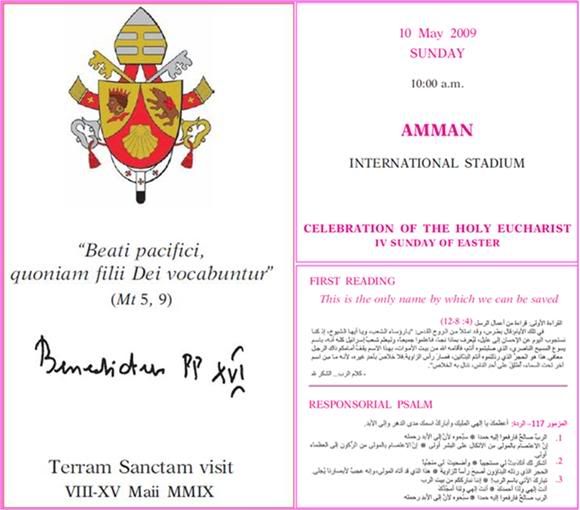 Some establishing shots first. Too many pics to process quickly...
Some establishing shots first. Too many pics to process quickly...
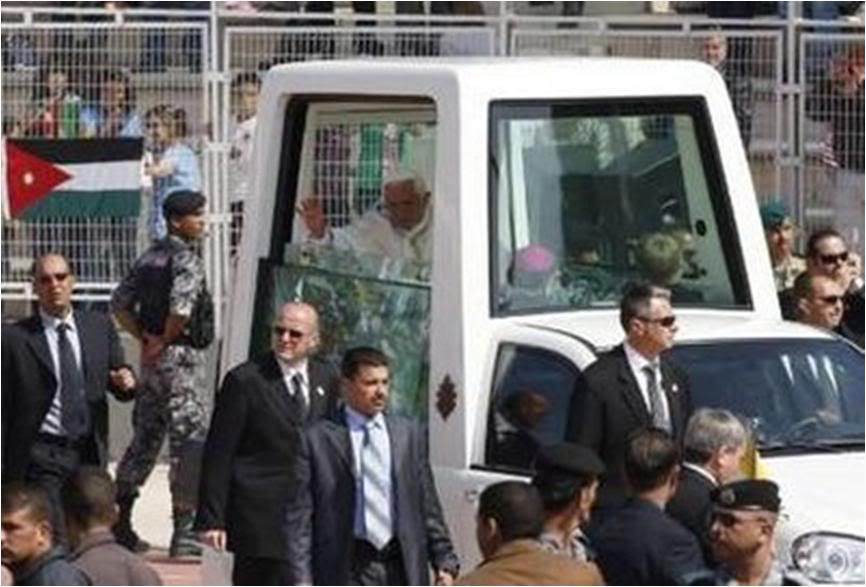
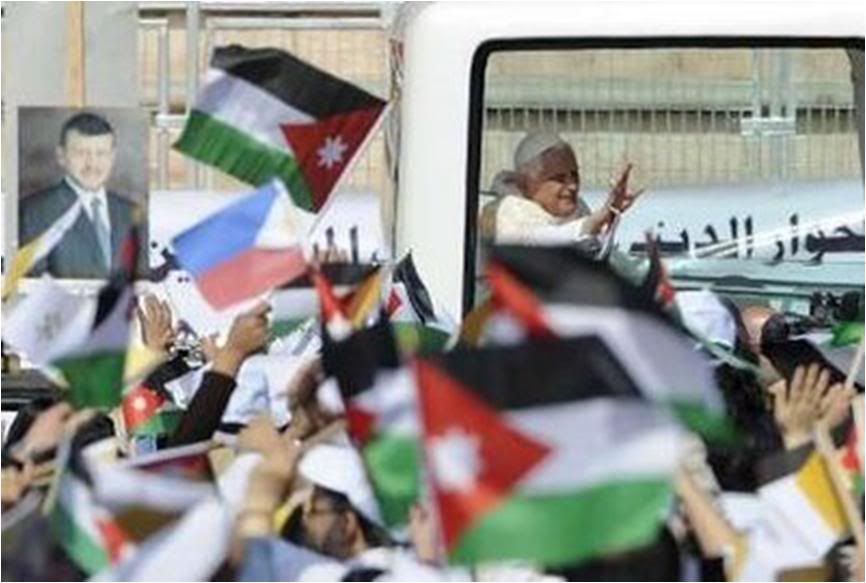 Pope holds public mass
Pope holds public mass
on final day of Jordan tour


AMMAN, May 10 (AFP) — Tens of thousands of Jordanians greeted Pope Benedict XVI as he prepared to say Mass at an open-air football stadium in Amman on Sunday, on the final day of his Holy Land trip to Jordan.
He entered the stadium in his bullet-proof glass-topped popemobile and circled the field once as thousands of people greeted him, singing in Arabic "Yes to love, yes to peace."
Many people held up Jordanian and Vatican flags, while others waved white ribbons in a sign of peace.
The Pope will later visit Bethany on the east bank of the River Jordan where Christians believe Jesus was baptised before travelling on to Israel on Monday as he follows his Holy Land pilgrimage in the footsteps of Jesus Christ.
Refaat Badr, spokesman for the Catholic Church in Jordan, said 70,000 people were invited to attend the mass, and the Jordanian government has issued a decree allowing Christians to take leave to attend papal functions.
On Saturday, the 82-year-old Pontiff urged inter-faith reconciliation but disappointed Muslim clerics [How many clerics? All of them, as the statement implies? Or the few whom the reportere sought out?] by failing to offer a new apology for remarks seen as targeting Islam.
In a keynote address to Muslim leaders in Amman's huge Al-Hussein Mosque, he bemoaned the "ideological manipulation of religion" and urged Muslims and Christians to unite as "worshippers of God."
"Certainly, the contradiction of tensions and divisions between the followers of different religious traditions, sadly, cannot be denied," the leader of the world's 1.1 billion Catholics told his audience.
"However, is it not also the case that often it is the ideological manipulation of religion, sometimes for political ends, that is the real catalyst for tension and division, and at times even violence in society?"
Some clerics [There you are!] were disappointed that his wide-ranging speech made no new apology for a 2006 address in which he quoted a medieval Christian emperor who criticised some teachings of the Prophet Mohammed as "evil and inhuman."
The Pontiff apologised at the time for the "unfortunate misunderstanding."
Some Muslim leaders wanted him to go further. "We wanted him to clearly apologise," Sheikh Yusef Abu Hussein, mufti of the southern city of Karak.
But Prince Ghazi bin Mohammed, King Abdullah II's advisor on religious affairs who hosted the Pontiff during his mosque visit, was more conciliatory.
"I would like to thank you for expressing regret over the lecture in 2006, which hurt the feelings of Muslims," said Ghazi, whose country has a Christian minority of about 200,000 out of a six-million population.
Pope Benedict did not remove his shoes at the mosque, as is customary in Muslim shrines, but a spokesman insisted he had not been asked to do so as he used a special walkway.
[There was nothing to insist on. The hosts of the ultra-modern mosque know how to provide for non-Muslim guests. Prince Ghazi and the other Jordanians who took the Pope and his party around were all wearing their shoes too!
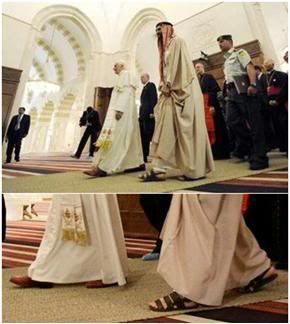
To omit mentioning this - and that the Pope was about to take his shoes off when his host told him it wasn't necessary - gives the wrong impression.]
On his arrival in Amman on Friday at the start of his eight-day tour, Benedict underlined his "deep respect" for Islam.
Pressing the theme of reconciliation during a visit on Saturday to Mount Nebo, where Biblical tradition says God showed Moses the Promised Land, Benedict urged Christians and Jews to bridge their divides.
"The ancient tradition of pilgrimage to the holy places also reminds us of the inseparable bond between the Church and the Jewish people," Benedict said.
In his speech at the Amman mosque, Benedict urged the world to make every effort to protect the beleaguered Christian minority in war-battered Iraq.
On Monday, the Pope will flying to Israel where he is also expected again to focus on building bridges between the faiths.
Israel and the Vatican have clashed in recent months over the papal decision to lift the excommunication of a Holocaust-denying bishop, Richard Williamson of Britain, and over moves to beatify Pope Pius XII.
The Jewish state reviles Pius for what it perceives as his passive stance during the Holocaust in World War II.
But Israel will also roll out the red carpet as it seeks to rebuild its image following its war on Gaza earlier this year that killed more than 1,400 Palestinians and 13 Israelis.
The Pope will also visit Bethlehem, the birthplace of Jesus, in the Israeli-occupied West Bank, and Yad Vashem, the Jerusalem memorial to the six million Jews killed in the Holocaust.
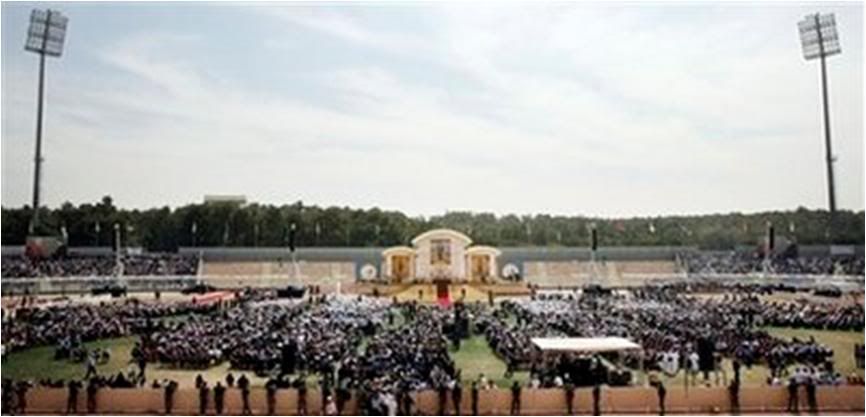
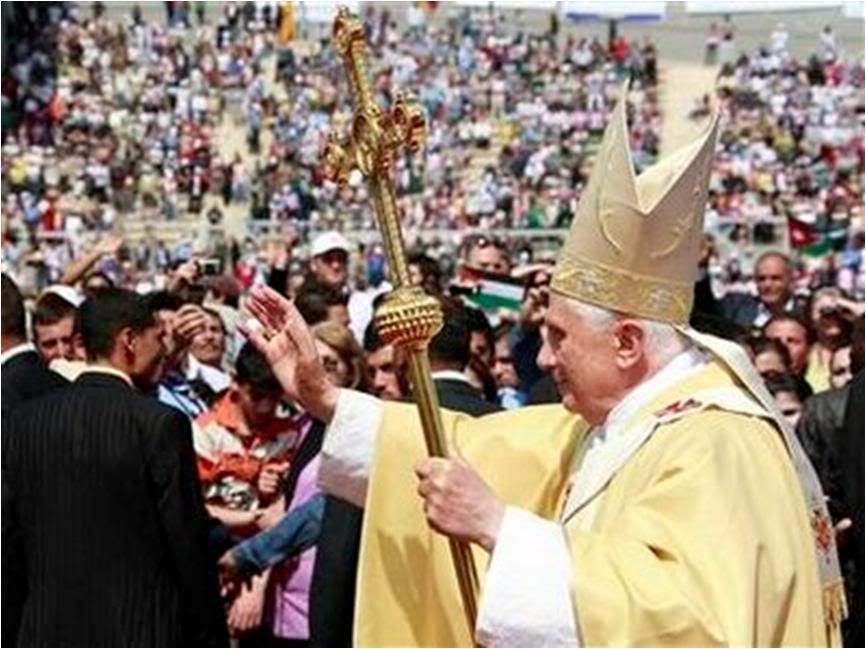 Pope Benedict XVI urges
Pope Benedict XVI urges
Christians to persevere

May 10, 2009
AMMAN, JORDAN - Pope Benedict XVI on Sunday urged Middle East Christians to persevere in their faith despite hardships threatening the existence of their ancient communities.
An estimated 20,000 people filled a Jordanian sports stadium as Benedict celebrated the first open-air Mass of his Middle East pilgrimage.
[ Le Monde reports 50,000 - " The stadium seats 34,000, and Jordanian officials said they added 14,000 more chairs on the field to accommodate all pilgrims, many coming from Lebabon, Syira and Iraq." Will translate full Le Monde article later.]
"The Catholic community here is deeply touched by the difficulties and uncertainties which affect the people of the Middle East," Benedict said, speaking in English, at the Amman stadium.
"May you never forget the great dignity which derives from your Christian heritage, or fail to sense the loving solidarity of all your brothers and sisters in the church throughout the world," he said.
Catholics from across the Middle East are attending the service. Many held up flags from Lebanon, Syria, Iraq and other countries. They applauded the pope's words and shouted out his name.
The Mass was on the third day of Benedict's weeklong pilgrimage to Jordan, Israel and the Palestinian territories. The Pope was welcomed the stadium in Arabic by the Latin rite patriarch of Jerusalem, Archbishop Fouad Twal, who recalled that Jordan has taken in more than 1 million Iraqi refugees since the start of the war, some 40,000 of them Christians.
For years, the Church has been alarmed by the declining presence of Christians in the Holy Land and throughout the Middle East, driven out by war and economic hardship.
In his homily Sunday, Benedict urged that the "material and moral assistance" Christians need will never be lacking.
He also paid tribute to Christian women in the region, saying many have "devoted their lives to building peace and fostering harmony."
Father Raymond Mousalli, an Iraqi priest, said there are about 20,000 Iraqi Christians in Jordan, and Iraqis of all faiths must sit together and find peace after years of war.
"The Holy Father speaks here, and his voice is heard in the Middle East especially by Iraqi Christians who are suffering a lot," Mousalli said.
Peter Samaan, 15-year-old Iraqi dressed in a white communion robe, said he hoped Benedict could one day travel to Iraq.
"We Christians want to return. We are strangers in this country." Samaan said, adding that his family fled Iraq to avoid persecution.
In the afternoon, Benedict was scheduled to travel some 30 miles (50 kilometers) from Amman to Bethany beyond the Jordan river, the site of Christ's baptism. He will also bless the foundation stones of Latin and Greek Melkite churches.
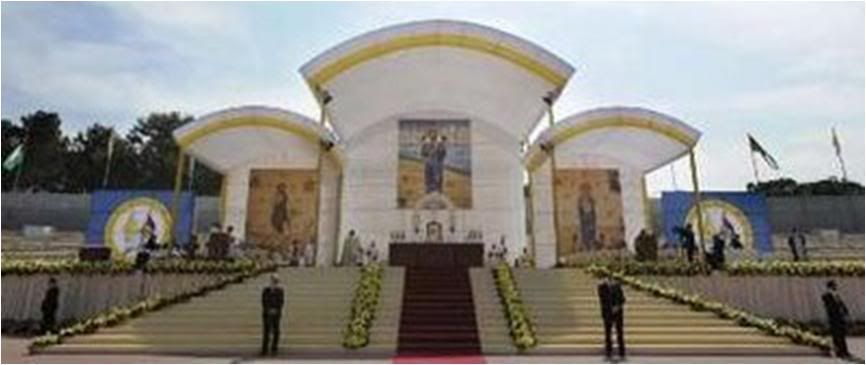
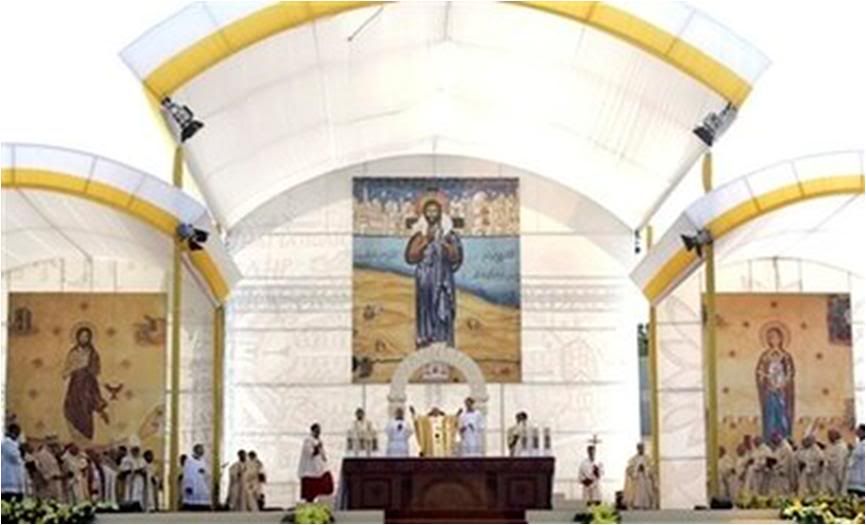
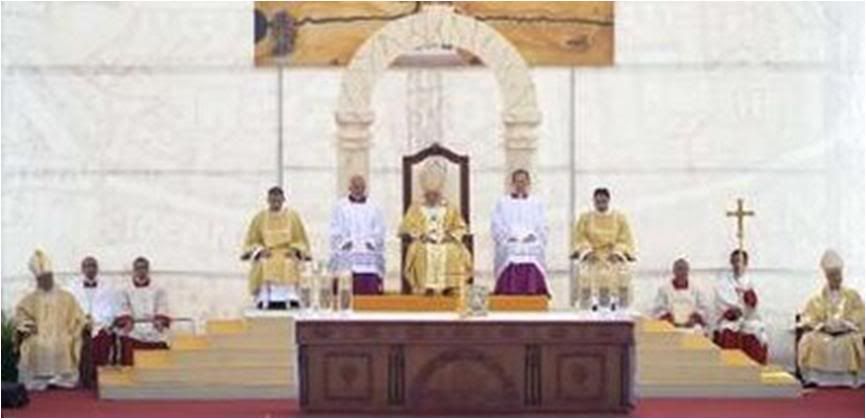
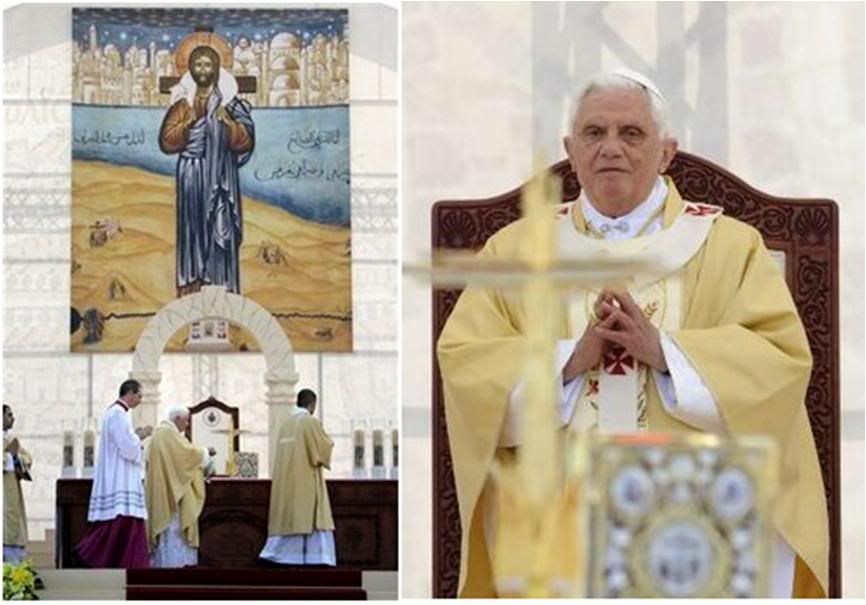
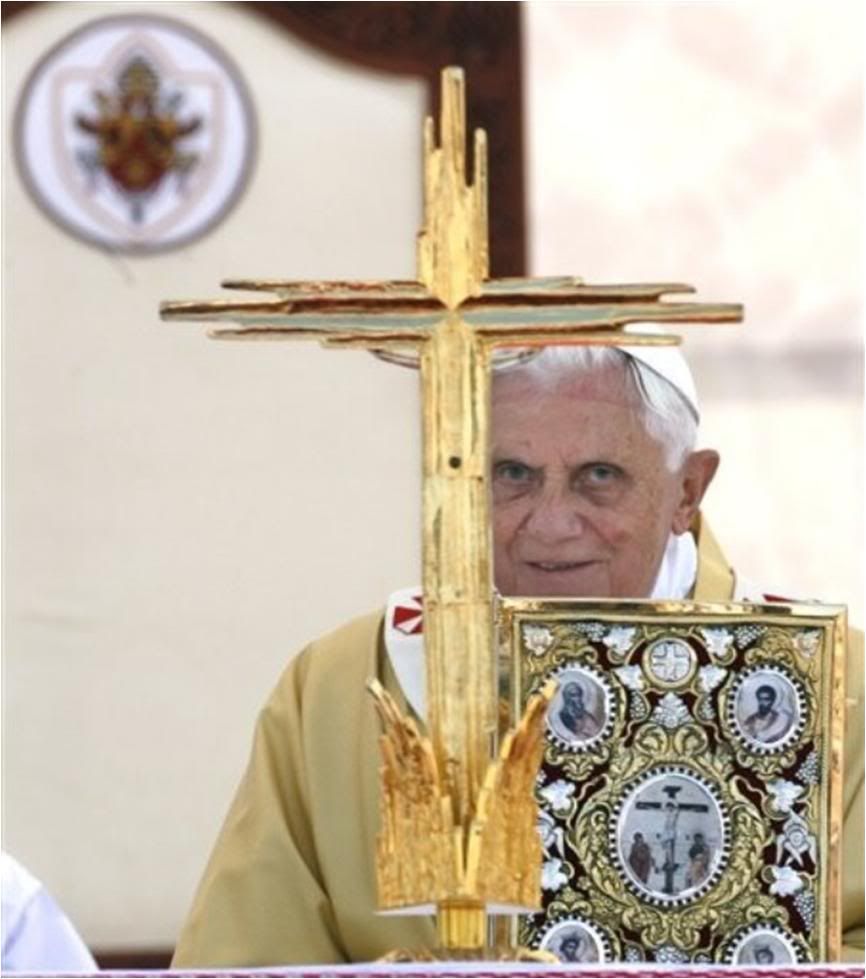
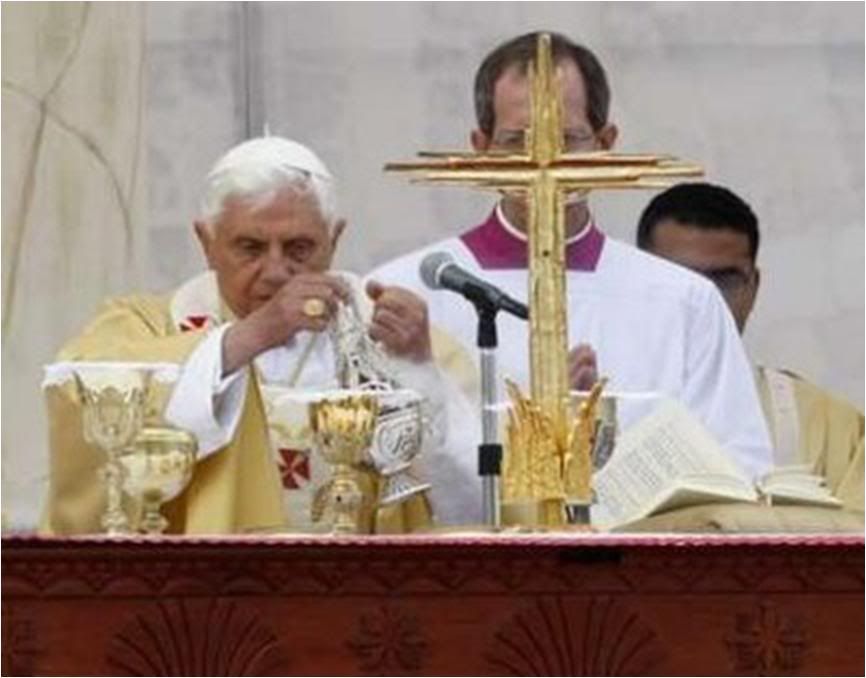
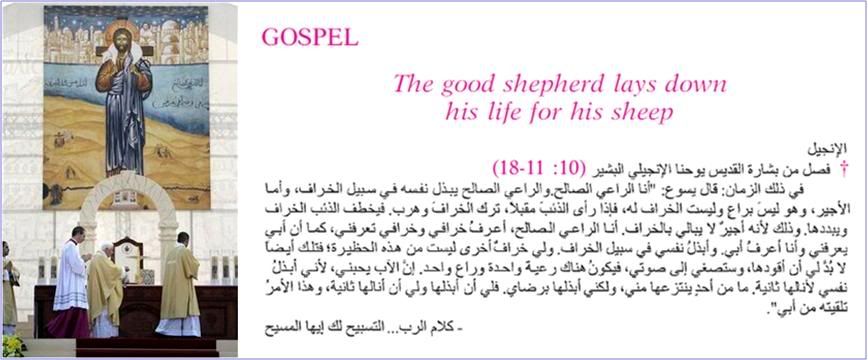
THE HOLY FATHER'S HOMILY
Dear Brothers and Sisters in Christ,
I rejoice that we are able to celebrate this Eucharist together at the beginning of my Pilgrimage to the Holy Land.
Yesterday, from the heights of Mount Nebo, I stood and looked out upon this great land, the land of Moses, Elijah, and John the Baptist, the land where God’s ancient promises were fulfilled in the coming of the Messiah, Jesus our Lord.
This land witnessed his preaching and miracles, his death and resurrection, and the outpouring of the Holy Spirit upon the Church, the sacrament of a reconciled and renewed humanity.
As I pondered the mystery of God’s fidelity, I prayed that the Church in these lands would be confirmed in hope and strengthened in her witness to the Risen Christ, the Savior of mankind.
Truly, as Saint Peter tells us in today’s first reading, “there is no other name under heaven given among men by which we are to be saved” (Acts 4:12).
Today’s joyful celebration of the Eucharistic sacrifice expresses the rich diversity of the Catholic Church in the Holy Land. I greet all of you with affection in the Lord.
I thank His Beatitude Fouad Twal, Latin Patriarch of Jerusalem, for his kind words of welcome. My greeting goes also to the many young people from Catholic schools who today bring their enthusiasm to this Eucharistic celebration.
In the Gospel we have just heard, Jesus proclaims: “I am the good shepherd… who lays down his life for the sheep” (Jn 10:11). As the Successor of Saint Peter, to whom the Lord entrusted the care of his flock (cf. Jn 21:15-17), I have long awaited this opportunity to stand before you as a witness to the Risen Savior, and to encourage you to persevere in faith, hope and love, in fidelity to the ancient traditions and the distinguished history of Christian witness which you trace back to the age of the Apostles.
The Catholic community here is deeply touched by the difficulties and uncertainties which affect all the people of the Middle East. May you never forget the great dignity which derives from your Christian heritage, or fail to sense the loving solidarity of all your brothers and sisters in the Church throughout the world!
“I am the good shepherd”, the Lord tells us, “I know my own, and my own know me” (Jn 10:14). Today in Jordan we celebrate the World Day of Prayer for Vocations. As we reflect on the Gospel of the Good Shepherd, let us ask the Lord to open our hearts and minds ever more fully to hear his call.
Truly, Jesus “knows us”, even more deeply than we know ourselves, and he has a plan for each one of us. We know, too, that wherever he calls us, we will find happiness and fulfilment; indeed, we will find our very selves (cf. Mt 10:39).
Today I invite the many young people here present to consider how the Lord is calling you to follow him and to build up his Church. Whether it be in the priestly ministry, in consecrated life or in the sacrament of marriage, Jesus needs you to make his voice heard and to work for the growth of his Kingdom.
In today’s second reading, Saint John invites us to “think of the love that the Father has lavished on us” by making us his adopted children in Christ. Hearing these words should make us grateful for the experience of the Father’s love which we have had in our families, from the love of our fathers and mothers, our grandparents, our brothers and sisters.
During the celebration of the present Year of the Family, the Church throughout the Holy Land has reflected on the family as a mystery of life-giving love, endowed in God’s plan with its own proper calling and mission: to radiate the divine Love which is the source and the ultimate fulfilment of all the other loves of our lives.
May every Christian family grow in fidelity to its lofty vocation to be a true school of prayer, where children learn a sincere love of God, where they mature in self-discipline and concern for the needs of others, and where, shaped by the wisdom born of faith, they contribute to the building of an ever more just and fraternal society.
The strong Christian families of these lands are a great legacy handed down from earlier generations. May today’s families be faithful to that impressive heritage, and never lack the material and moral assistance they need to carry out their irreplaceable role in service to society.
An important aspect of your reflection during this Year of the Family has been the particular dignity, vocation and mission of women in God’s plan.
How much the Church in these lands owes to the patient, loving and faithful witness of countless Christian mothers, religious Sisters, teachers, doctors and nurses! How much your society owes to all those women who in different and at times courageous ways have devoted their lives to building peace and fostering love!
From the very first pages of the Bible, we see how man and woman, created in the image of God, are meant to complement one another as stewards of God’s gifts and partners in communicating his gift of life, both physical and spiritual, to our world.
Sadly, this God-given dignity and role of women has not always been sufficiently understood and esteemed. The Church, and society as a whole, has come to realize how urgently we need what the late Pope John Paul II called the “prophetic charism” of women (cf. Mulieris Dignitatem, 29) as bearers of love, teachers of mercy and artisans of peace, bringing warmth and humanity to a world that all too often judges the value of a person by the cold criteria of usefulness and profit.
By its public witness of respect for women, and its defence of the innate dignity of every human person, the Church in the Holy Land can make an important contribution to the advancement of a culture of true humanity and the building of the civilization of love.
Dear friends, let us return to the words of Jesus in today’s Gospel. I believe that they contain a special message for you, his faithful flock in these lands where he once dwelt. “The good shepherd”, he tells us, “lays down his life for his sheep.”
At the beginning of this Mass, we asked the Father to “give us new strength from the courage of Christ our shepherd”, who remained steadfast in fidelity to the Father’s will (cf. Opening Prayer, Mass of the Fourth Sunday of Easter).
May the courage of Christ our shepherd inspire and sustain you daily in your efforts to bear witness to the Christian faith and to maintain the Church’s presence in the changing social fabric of these ancient lands.
Fidelity to your Christian roots, fidelity to the Church’s mission in the Holy Land, demands of each of you a particular kind of courage: the courage of conviction, born of personal faith, not mere social convention or family tradition; the courage to engage in dialogue and to work side by side with other Christians in the service of the Gospel and solidarity with the poor, the displaced, and the victims of profound human tragedies; the courage to build new bridges to enable a fruitful encounter of people of different religions and cultures, and thus to enrich the fabric of society. It also means bearing witness to the love which inspires us to “lay down” our lives in the service of others, and thus to counter ways of thinking which justify “taking” innocent lives.
“I am the good shepherd; I know my own, and my own know me” (Jn 10:14). Rejoice that the Lord has made you members of his flock and knows each of you by name!
Follow him with joy and let him guide you in all your ways. Jesus knows what challenges you face, what trials you endure, and the good that you do in his name.
Trust in him, in his enduring love for all the members of his flock, and persevere in your witness to the triumph of his love.
May Saint John the Baptist, the patron of Jordan, and Mary, Virgin and Mother, sustain you by their example and prayers, and lead you to the fullness of joy in the eternal pastures where we will experience for ever the presence of the Good Shepherd and know for ever the depths of his love. Amen.
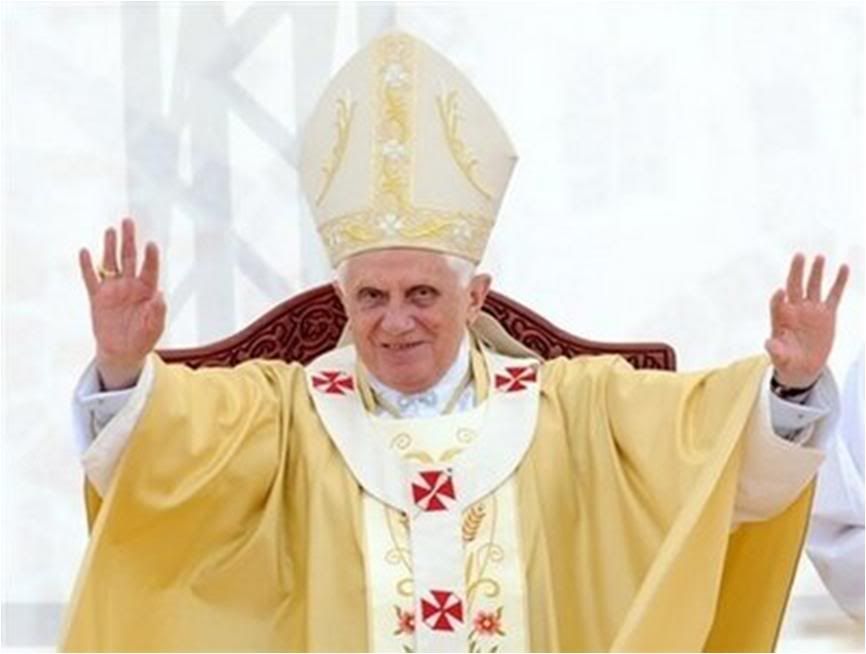
At the end of the Mass, the Holy Father proceeded to the Regina
caeli prayers. The assembly , led by the Holy Father and the choir, sang the antiphons. The Pope read a brief message before the prayer:
MESSAGE AT REGINA CAELI
Dear Friends,
During the Mass I spoke about the prophetic charism of women as bearers of love, teachers of mercy and artisans of peace.
The supreme example of womanly virtue is the Blessed Virgin Mary: the Mother of Mercy and Queen of Peace. As we turn to her now, let us seek her maternal intercession for all the families of these lands, that they may truly be schools of prayer and schools of love.
Let us ask the Mother of the Church to look down in mercy upon all the Christians of these lands, and with the help of her prayers, may they be truly one in the faith they profess and the witness they bear.
Let us ask her who responded so generously to the angel’s call, and accepted her vocation to become the Mother of God, to give courage and strength to all young people today who are discerning their vocations, so that they too may generously dedicate themselves to carrying out the Lord’s will.
In this season of Eastertide, it is with the title Regina Coeli that we call upon the Blessed Virgin. As a fruit of the Redemption won by her Son’s death and resurrection, she too was raised to everlasting glory and crowned Queen of Heaven.
With great confidence in the power of her intercession, with joy in our hearts and with love for our glorious ever-Virgin Mother, we turn to her now and ask for her prayers.
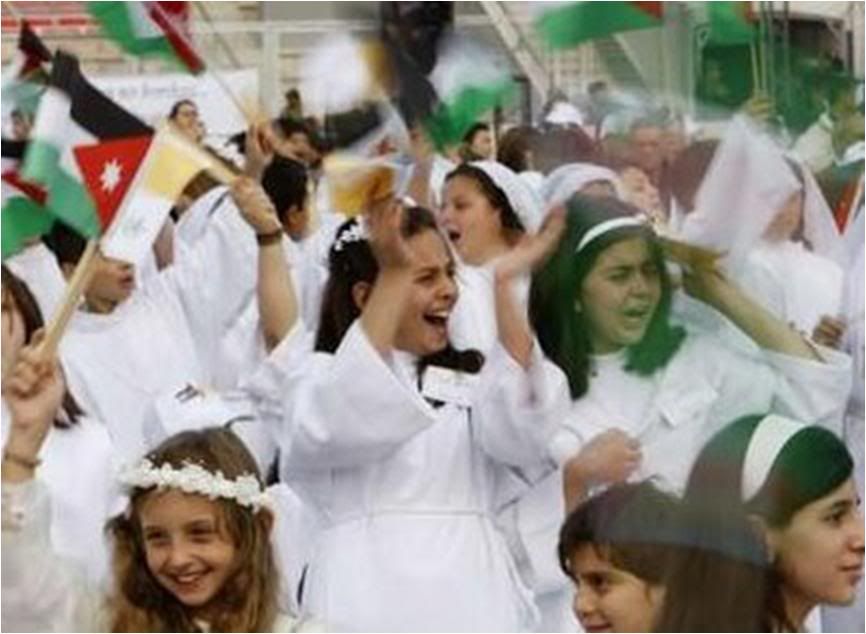
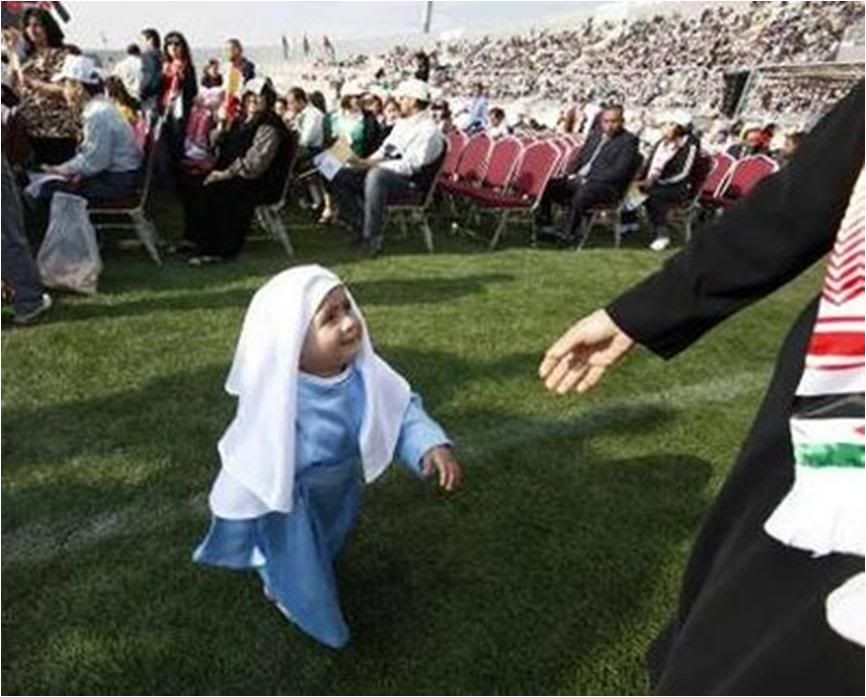
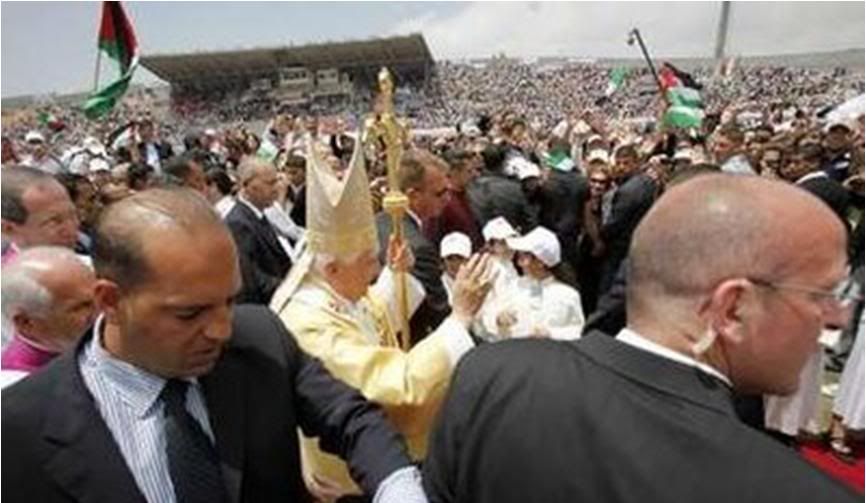
MORE PICTURES FROM THE MASS:
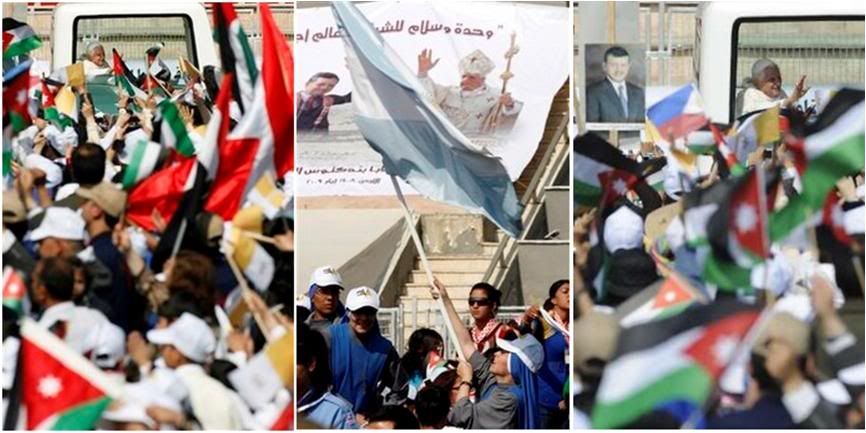
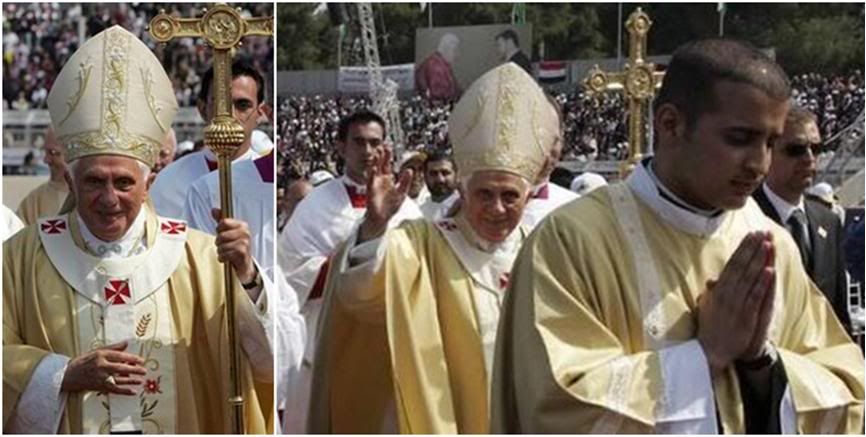
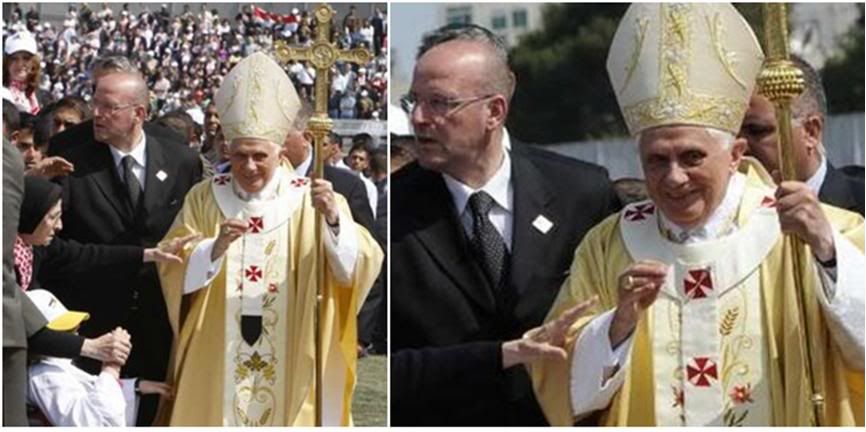
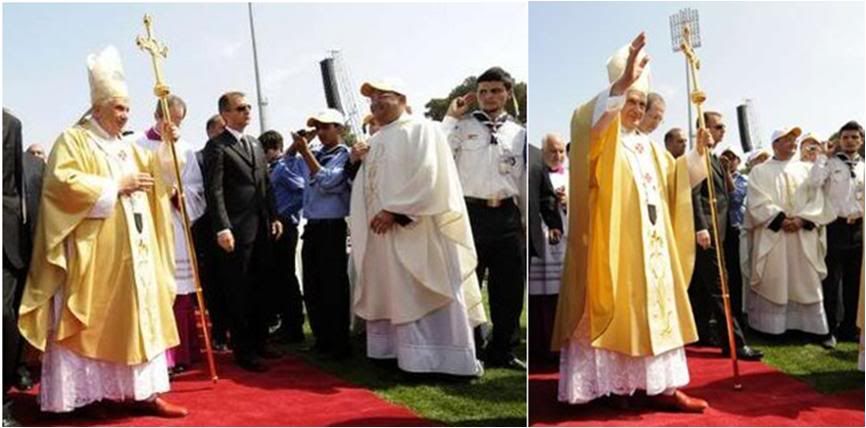
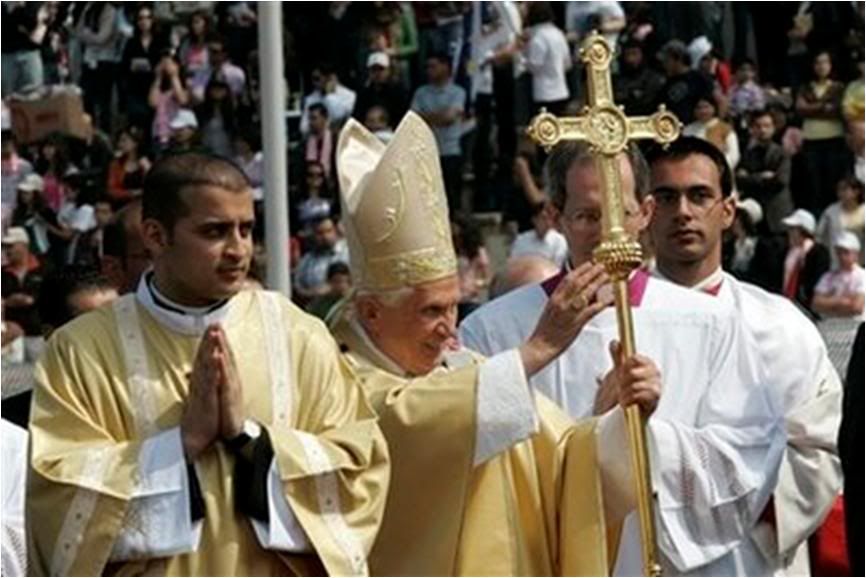
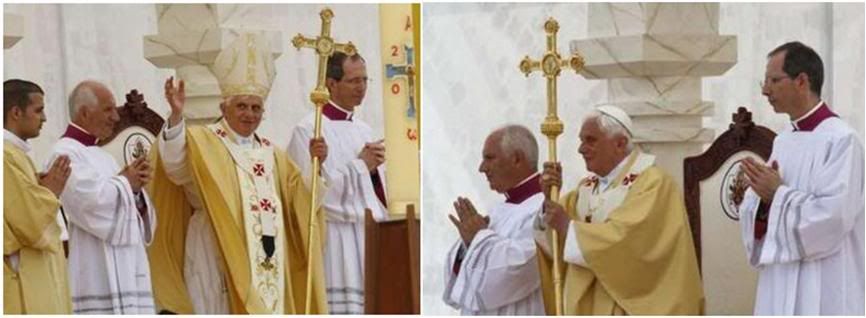
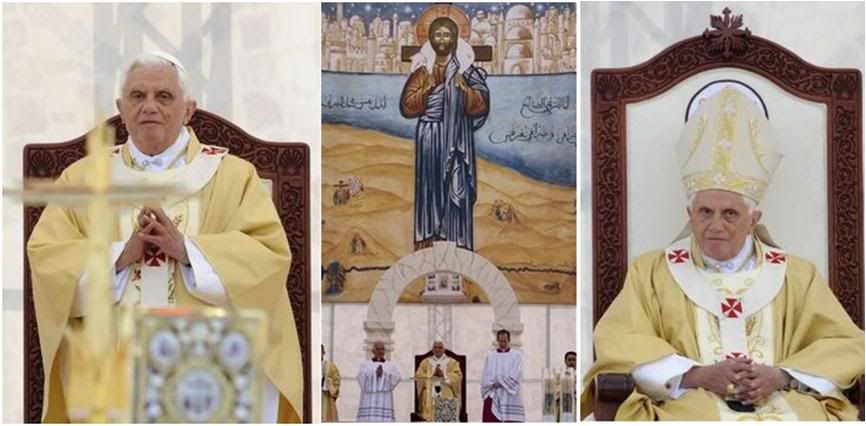
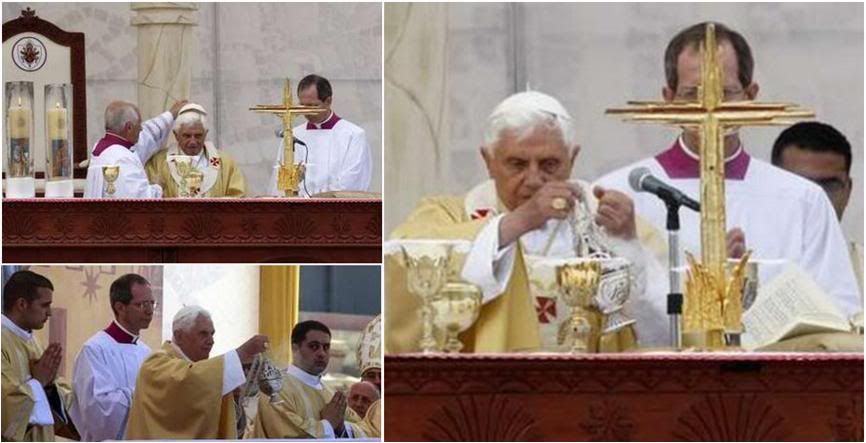
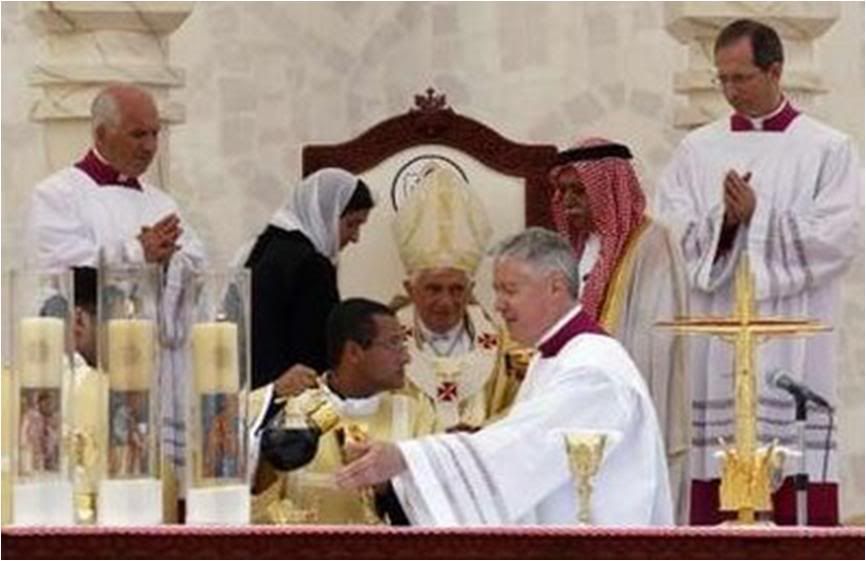
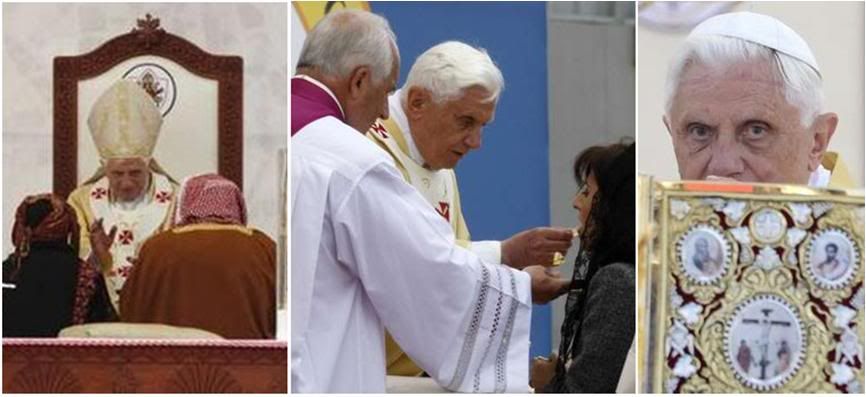
 All the liturgies in Jordan have been beautiful - with an eclectic musical mix that was always compelling. It was the first time I was hearing Byzantine liturgical music and distinctive Arabic music incorporated into a Latin rite Mass, and it worked very well.
All the liturgies in Jordan have been beautiful - with an eclectic musical mix that was always compelling. It was the first time I was hearing Byzantine liturgical music and distinctive Arabic music incorporated into a Latin rite Mass, and it worked very well.
The Vespers ceremony was exemplary, and to me, very unusual, as it incorporated Greek Orthodox liturgical conventions, which made it longer than usual. Part of the fascination was watching the Holy Father following the entire ceremony closely on his missal. Also, the liturgical theme was still the Resurrection.
Then, of course, that unexpected 're-consecration' prayer for celibacy by all the clergy present, starting with the Pope! The Eastern Churches celebrated Easter two weeks after the Roman Church, so all other holidays pegged to Easter are two weeks behind, and Saturday was the eve of Good Shepherd Sunday and the World Day for Vocations.
The use of a classical symphony orchestra for the Mass was very classy, and even the conventional Western music settings used in the mix were beautifully appropriate.
Just as important as the music was the element of design. It was evident at all Church-related events that either the organizers had a guiding aesthetic or it is second nature to them. Consider the colorfully charming interior of the little church at the Regina Pacis center.
The stadium altar was the most integrally conceived of all the outdoor Papal Masses for Pope Benedict so far.
It was obviously meant to simulate a Church, with a nave and two side 'altars'. The Good Shepherd was the central figure - very dramatic, I thought, and how fitting, not just for the feast day, but for the presence of the Holy Father - with another Christ figure and the Virgin dominating the side panels. [And they did not forget to honor their king at the same time by using a gigantic photograph of him with the Pope as a background for the grandstand.)
The altar and the ambo were covered with a dark bordeaux patterned fabric, the altar candles featured imsges of saints in the tradition of Christianc andles sold in the Holy Land, the altar Cross and the Gospel cover were both strikingly beautiful.
All the chairs they set out for the Holy Father were distinctive and appropriat, though I was almost taken aback by the opulent elegance of the chair used at the Baptism site. Simply because it was so unlikely to see it on a temporary stage out there in the desert. (When the cameras first showed it - before I realized that the King and Queen would not be staying for the religious service - I asked myself right away, "And what do the royal thrones look like?")
I think Bethany was also the first time that the backdrop for the Holy Father was a wall with a repeating logo - this has become standard in the past few years for VIP political events and important conferences. It works because it 'brands' an event unmistakably and visibly, so as long as the logo and theme are tastefully presented, it's a good 'awareness' device.
[Modificato da TERESA BENEDETTA 11/05/2009 07:49] |
| |
 10/05/2009 17:11 10/05/2009 17:11 |
|
| | | OFFLINE | | Post: 17.410
Post: 128 | Registrato il: 28/08/2005
Registrato il: 20/01/2009 | Administratore | Utente Junior | |
|

 DAY 3- VISIT TO THE SITE OF THE BAPTISM OF JESUS
DAY 3- VISIT TO THE SITE OF THE BAPTISM OF JESUS
BETHANY BEYOND THE JORDAN
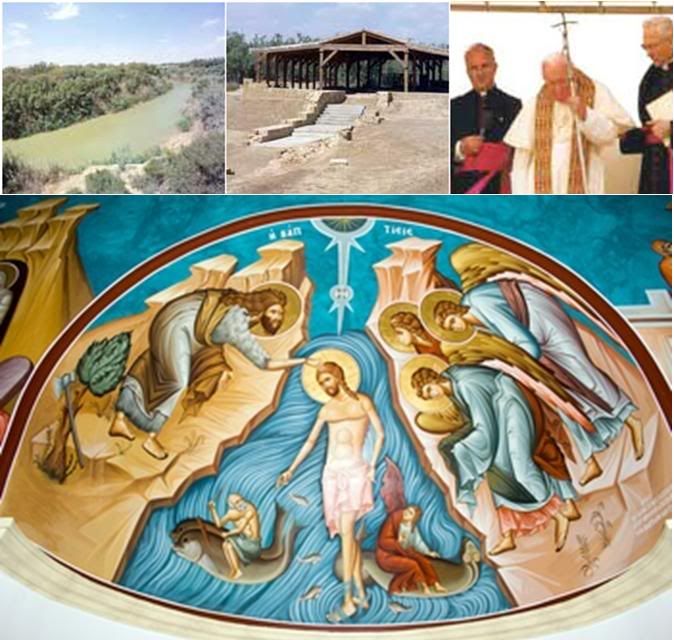 ZENIT has filed a story about the event, though I still see no other:
King Abdullah turns up as
ZENIT has filed a story about the event, though I still see no other:
King Abdullah turns up as
the Pope's suprise tour guide

BETHANY, Jordan, MAY 10, 2009 (Zenit.org).- Benedict XVI was unexpectedly joined today along the banks of the Jordan River by Jordan's King Abdullah II.
The Pope, on day two of his weeklong pilgrimage to the Holy Land, visited the site of Christ's baptism at Bethany beyond the Jordan.
Though not part of the original program, he was accompanied in a private motorcade of elongated golf carts by King Abdullah and Queen Rania. The king, seated beside the Pontiff, explained to his guest the archeological excavations being carried out in the area. The exploration is being overseen by a Jordanian commission.
Archeologists have found more than 20 churches, grottos and baptismal fonts in the area, showing that the site was a popular pilgrimage spot in early Christianity.
Nowadays it is much-neglected, only open a few times a year. But the area is scheduled to undergo considerable growth: King Abdullah is planning to build five Christian churches near the historical site some refer to as the birth of Christianity. And one of the expected consequences of the Holy Father's visit to the location is that pilgrims will rediscover its significance.
After visiting the baptismal site, the small party continued on to a public venue where the Pope was greeted by several thousand faithful. The Pontiff blessed what will be the cornerstones of the two Catholic churches to be built next to the historic river, one Latin and one Greek-Melkite.
"It is with great spiritual joy that I come to bless the foundation stones of the two Catholic Churches to be built beside the river Jordan, a place marked by many memorable events in biblical history," the Holy Father explained.
"The foundation stone of a church is a symbol of Christ," he continued. "The Church rests on Christ, is sustained by him and cannot be separated from him. He is the one foundation of every Christian community, the living stone, rejected by the builders but chosen and precious in God's sight as a cornerstone. With him, we too are living stones built into a spiritual house, a dwelling place for God."
"Let us rejoice," said the Pope, "in the knowledge that the two buildings, one Latin, the other Greek-Melkite, will serve to build up, each according to the traditions of its own community, the one family of God."
Prelates in attendance included Gregorios III Laham, patriarch of Antioch for the Greek Melkite Church, Archbishop Fouad Twal, Latin patriarch of Jerusalem, retired Patriarch Michel Sabbah, Archbishop Joseph Jules Zerey and Bishop Salim Sayegh.
 In the absence earlier of a report devoted to the Bethany event, I posted these notes on what happened during this wonderful event as it unfolded on CTV/EWTN:
In the absence earlier of a report devoted to the Bethany event, I posted these notes on what happened during this wonderful event as it unfolded on CTV/EWTN:
King Abdullah and Queen Rania themselves joined the Holy Father on the trip to the site. Originally, only Prince Ghazi was supposed to be the royal host and guide for this event.
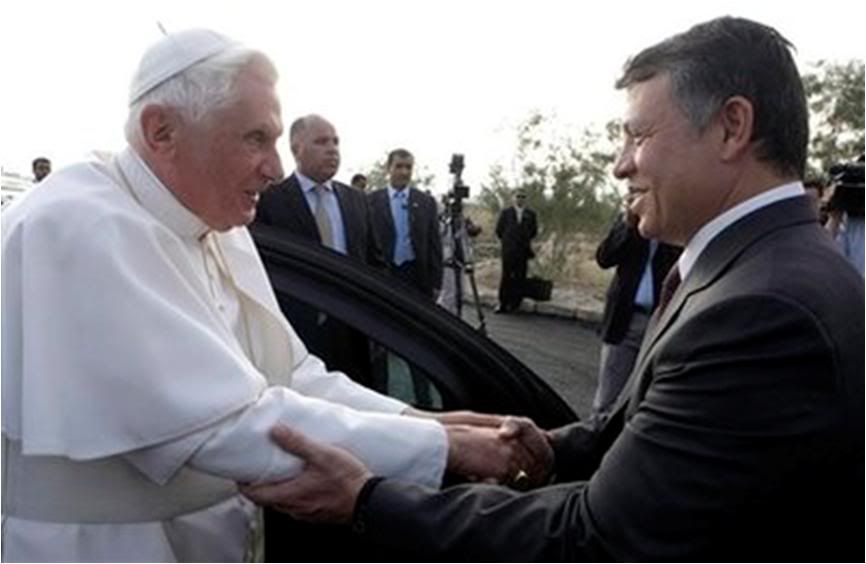
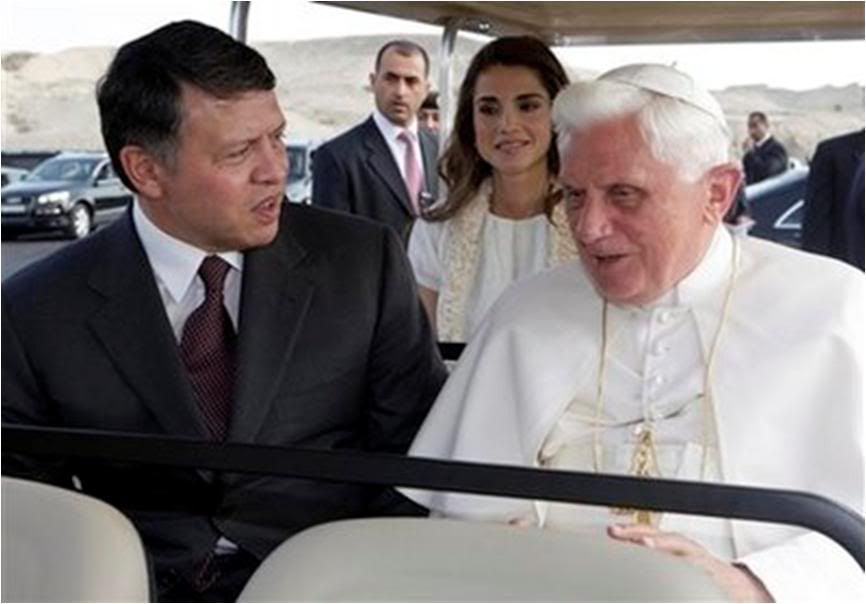
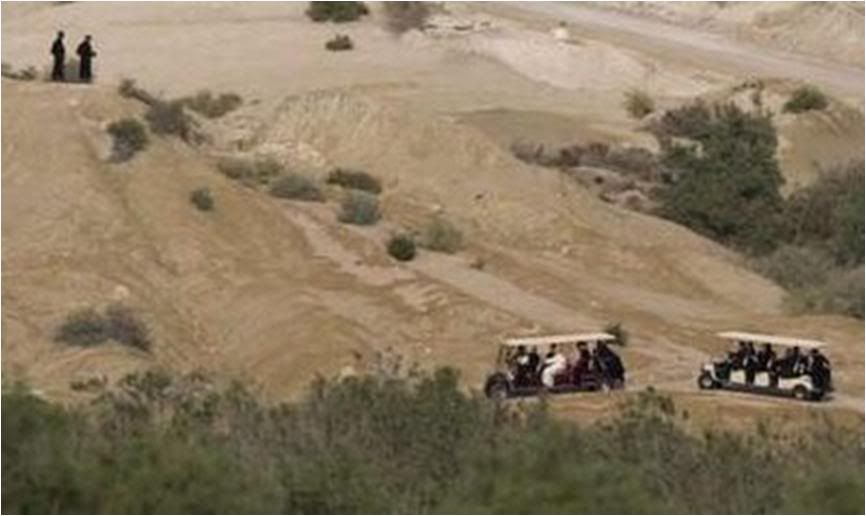
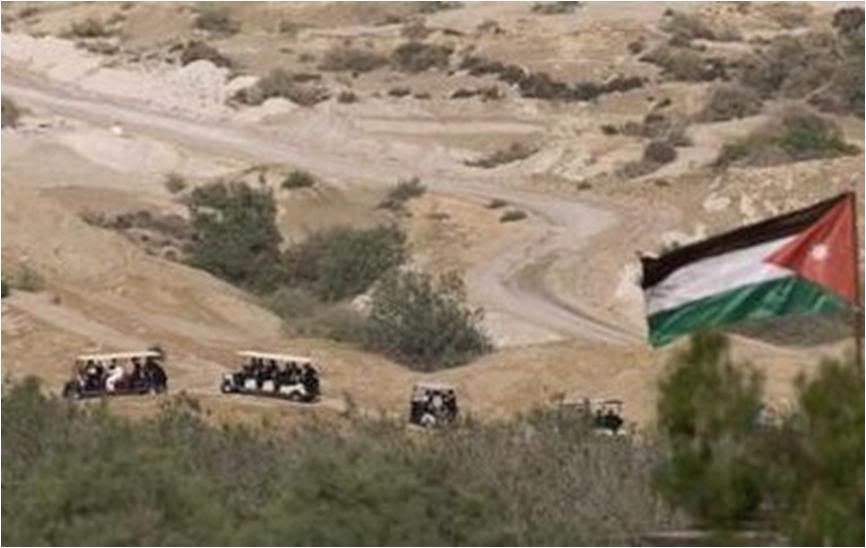
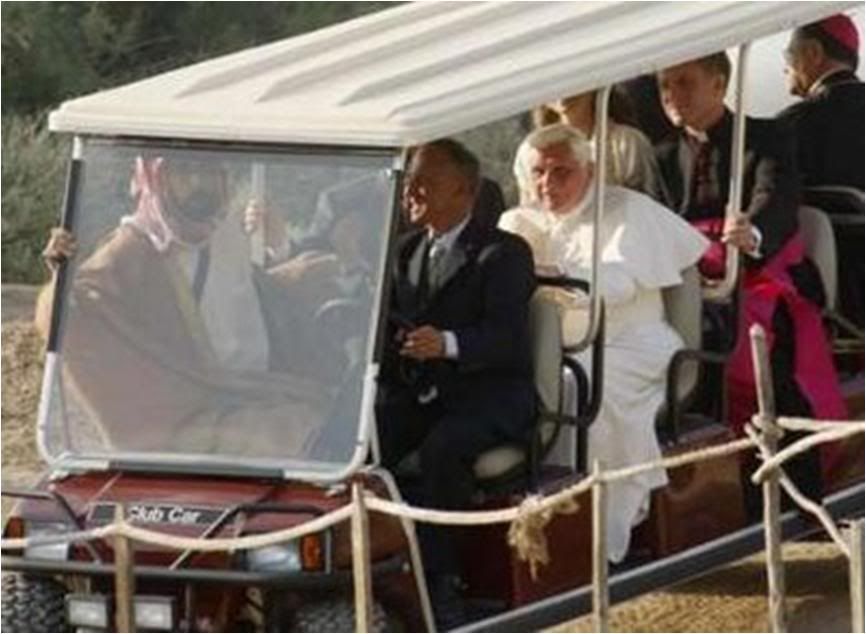
For the trek to the remote site along a narrow road, everyone rode suspersize electric cars - the Pope sat in the second row beside King Abdullah, with Queen Rania and Mons. Gaenswein seated in the row behind; Prince Ghazi sat beside the driver; while Patriarch Twal and Archbishop Sayagh took the rear seats.
The motorcade stopped for a while opposite the archeological digs that established the site's claim to being the baptism site of Jesus, with both the King and Prince Ghazi (and the archeology minister) answering the Pope's questions.
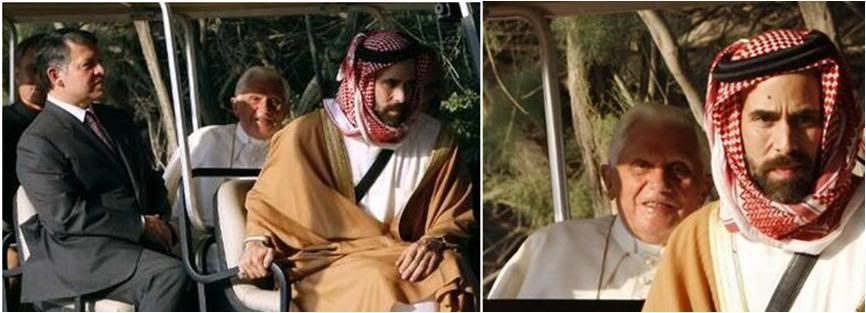
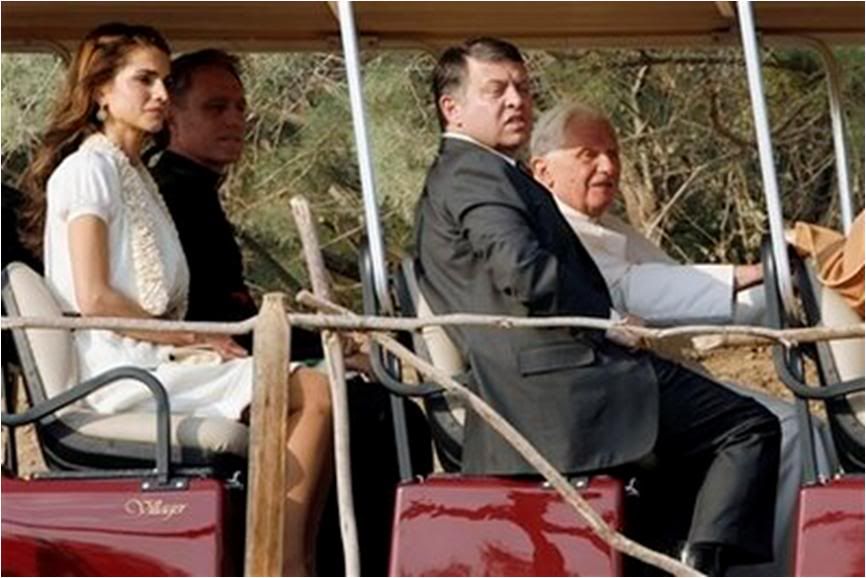
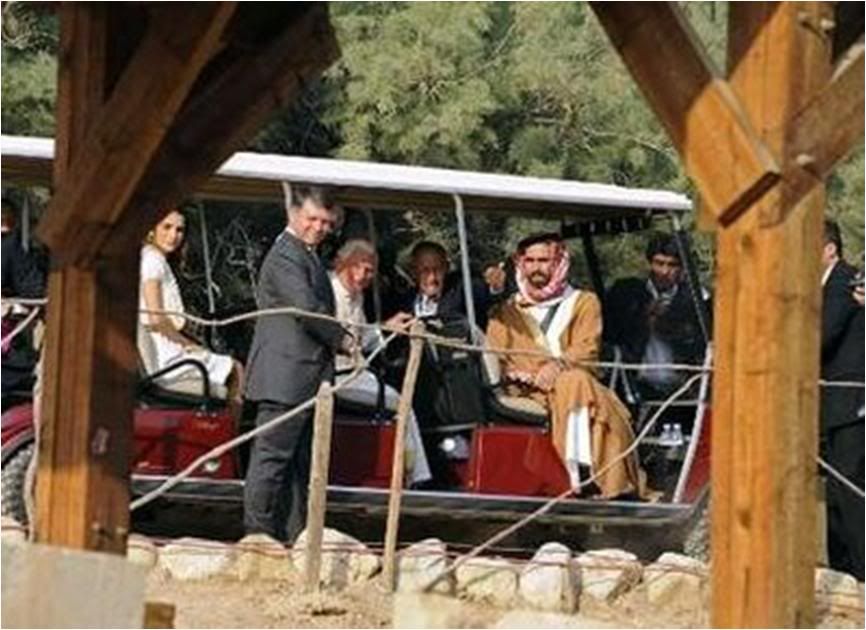
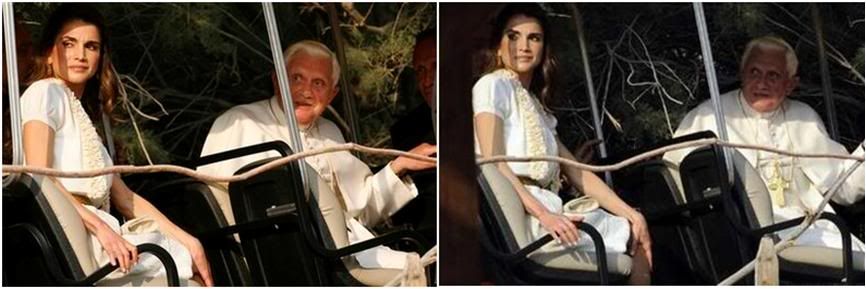
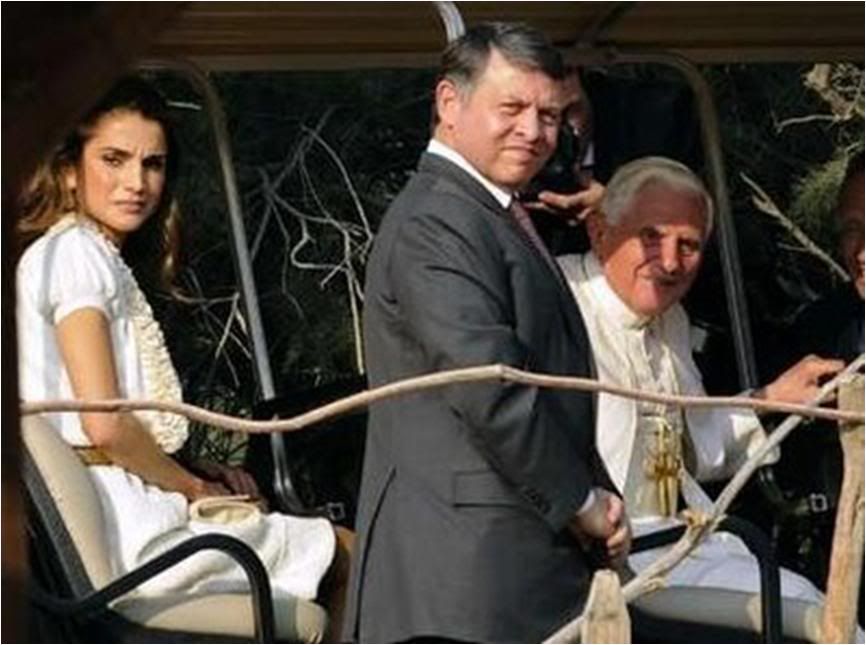
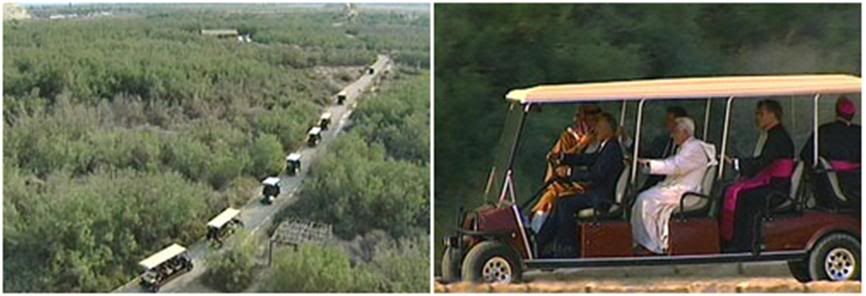
They then proceeded to the site for today's ceremony, where a few hundred faithful were assembled. There, the King and Queen joined the Pope in unveiling the markers for the future Church of the Baptism of Jesus and the Melkite Church under construction now.
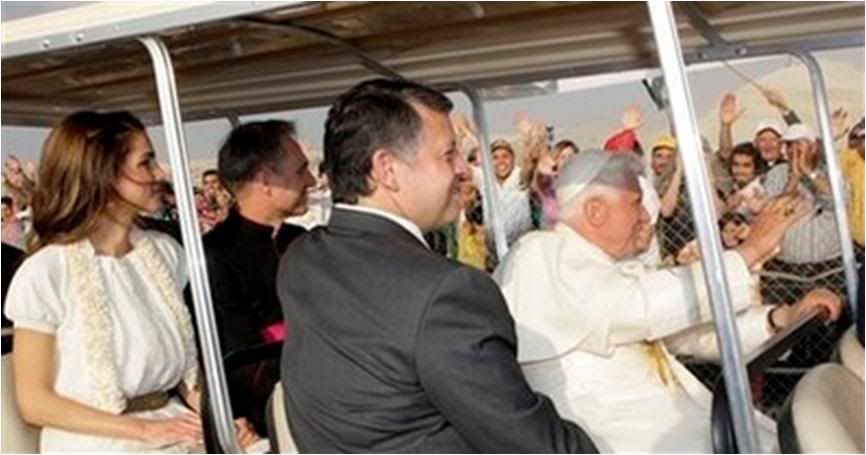
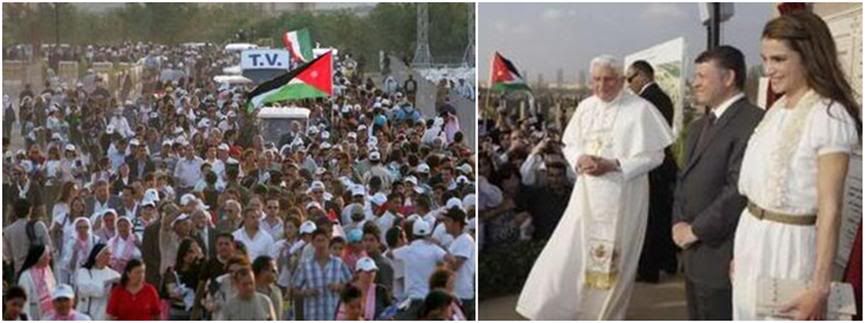
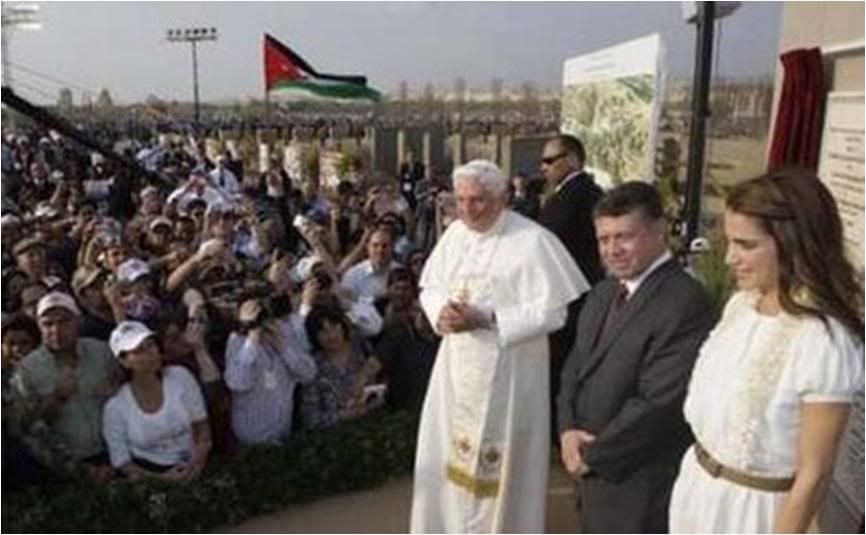
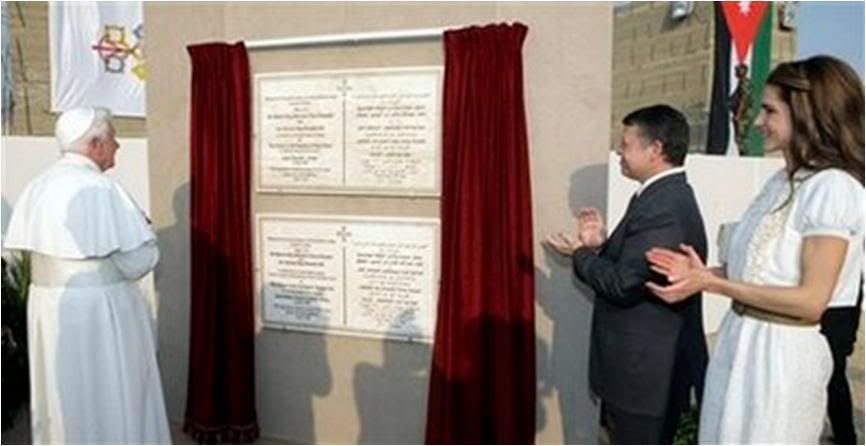
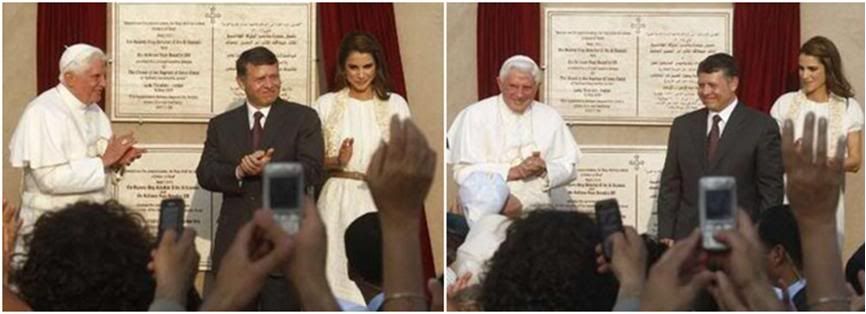
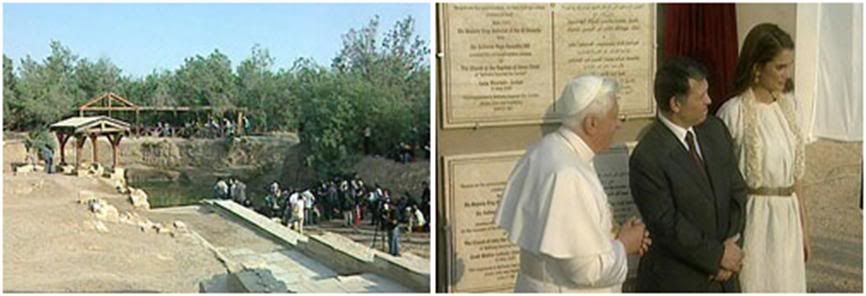
Afterwards, the royal couple discreetly took their leave as the Holy Father proceeded to the stage for the ceremony with the faithful.
Prince Ghazi stayed for the rest of the ceremony but he sat in the front row of the audience, not onstage.
But, in effect, he attended a prayer ceremony that included the blessing of the cornerstones for the churches in construction and a mass renewal of baptismal vows. {This must be a 'first' for any Muslimm royal personage, particulaarly a direct descendant of Mohammed!]
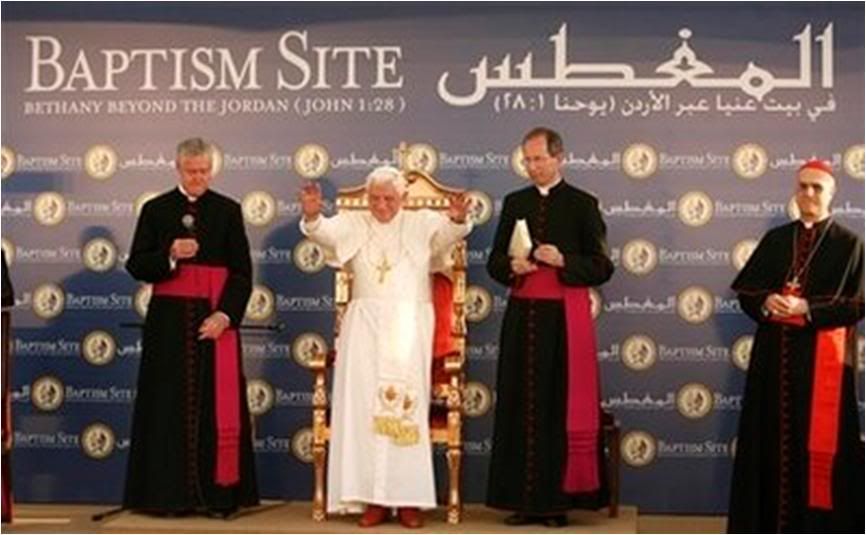
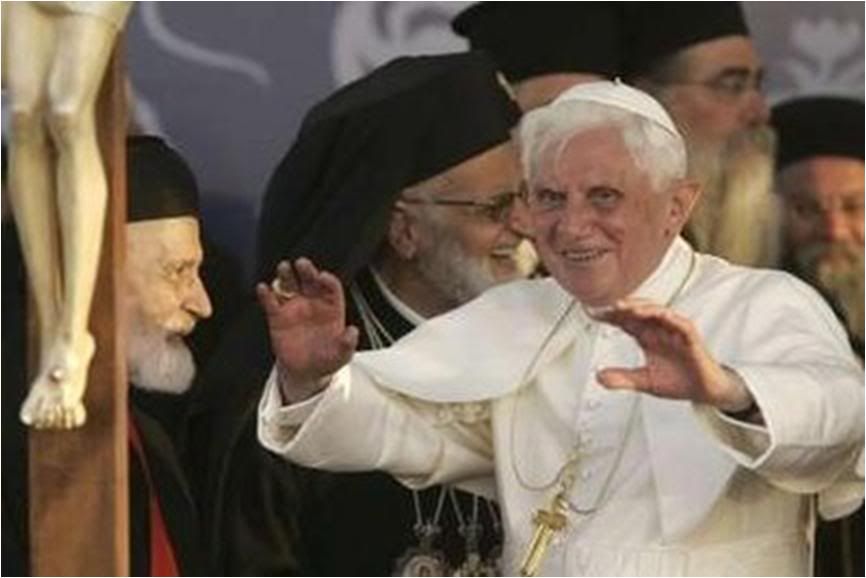
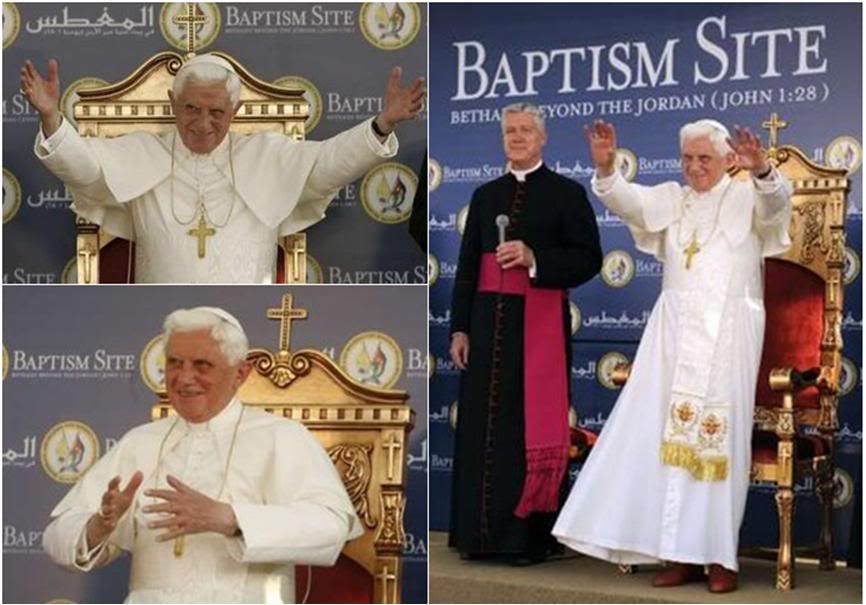
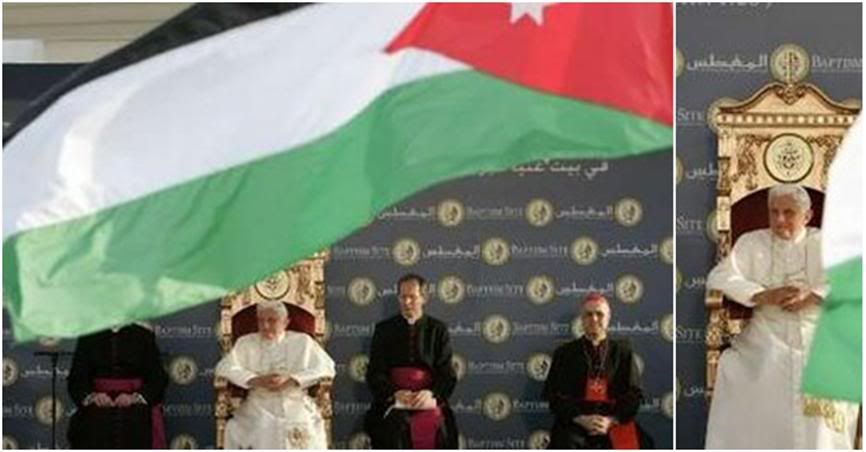
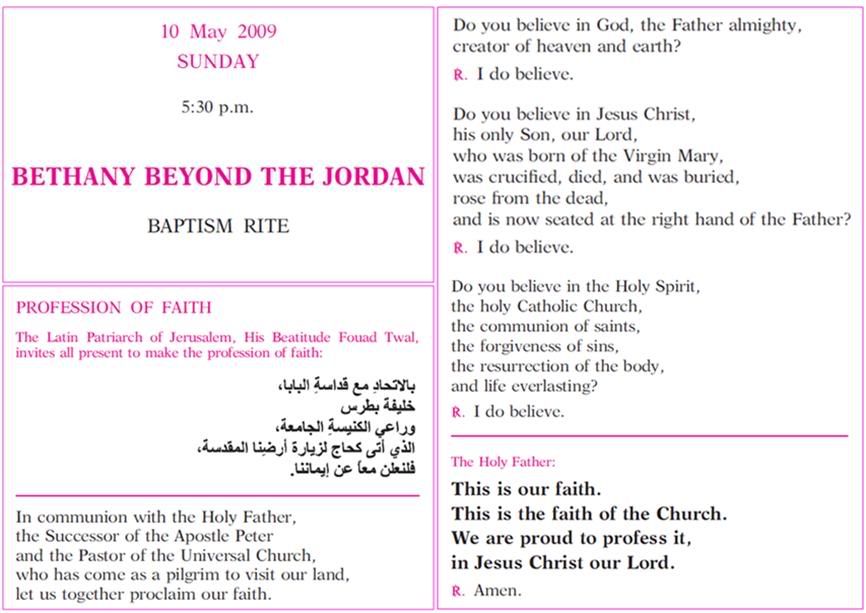
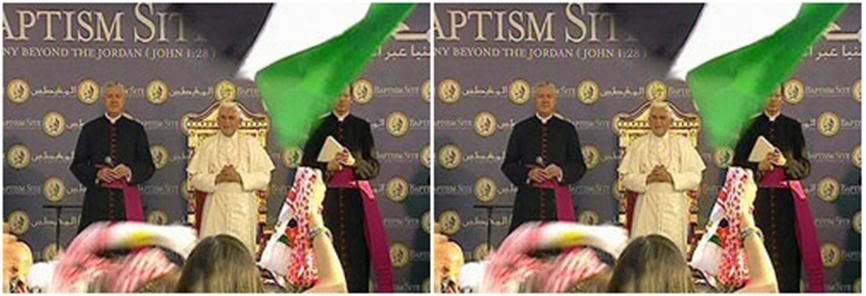
REMARKS AT THE PRAYER SERVICE
Dear Brother Bishops,
Dear friends,
It is with great spiritual joy that I come to bless the foundation stones of two Catholic Churches to be built beside the river Jordan, a place marked by many memorable events in biblical history.
The prophet Elijah the Tishbite, was from this area, not far north of Galaad. Near here, facing Jericho, the waters of the Jordan opened before Elijah who was taken up by the Lord in a chariot of fire (cf. 2 Kg 2:9-12).
Here the Spirit of the Lord called John the son of Zechariah to preach a conversion of hearts. John the Evangelist also places in this area the meeting between the Baptist and Jesus, who at his baptism was “anointed” by the Spirit of God descending as a dove, and proclaimed the beloved Son of the Father (cf. Jn 1:28; Mk 1:9-11).
I greet with joy His Beatitude Gregorios III Laham, Patriarch of Antioch for the Greek Melkite Church. I also greet with affection His Beatitude Archbishop Fouad Twal, Latin Patriarch of Jerusalem. I extend my warm best wishes to His Beatitude Michel Sabbah, to the Auxiliary Bishops present, particularly to Archbishop Joseph Jules Zerey and the Most Reverend Salim Sayegh, whom I thank for his kind words of welcome.
I am pleased to greet all the Bishops, priests, religious and faithful who accompany us today. Let us rejoice in the knowledge that the two buildings, one Latin, the other Greek Melkite, will serve to build up, each according to the traditions of its own community, the one family of God.
The foundation stone of a church is a symbol of Christ. The Church rests on Christ, is sustained by him and cannot be separated from him. He is the one foundation of every Christian community, the living stone, rejected by the builders but chosen and precious in God’s sight as the cornerstone (cf. 1 Pet 2:4-5, 7).
With him, we too are living stones built into a spiritual house, a dwelling place for God (cf. Eph 2:20-22; 1 Pet 2:5). Saint Augustine loved to refer to the mystery of the Church as the Christus totus, the whole Christ, the full or complete Body of Christ, Head and members.
This is the reality of the Church; it is Christ and us, Christ with us. He is with us as the vine is with its own branches (cf. Jn 15:1-8).
The Church is in Christ a community of new life, a dynamic reality of grace that flows from him. Through the Church Christ purifies our hearts, enlightens our minds, unites us with the Father and, in the one Spirit, moves us to a daily exercise of Christian love. We confess this joyful reality as the One, Holy, Catholic and Apostolic Church.
We enter the Church through baptism. The memory of Christ’s own baptism is brought vividly before us in this place. Jesus stood in line with sinners and accepted John’s baptism of penance as a prophetic sign of his own passion, death and resurrection for the forgiveness of sins.
Down through the centuries, many pilgrims have come to the Jordan to seek purification, renew their faith and draw closer to the Lord. Such was the pilgrim Egeria, who left a written account of her visit during the late fourth century.
The Sacrament of Baptism, drawing its power from Christ’s death and resurrection, will be cherished especially by the Christian communities that gather in the new church buildings.
May the Jordan always remind you that you have been washed in the waters of baptism and have become members of the family of Jesus. Your lives, in obedience to his word, are being transformed into his image and likeness. As you strive to be faithful to your baptismal commitment of conversion, witness and mission, know that you are being strengthened by the gift of the Holy Spirit.
Dear brothers and sisters, may the prayerful contemplation of these mysteries enrich you with spiritual joy and moral courage. With the Apostle Paul, I encourage you to grow in the whole range of noble attitudes covered by the blessed name of agape, Christian love (cf. 1 Cor 13:1-13).
Promote dialogue and understanding in civil society, especially when claiming your legitimate rights. In the Middle East, marked by tragic suffering, by years of violence and unresolved tensions, Christians are called to offer their contribution, inspired by the example of Jesus, of reconciliation and peace through forgiveness and generosity.
Continue being grateful to those who lead you and serve you faithfully as ministers of Christ. You do well to accept their guidance in faith knowing that, by receiving the apostolic teaching they transmit, you welcome Christ and you welcome the One who sent him (cf. Mt 10:40).
My dear brothers and sisters, we now proceed to bless these two stones, the beginning of two new sacred buildings. May the Lord sustain, strengthen and increase the communities that will worship in them. And may he bless you all with his gift of peace. Amen!
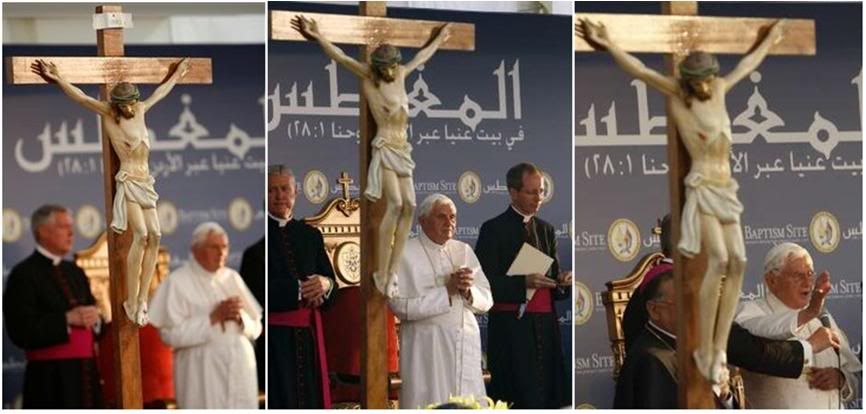
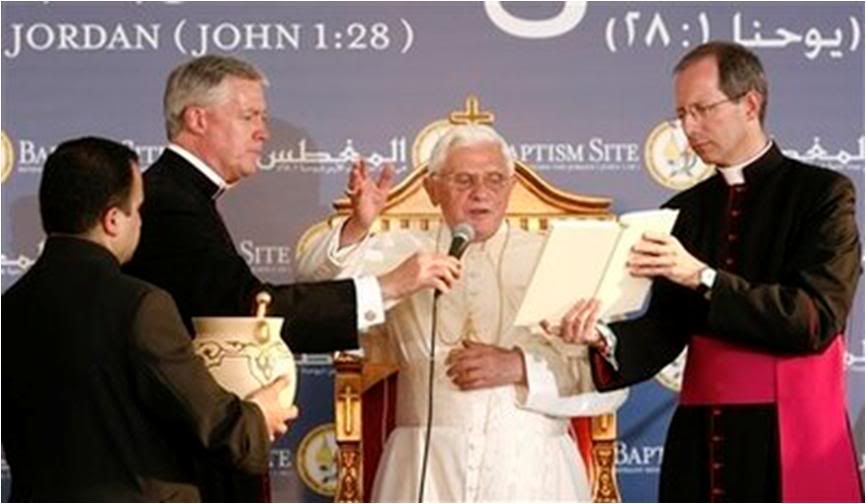
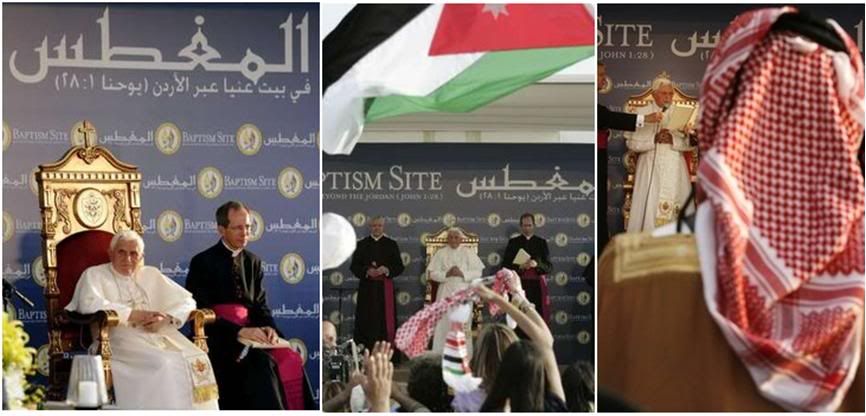
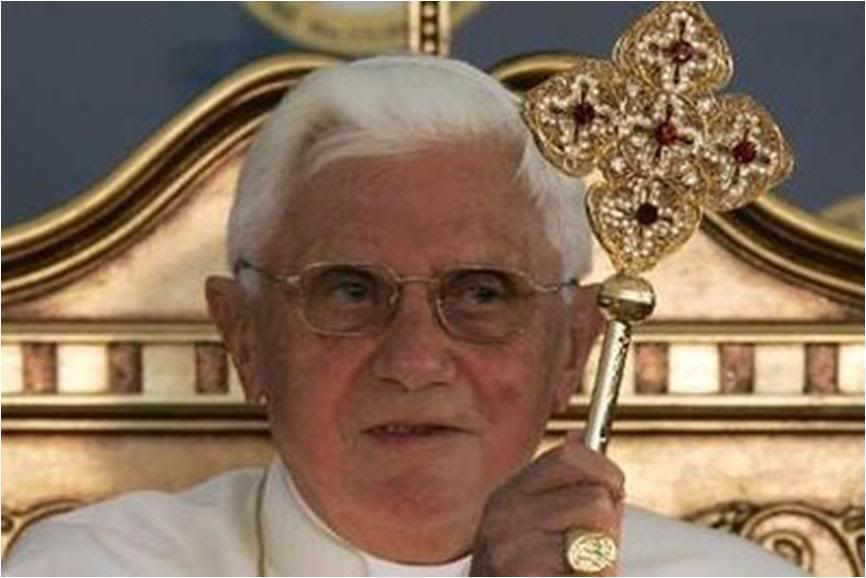
[Modificato da TERESA BENEDETTA 11/05/2009 01:50] |
| |
 10/05/2009 19:44 10/05/2009 19:44 |
|
| | | OFFLINE | | Post: 17.411
Post: 129 | Registrato il: 28/08/2005
Registrato il: 20/01/2009 | Administratore | Utente Junior | |
|
 At First Communion Mass,
At First Communion Mass,
Pope preaches courage in following Jesus
By Cindy Wooden


AMMAN, Jordan, May 10 (CNS) -- Pope Benedict XVI's only public Mass in Jordan was a liturgy like that found in many parishes in May: It was first Communion Sunday.
Dressed in white robes and seated close to the altar platform, dozens of children from all over Jordan received the Eucharist for the first time during the pope's Mass May 10 in Amman International Stadium.
Peter Mihko, 15, and his sister Cecilia, 11, were part of the first Communion group of 40 young people from Sacred Heart Chaldean Catholic parish in Amman. Like many in the group, the Mihko siblings are refugees from Iraq.
"I'm going to receive my first Communion from the pope," Cecilia said before Mass. "Wow! This is something really amazing; it's a dream come true."
Her older brother said, "Words cannot describe what I am feeling at receiving my first Communion from the messenger of God, from the messenger of peace."
In his homily, Pope Benedict preached about the need for fidelity and courage in following Jesus, in discovering one's vocation, in building a family, in promoting dialogue with Jordan's Muslim majority and in carrying out acts of charity.
"Jesus knows what challenges you face, what trials you endure and the good that you do in his name," Pope Benedict told the crowd in the stadium, which holds 25,000 people.
Standing in front of a picture of Jesus, the Good Shepherd, the pope encouraged Jordan's 109,000 Catholics to trust Jesus, to trust in his love for his flock and to "persevere in your witness to the triumph of his love."
People should be grateful, he said, for the love of God that can be experienced in the family, "from the love of our fathers and mothers, our grandparents, our brothers and sisters."
"May every Christian family grow in fidelity to its lofty vocation to be a true school of prayer where children learn a sincere love of God, where they mature in self-discipline and concern for the needs of others and where, shaped by the wisdom born of faith, they contribute to the building of an ever more just and fraternal society," the pope prayed.
Noting that the local church was nearing the end of a special year of the family, which included a focus on the dignity of women, Pope Benedict urged the people to recognize "how much your society owes to all those women who in different and at times courageous ways have devoted their lives to building peace and fostering love."
"By its public respect for women and its defense of the innate dignity of every human person, the church in the Holy Land can make an important contribution to the advancement of a culture of true humanity and the building of a civilization of love," he said.
One of the mothers present at the Mass was Mariana Kardsheh, who came from Madaba with her husband and children, including 8-year-old Natalie, who was making her first Communion during the liturgy.
"It's no coincidence" that Natalie was chosen to be among the children receiving the sacrament at the papal Mass, Kardsheh said.
She and her husband -- childless at the time -- were at Pope John Paul II's Mass in Amman in 2000.
"I made my way to the popemobile. He looked at me, I saw his eyes and I made my prayer," Kardsheh said.
Two months later she was asleep and dreaming, she said; "I opened my eyes and saw an angel and I knew it was a girl," who would be born.
Kardsheh is convinced that Natalie's birth was an answer to the prayer she made in the presence of Pope John Paul and that it was fitting that the girl's first Communion Mass would be celebrated by Pope Benedict.
With Catholics attending the Mass from all over the Middle East, including the violence-torn Iraq, Pope Benedict said he knows that the region's Christians are affected by "difficulties and uncertainties."
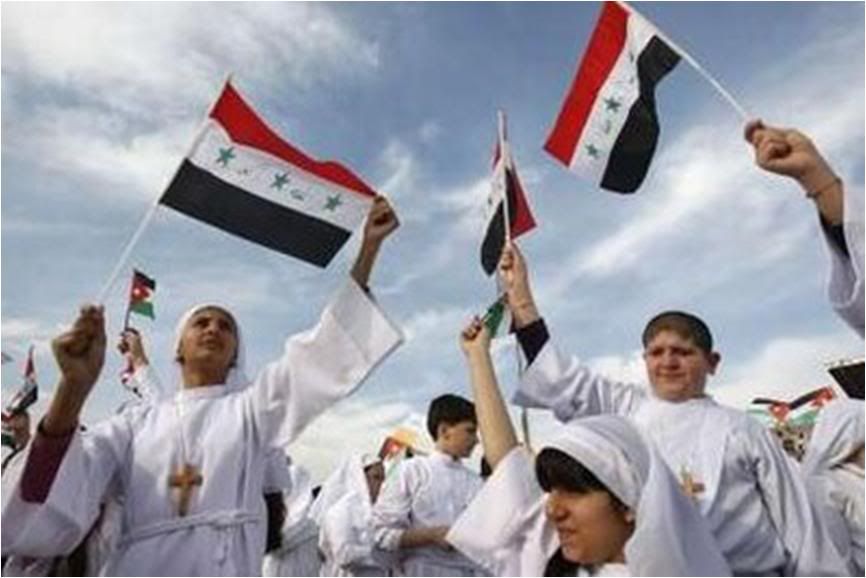
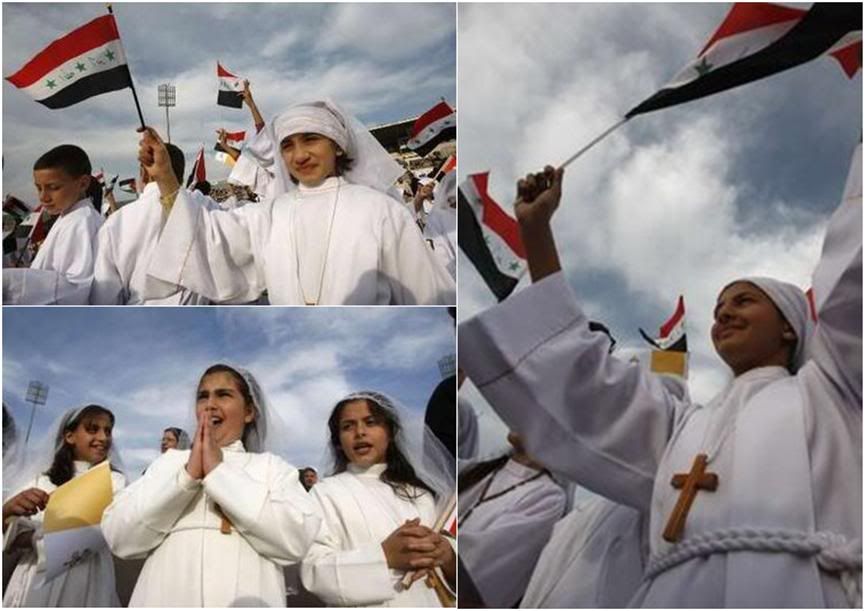
"May you never forget the great dignity which derives from your Christian heritage or fail to sense the loving solidarity of all your brothers and sisters in the church throughout the world," he said.
The Naiomi family, Chaldean Catholics who fled to Amman from Mosul, Iraq, three years ago, was part of the crowd at the Mass.
Saif Naiomi, 24, said, "We want the pope to send a message of peace so that people can understand that the Christian religion is a peacemaker.
"I wish the pope could go to Iraq, but he can't because there is no security," he said.
Pope Benedict encouraged the people to stay in the Middle East, work for the good of their countries and remain solid in the faith of their communities founded by Jesus' disciples.
"Fidelity to your Christian roots, fidelity to the church's mission in the Holy Land, demands of each of you a particular kind of courage: the courage of conviction, born of personal faith, not mere social convention or family tradition," he said.
Being Christian means having "the courage to engage in dialogue and to work side by side with other Christians in the service of the Gospel and solidarity with the poor, the displaced and the victims of profound human tragedies," the pope said.
Christians must build bridges to members of other faiths and cultures, opening a dialogue that will "enrich the fabric of society," he said.
And in a region torn by violence and terrorism, Pope Benedict told those at the Mass that being faithful "also means bearing witness to the love which inspires us to lay down our lives in the service of others, and thus to counter ways of thinking which justify taking innocent lives."
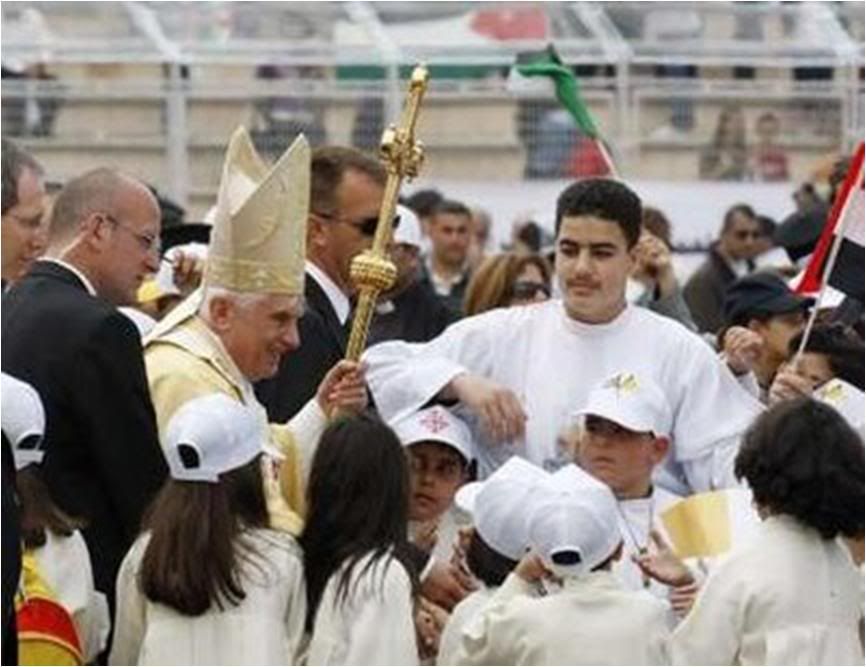
|
| |
 11/05/2009 14:39 11/05/2009 14:39 |
|
| | | OFFLINE | | Post: 17.412
Post: 130 | Registrato il: 28/08/2005
Registrato il: 20/01/2009 | Administratore | Utente Junior | |
|
|
| |
 11/05/2009 14:47 11/05/2009 14:47 |
|
| | | OFFLINE | | Post: 17.413
Post: 131 | Registrato il: 28/08/2005
Registrato il: 20/01/2009 | Administratore | Utente Junior | |
|
|
| |
 11/05/2009 14:52 11/05/2009 14:52 |
|
| | | OFFLINE | | Post: 17.414
Post: 132 | Registrato il: 28/08/2005
Registrato il: 20/01/2009 | Administratore | Utente Junior | |
|
RESERVED FOR JORDAN DEPARTURE STORIES |
| |
 11/05/2009 15:35 11/05/2009 15:35 |
|
| | | OFFLINE | | Post: 17.415
Post: 133 | Registrato il: 28/08/2005
Registrato il: 20/01/2009 | Administratore | Utente Junior | |
|
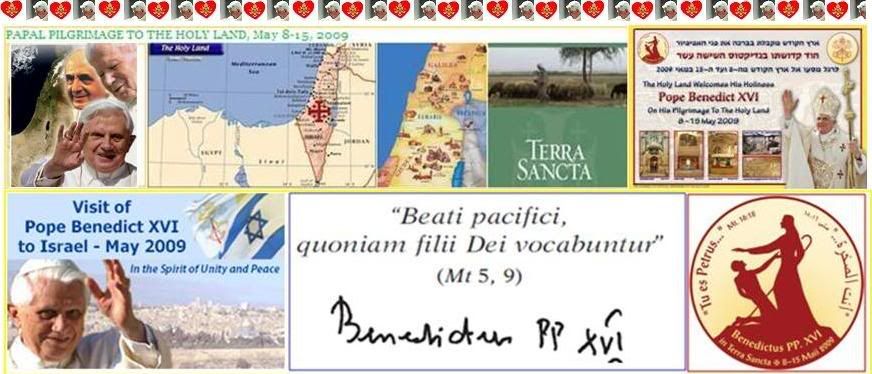 Day 1 - ISRAEL
Day 1 - ISRAEL
Arrival in Tel Aviv/Jerusalem
An event map from AP recapitulates the Pope's Holy Land pilgrimage at a glance:
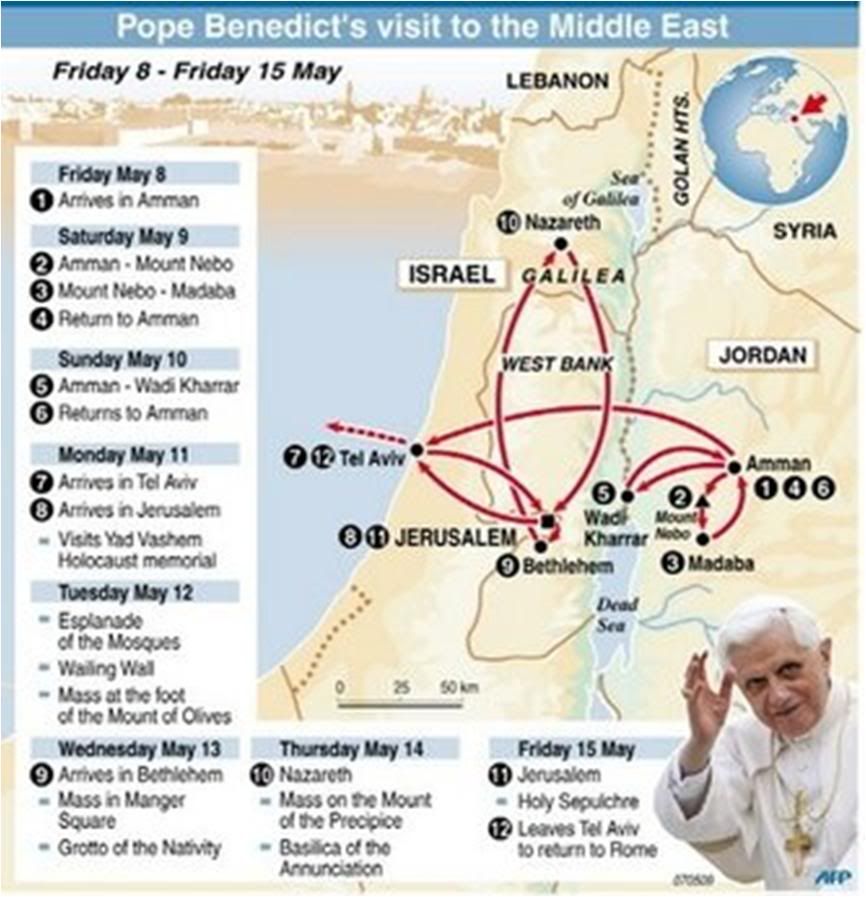 Oddly, only BBC has posted a report so far on the Pope's arrival in israel, where he has just now begun his courtesy visit with President Shimon Peres in Jerusalem, who presented him with a sheaf of a new double-yield variety of wheat developed by Israeli scientists and which President Peres said will be named 'Benedict XVI wheat'.
Pope on sensitive visit to Israel
Oddly, only BBC has posted a report so far on the Pope's arrival in israel, where he has just now begun his courtesy visit with President Shimon Peres in Jerusalem, who presented him with a sheaf of a new double-yield variety of wheat developed by Israeli scientists and which President Peres said will be named 'Benedict XVI wheat'.
Pope on sensitive visit to Israel

May 11, 2009
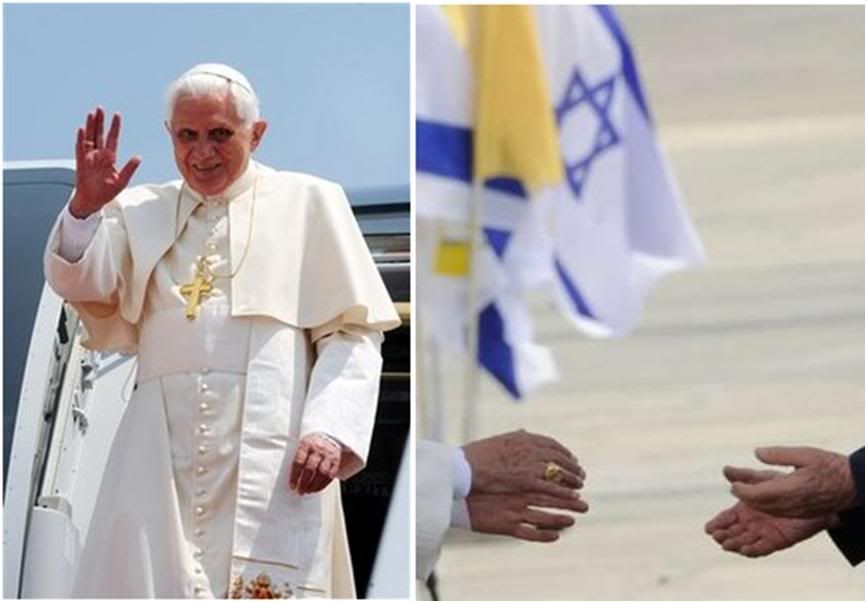
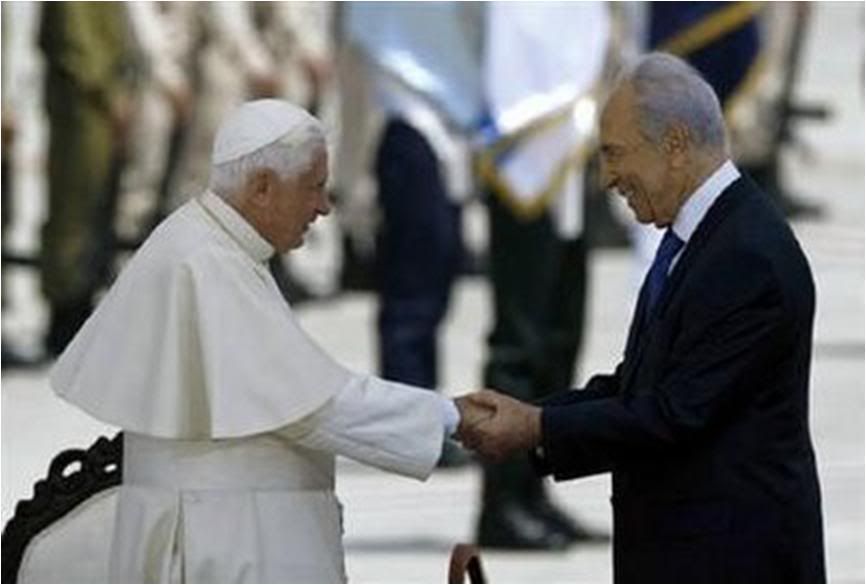
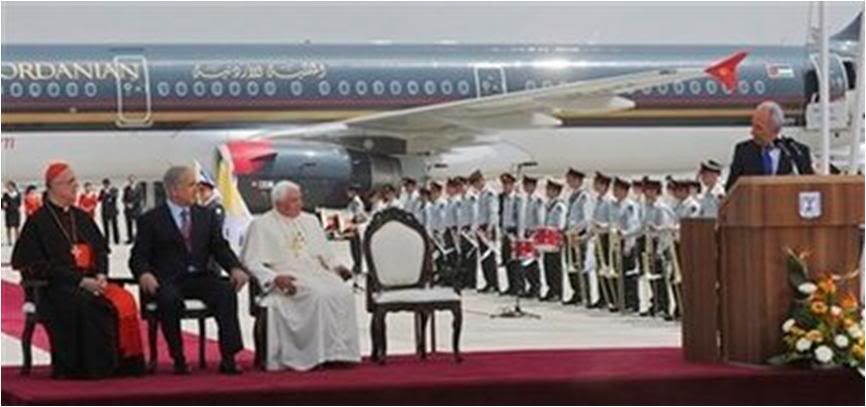
Pope Benedict XVI has arrived in Israel on the second and most sensitive leg of his Middle East tour.
He was greeted by Israeli leaders at an airport near Tel Aviv before flying to Jerusalem by helicopter.
During the next five days the pontiff will visit sacred sites linked with the life of Jesus and hold talks with Israeli and Palestinian leaders.
The Pope angered many in Israel by readmitting to the Church a bishop who had denied the extent of the Holocaust.
And some Israelis are also unhappy over the Pope's support for the beatification of Pope Pius XII - the pontiff during World War II who they believe did not do enough to save persecuted Jews.
Addressing the Pope at Ben Gurion airport, President Shimon Peres said he hoped the pontiff's visit would help "pave the road to peace".
In his arrival speech, the Pope immediately addressed the issue of Palestinian statehood.
"I plead with all those responsible to explore every possible avenue in the search for a just resolution of the outstanding difficulties," he said.
"So that both people may live in peace in a homeland of their own within secure and internationally recognised borders."
Prime Minister Benjamin Netanyahu, who was in the greeting party but did not make a speech, has so far not said if he would support a two-state solution.
Mr Netanyahu has now flown to Egypt, where the idea of a two-state solution will be high on the agenda in talks with President Hosni Mubarak.
The BBC's David Willey, travelling with the Pope, says the Catholic Church and the current Israeli government do not see eye-to-eye on Palestinian statehood.
He says the issue will be the main focus of talks between the Pope and the Israeli government over the next few days.
The Pope said Israel and the Vatican had many shared values, including the desire to put religion in its rightful place in society.
He also said he would pray for the six million victims of the Holocaust and promised to fight anti-Semitism around the world.
"I will have the opportunity to honour the memory of the six million Jewish victims of the Shoah," he said.
"Sadly anti-Semitism continues to rear its ugly head in many parts of the world. This is totally unacceptable."
Apart from celebrating Mass in Jerusalem and Nazareth, Pope Benedict will also visit some hugely sensitive sites - the Holocaust museum Yad Vashem on Monday and, later in the week the most sacred places in Jerusalem for Jews and Muslims.
He will also visit a Palestinian refugee camp close to Bethlehem.
Israel is beefing up security for the trip in an operation named "White Robe", with tens of thousands of law-enforcement officers deployed and entire sections of Jerusalem to be shut down.
During the previous leg of his tour - a three-day stay in Jordan - the Pope stressed the importance of Christians and Muslims working together.
Analysts say his words are likely to be heavily scrutinised during this week's trip.
Prime Minister Netanyahu joined the welcome ceremony at Ben Gurion airport before leaving for Egypt.
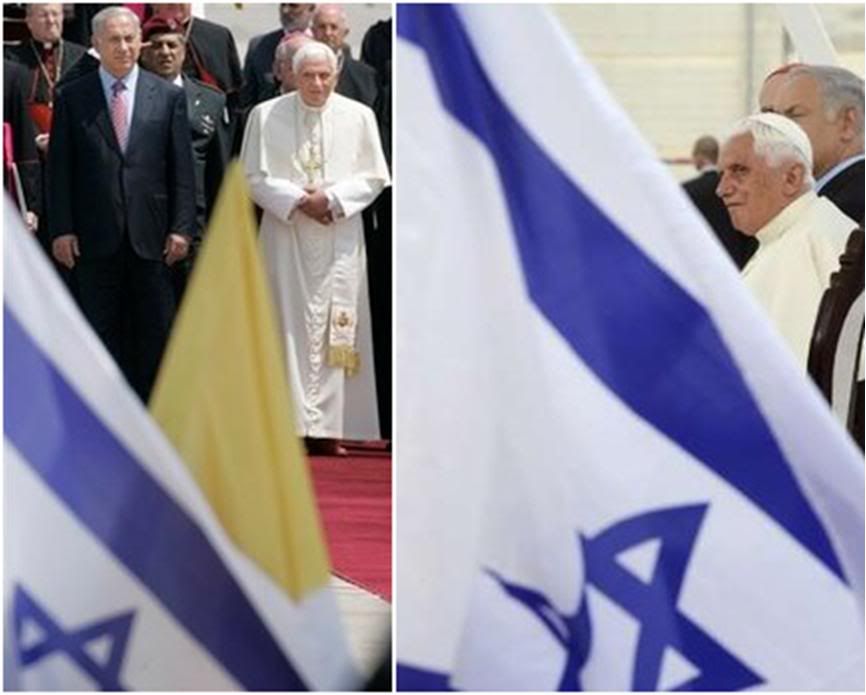 THE HOLY FATHER'S ADDRESS
THE HOLY FATHER'S ADDRESS
ON ARRIVING IN ISRAEL
Mr President,
Mr Prime Minister,
Your Excellencies, Ladies and Gentlemen,
Thank you for your warm welcome to the State of Israel, a land which is held holy by millions of believers around the world.
I am grateful to the President, Mr Shimon Peres, for his kind words, and I appreciate the opportunity that has been offered to me to come on pilgrimage to a land that is hallowed by the footsteps of patriarchs and prophets, a land that Christians hold in particular veneration as the setting for the events of the life, death and resurrection of Jesus Christ.
I take my place in a long line of Christian pilgrims to these shores, a line that stretches back to the earliest centuries of the Church’s history and which, I am sure, will continue long into the future.
I come, like so many others before me, to pray at the holy places, to pray especially for peace – peace here in the Holy Land, and peace throughout the world.
Mr President, the Holy See and the State of Israel have many shared values, above all a commitment to give religion its rightful place in the life of society.
The just ordering of social relationships presupposes and requires a respect for the freedom and dignity of every human being, whom Christians, Muslims and Jews alike believe to be created by a loving God and destined for eternal life.
When the religious dimension of the human person is denied or marginalized, the very foundation for a proper understanding of inalienable human rights is placed in jeopardy.
Tragically, the Jewish people have experienced the terrible consequences of ideologies that deny the fundamental dignity of every human person.
It is right and fitting that, during my stay in Israel, I will have the opportunity to honor the memory of the six million Jewish victims of the Shoah, and to pray that humanity will never again witness a crime of such magnitude.
Sadly, anti-Semitism continues to rear its ugly head in many parts of the world. This is totally unacceptable. Every effort must be made to combat anti-Semitism wherever it is found, and to promote respect and esteem for the members of every people, tribe, language and nation across the globe.
During my stay in Jerusalem, I will have the pleasure of meeting many of this country’s distinguished religious leaders. One thing that the three great monotheistic religions have in common is a special veneration for that holy city.
It is my earnest hope that all pilgrims to the holy places will be able to access them freely and without restraint, to take part in religious ceremonies and to promote the worthy upkeep of places of worship on sacred sites.
May the words of Isaiah’s prophecy be fulfilled, that many nations shall flow to the mountain of the house of the Lord, that he may teach them his ways, that they may walk in his paths – paths of peace and justice, paths that lead to reconciliation and harmony (cf. Is 2:2-5).
Even though the name Jerusalem means “city of peace”, it is all too evident that, for decades, peace has tragically eluded the inhabitants of this holy land.
The eyes of the world are upon the peoples of this region as they struggle to achieve a just and lasting solution to conflicts that have caused so much suffering.
The hopes of countless men, women and children for a more secure and stable future depend on the outcome of negotiations for peace between Israelis and Palestinians.
In union with people of good will everywhere, I plead with all those responsible to explore every possible avenue in the search for a just resolution of the outstanding difficulties, so that both peoples may live in peace in a homeland of their own, within secure and internationally recognized borders.
In this regard, I hope and pray that a climate of greater trust can soon be created that will enable the parties to make real progress along the road to peace and stability.
To the Catholic bishops and faithful here present, I offer a special word of greeting. In this land, where Peter received his commission to feed the Lord’s sheep, I come as Peter’s successor to minister among you.
It will be my special joy to join you for the concluding celebrations of the Year of the Family, due to take place in Nazareth, home of the Holy Family of Jesus, Mary and Joseph.
As I said in my Message for the World Day of Peace last year, the family is the “first and indispensable teacher of peace” (No. 3), and hence it has a vital role to play in healing divisions in human society at every level.
To the Christian communities in the Holy Land, I say: by your faithful witness to him who preached forgiveness and reconciliation, by your commitment to uphold the sacredness of every human life, you can make a particular contribution to ending the hostilities that for so long have afflicted this land.
I pray that your continuing presence in Israel and the Palestinian Territories will bear much fruit in promoting peace and mutual respect among all the peoples who live in the lands of the Bible.
Mr President, ladies and gentlemen, once again I thank you for your welcome and I assure you of my sentiments of good will. May God give his people strength! May God bless his people with peace!
From Tel Aviv international airport, the Holy Father was flown to Jerusalem by helicopter, arriving at the heliport on Mt. Scopus.
Inset shows the Pope on the helicopter.
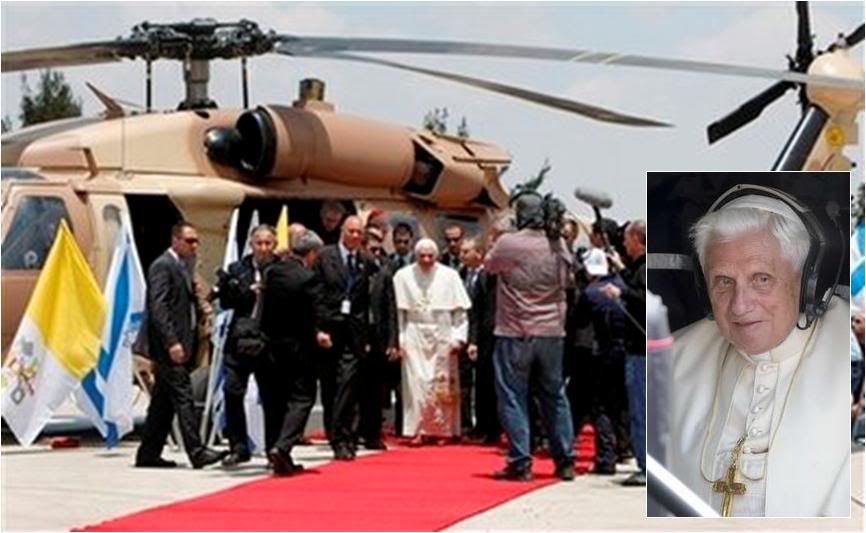 The Pope is welcomed by Jerusalem Mayor Nir Barkat.
The Pope is welcomed by Jerusalem Mayor Nir Barkat.
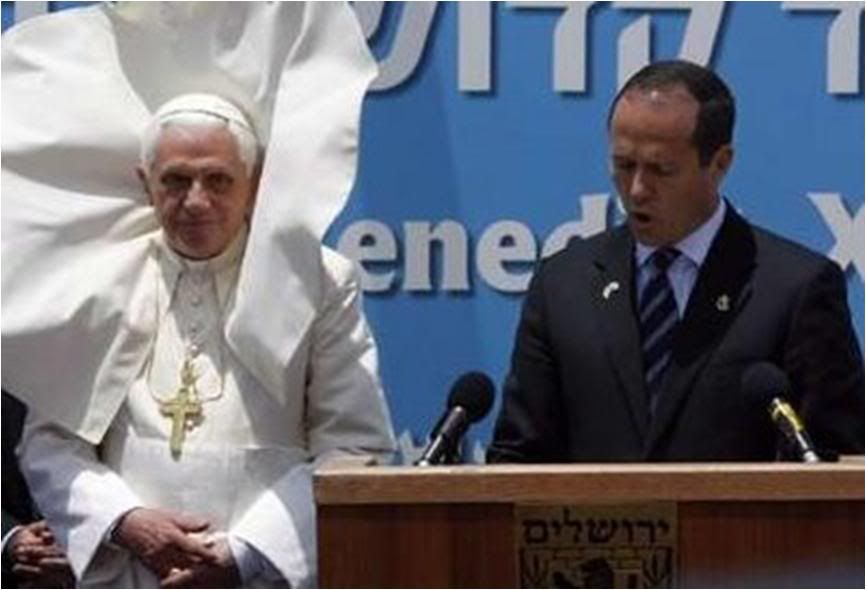 Pope in Israel
Pope in Israel
calls for Palestinian homeland
By VICTOR L. SIMPSON

JERUSALEM, May 11 (AP) – Pope Benedict XVI called for the establishment of an independent Palestinian homeland immediately after he arrived in Israel Monday, a stance that could put him at odds with his hosts on a trip aimed at improving ties between the Vatican and Jews.
The Pope also took on the delicate issue of the Holocaust, pledging to "honor the memory" of the 6 million Jewish victims of the Nazi genocide at the start of his five-day visit to Israel and the Palestinian territories.
Benedict touched down in Israel on the second leg of a weeklong pilgrimage to the Holy Land, after spending three days in neighboring Jordan. He is using the tour to reach out to both Muslims and Jews.
In his first public comments upon arriving, Benedict urged Israelis and Palestinians to "explore every possible avenue" to resolve their differences.
"The hopes of countless men, women and children for a more secure and stable future depend on the outcome of negotiations for peace," he told a welcoming ceremony at Israel's international airport.
"In union with people of goodwill everywhere, I plead with all those responsible to explore every possible avenue in the search for a just resolution of the outstanding difficulties, so that both peoples may live in peace in a homeland of their own within secure and internationally recognized borders."
While Benedict has spoken in favor of a Palestinian homeland in the past, the timing and location of his comments were noteworthy.
Israeli Prime Minister Benjamin Netanyahu, who was in the audience, has pointedly refused to endorse the two-state solution since his election. But he is expected to come under pressure to do so when he travels to Washington next week. Netanyahu did not speak at the ceremony, then flew to Egypt for talks on regional issues with President Hosni Mubarak.
Israeli Foreign Ministry spokesman Yigal Palmor played down the Pope's comments, saying he was voicing a long-standing position shared by the U.S. and European countries.
"At any rate, discussing this is not the purpose of the visit," he said.
Parliament speaker Reuven Rivlin conspicuously skipped the airport ceremony, though his office said he would join the Pope at Israel's Yad Vashem Holocaust memorial.
The Pope has tried to improve interfaith relations throughout his four-year papacy, and as a cardinal, had a long record of promoting dialogue with other faiths. But Benedict has had to tread carefully on his Middle East visit because of past gaffes.
Benedict angered many in the Muslim world three years ago when he quoted a medieval text that characterized some of Islam's Prophet Muhammad's teachings as "evil and inhuman," particularly "his command to spread by the sword the faith." He later expressed regret that his comments offended Muslims.
Before leaving Jordan, he said he had a "deep respect" for Islam.
The Vatican has also been widely accused over the years of not doing enough to stop the Holocaust — a charge it rejects. And the German-born Pope himself has faced questions for his involvement in the Hitler Youth corps during the war. Benedict says he was coerced.
The Pope outraged Jews earlier this year when he revoked the excommunication of a British bishop who denies the Holocaust. Ties were further strained when a senior Vatican official said during Israel's recent military campaign in Gaza that the territory resembled a "big concentration camp."
Later Monday, Benedict was scheduled to lay a wreath at Yad Vashem.
"It is right and fitting that, during my stay in Israel, I will have the opportunity to honor the memory of the 6 million Jewish victims of the shoah," he said, using the Hebrew word for the Holocaust. He said he would "pray that humanity will never again witness a crime of such magnitude."
Israel and the Vatican are also at odds over the legacy of World War II Pontiff Pius XII, a candidate for sainthood. At Yad Vashem, Benedict will not visit the main part of the museum, where a photo caption says Pius did not protest the Nazi genocide of Jews and maintained a largely "neutral position."
Dignitaries and religious leaders greeted the Pontiff at a red-carpet ceremony at the Tel Aviv airport. Yellow and white Vatican flags fluttered alongside blue and white Israeli banners as an honor guard played in the background.
The Pope smiled as he walked along the carpet, flanked by Israeli President Shimon Peres on one side and Netanyahu on the other. Other political leaders, along with black-robed Christian clergymen and Muslim religious leaders, stood in line to shake his hand.
"Your visit here brings a blessed understanding between religions and spreads peace near and far. Historic Israel and the renewed Israel together welcome your arrival as paving the great road to peace," Peres said.
Later, the Pope flew by helicopter to Jerusalem for another red-carpet ceremony. Mayor Nir Barkat handed Benedict an ancient map of the world, with Jerusalem in the center and dozens of children from three schools — Christian, Jewish and Muslim — welcomed him.
The children waved Israeli and Vatican flags and red carnations, and many wore T-shirts that read, "I'm with the Pope in Jerusalem."
"He loves us and wants peace," said David Sahagian, a 10-year-old from a Christian school in east Jerusalem. "I want there to be peace in Jerusalem and I want him to give us his blessing."
In the Gaza Strip, Palestinians were angry that the Pope planned to meet with the family of an Israeli soldier held by militants in Gaza for nearly three years but would not meet with relatives of any of the 11,000 Palestinian prisoners imprisoned in Israel.
Israeli police shut down a media center for the Pope's visit that the Palestinian Authority had set up at an east Jerusalem hotel. Israeli authorities object to any attempt by the Palestinians to use east Jerusalem for official business because that would suggest Palestinian sovereignty there.
Israel captured east Jerusalem in the 1967 Mideast war and the Palestinians claim it as capital of a future state.
 I hope you are watching the live coverage of the Holy Father with President Perez - a musical number about peace performed by a children's choir and two Jewish cantors (both tenors) with the most exquisite voices, following most touching speeches by both President Peres and the Holy Father. He will be proceeding to Yad Vashem now.
I hope you are watching the live coverage of the Holy Father with President Perez - a musical number about peace performed by a children's choir and two Jewish cantors (both tenors) with the most exquisite voices, following most touching speeches by both President Peres and the Holy Father. He will be proceeding to Yad Vashem now.
The Jerusalem Post has a convenient 'Pope in the Holy Land' dossier which gathers together the main articles they have published so far on the Pope's visit since it was first announced.
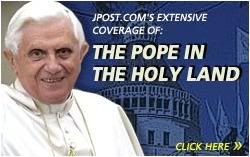
Some of it is unpleasant, even downright nasty, as, for instance a column offensively entitled "For the Jews, there's really only one Pope" - a demeaning and utterly condesceding diatribe by one David Horovitz, written at the time the Pope announced his trip last March, comparing Nemedict XVI in the most unflattering terms with John Paul II, and with almost insulting remarks about Paul VI [whom he faults basically because he visited Israel before there were diplomatic relations between the Vatican and Israel], and of course, Pius XII.
Militant Jews are forever offended at Christians for wrongs done centuries ago, forgetting that it is they who insist on carrying on a bitter enmity against Christians today, in hostile ways that no right-thinking Christian would ever think of waging against members of other religions.
What Horovitz writes would easily qualify as a litigable 'hate crime' under the bill that liberal Democrats and fringe elements like the ACLU are trying to pass in the United States.
Anyway, Here's the JPost's report on the Pope's arrival:
 Pope vows to fight anti-Semitism
Pope vows to fight anti-Semitism
By JPOST STAFF, ETGAR LEFKOVITS AND AP

Pope Benedict XVI arrived in Israel on Monday, starting a historic five-day pilgrimage by calling for peace, an end to anti-Semitism, and freedom of worship and understanding between religions.
"Thank you for your warm welcome to Israel, a land which is holy to millions," Benedict said. "I appreciate the opportunity to come here."
"I come, like so many others before me, to pray at the holy places, to pray especially for peace - peace here in the Holy Land, and peace throughout the world," the pope continued, adding that although the name Jerusalem meant "city of peace," it was all too evident that peace had eluded the region.
Benedict called for the establishment of an independent Palestinian homeland immediately after he arrived in Israel, a stance that could put him at odds with his hosts on a trip aimed at easing strains between the Vatican and Jews.
First, he has always endorsed the two-state idea, so that's not news at all - it would have been news if he did not mention it! Second, he did not directly "call for the establishment of an independent Palestinian state" as reported - of all people, he has the common sense to be so directly provocative as soon as he stepped on Israeli soil.
What he said, exactly was:
In union with people of good will everywhere, I plead with all those responsible to explore every possible avenue in the search for a just resolution of the outstanding difficulties, so that both peoples may live in peace in a homeland of their own, within secure and internationally recognized borders.
And though Netanyahu's government may make noises about being against the two-state solution, the previous government (under Sharon and then Olmert) were working with this in mind, and Israel took part in teh Annapolis Conference for a two-state solution in 2007.So the Pope is not exactly breaking any new ground here, much less saying the unthinkable!]
Benedict urged Israelis and Palestinians to "explore every possible avenue" to resolve their differences in remarks at the airport after he landed.
"The hopes of countless men, women and children for a more secure and stable future depend on the outcome of negotiations for peace," he said. "In union with people of goodwill everywhere, I plead with all those responsible to explore every possible avenue in the search for a just resolution of the outstanding difficulties, so that both peoples may live in peace in a homeland of their own within secure and internationally recognized borders."
The Pope also took on the issue of the Holocaust, pledging to "honor the memory" of the six million Jewish victims of the Nazi genocide.
He vowed to battle rising anti-Semitism, and spoke about his upcoming visit to Yad Vashem later in the day.
"Tragically, the Jewish people have experienced the terrible consequences of ideologies that deny the fundamental dignity of every human person," he said. "It is right and fitting that, during my stay in Israel, I will have the opportunity to honor the memory of the six million Jewish victims of the Shoah, and to pray that humanity will never again witness a crime of such magnitude."
"Sadly, anti-Semitism continues to rear its ugly head in many parts of the world. This is totally unacceptable," the pope continued. "Every effort must be made to combat anti-Semitism wherever it is found, and to promote respect and esteem for the members of every people, tribe, language and nation across the globe."
Turning to politics, the Pontiff urged both Israelis and Palestinians to find a solution which will allow each side to live peacefully together.
"The eyes of the world are upon the peoples of this region as they struggle to achieve a just and lasting solution to conflicts that have caused so much suffering," he said. "The hopes of countless men, women and children for a more secure and stable future depend on the outcome of negotiations for peace between Israelis and Palestinians.
"In union with people of good will everywhere, I plead with all those responsible to explore every possible avenue in the search for a just resolution of the outstanding difficulties, so that both peoples may live in peace in a homeland of their own, within secure and internationally recognized borders," the pope said. "In this regard, I hope and pray that a climate of greater trust can soon be created that will enable the parties to make real progress along the road to peace and stability."
Upon arrival at Ben-Gurion Airport, the pontiff was greeted by President Shimon Peres in a red-carpet reception. Peres warmly welcomed Benedict as "first among the faithful," and voiced hope that his presence would help foster peace in the region.
"Your Holiness the Pope, Benedict XVI, in the name of the State of Israel I welcome you and offer you a blessing on your arrival: peace," Peres said in Hebrew. Then, switching to Latin, added, "Hail Benedictus, first among the faithful, who visits the Holy Land today."
"I see your visit here, to the Holy Land, as an important spiritual mission of the highest order: a mission of peace," the president continued. "A mission of planting seeds of tolerance and uprooting the weeds of fanaticism. I appreciate your stances and your actions to bring down the level of violence and hatred in the world."
The Pope's trip comes amid lingering suspicions among Jews and Muslims over past actions and remarks by the Catholic spiritual leader. In his greetings, Peres alluded to that rift.
"I am certain that this will be a continuation of the dialogue between Judaism and Christianity in the spirit of the Prophets," he said. "Israel safeguards the absolute freedom of religious practice and free access to holy places. We are always happy to receive pilgrims from throughout the world in the Holy Land."
"We have made peace with Egypt and Jordan, and we are in negotiations to make peace with the Palestinians, and even to arrive at a comprehensive regional peace," the president continued. "Your visit here brings a blessed understanding between religions and spreads peace near and far. Historic Israel and the renewed Israel together welcome your arrival as paving the great road to peace from city to city."
Following the ceremony at the airport, Benedict XVI arrived in Jerusalem by helicopter, where he met with Mayor Nir Barkat upon his arrival in the capital.
"During your stay here, you will feel at home amongst friends who practice many faiths together in peace, harmony, and freedom," said Barkat. "You will feel at home as you breathe the ancient history and modern culture of Jerusalem. And you will feel at home because you too, Your Holiness, are a shareholder of this great city."
Barkat used the opportunity to call upon every person of faith to visit Jerusalem at least once in his/h lifetime.
Rebecca Anna Stoil contributed to this report.
[Modificato da TERESA BENEDETTA 12/05/2009 02:01] |
| |
 11/05/2009 17:35 11/05/2009 17:35 |
|
| | | OFFLINE | | Post: 17.416
Post: 134 | Registrato il: 28/08/2005
Registrato il: 20/01/2009 | Administratore | Utente Junior | |
|
 DAY 1 IN ISRAEL:
DAY 1 IN ISRAEL:
VISIT TO PRESIDENT PERES
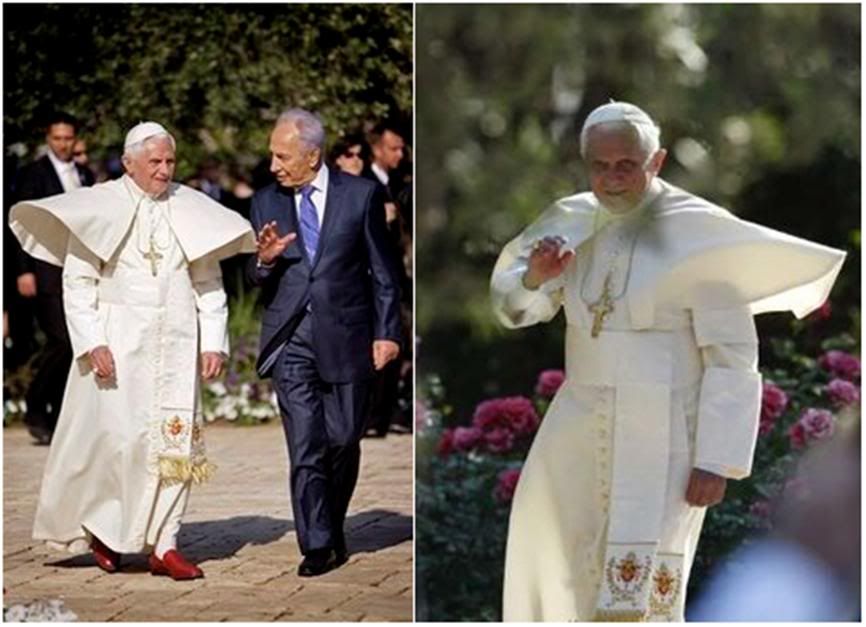
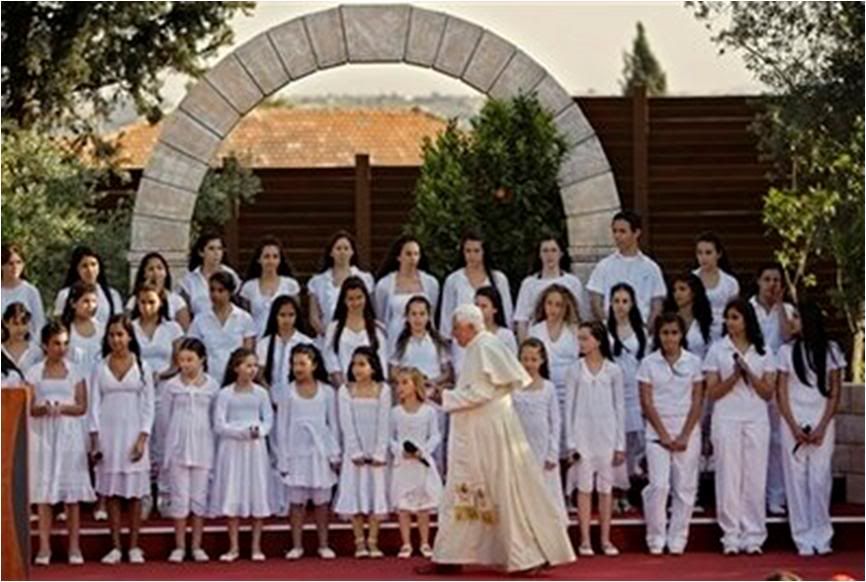 THE HOLY FATHER'S ADDRESS
THE HOLY FATHER'S ADDRESS
Mr President,
Your Excellencies,
Ladies and Gentlemen,
As a kind gesture of hospitality President Peres has welcomed us here to his residence, enabling me to greet you all and to have this opportunity to share a few thoughts with you.
Mr President, I thank you for this gracious welcome, and for your courteous greeting which I warmly reciprocate. I also thank the musicians who have entertained us with their fine performance.
Mr President, in the message of congratulations which I sent to you on the occasion of your inauguration, I gladly recalled your distinguished record of public service marked by a strong commitment to the pursuit of justice and peace.
This afternoon I wish to assure you, together with Prime Minister Netanyahu and his newly formed Government, and all the people of the State of Israel that my pilgrimage to the holy places is one of prayer for the precious gift of unity and peace for the Middle East and all of humanity.
Indeed, I pray daily for peace born of justice to return to the Holy Land and the entire region, bringing security and renewed hope for all.
Peace is above all a divine gift. For peace is the Almighty’s promise to humanity, and harbors unity.
In the book of the prophet Jeremiah we read: “I know the plans I have in mind for you – it is the Lord who speaks – plans for peace not disaster, to give you a future and a hope” (Jer 29:11-12).
The prophet reminds us of the Almighty’s promise that he can “be found”, that he “will listen”, that he “will gather us together as one”. But there is a proviso: we must “seek him”, and “seek him with all our heart” (cf. ibid., 12-14).
To the religious leaders present this afternoon, I wish to say that the particular contribution of religions to the quest for peace lies primarily in the wholehearted, united search for God.
Ours is the task of proclaiming and witnessing that the Almighty is present and knowable even when he seems hidden from our sight, that he acts in our world for our good, and that a society’s future is marked with hope when it resonates in harmony with his divine order.
It is God’s dynamic presence that draws hearts together and ensures unity. In fact, the ultimate foundation of unity among persons lies in the perfect oneness and universality of God, who created man and woman in his image and likeness in order to draw us into his own divine life so that all may be one.
Religious leaders must therefore be mindful that any division or tension, any tendency to introversion or suspicion among believers or between our communities, can easily lead to a contradiction which obscures the Almighty’s oneness, betrays our unity, and contradicts the One who reveals himself as “abounding in steadfast love and faithfulness” (Ex 34:6; Ps 138:2; Ps 85:11).
My friends: Jerusalem, which has long been a crossroads for peoples of many different origins, is a city which affords Jews, Christians and Muslims both the duty and the privilege to bear witness together to the peaceful coexistence long desired by worshippers of the one God; to lay bare the Almighty’s plan for the unity of the human family announced to Abraham; and to proclaim the true nature of man as a seeker of God.
Let us resolve to ensure that through the teaching and guidance of our respective communities we shall assist them to be true to who they are as believers, ever aware of the infinite goodness of God, the inviolable dignity of every human being, and the unity of the entire human family.
Sacred Scripture also presents us with an understanding of security. According to the Hebrew usage, security – batah – arises from trust and refers not just to the absence of threat but also to the sentiment of calmness and confidence.
In the book of the prophet Isaiah we read of a time of divine blessing: “Once more the Spirit is poured upon us … and justice will dwell in the wilderness and integrity in the fertile land; integrity will bring peace, and justice everlasting security” (Is 32:15-17).
Security, integrity, justice and peace. In God’s design for the world, these are inseparable. Far from being simply products of human endeavor, they are values which stem from God’s fundamental relationship with man, and dwell as a common patrimony in the heart of every individual.
There is only one way to protect and promote these values: exercise them! Live them! No individual, family, community or nation is exempt from the duty to live in justice and to work for peace. And naturally, civic and political leaders are expected to ensure just and proper security for the people whom they have been elected to serve.
That objective forms a part of the rightful promotion of values common to humanity and thus cannot conflict with the unity of the human family. The authentic values and goals of a society, which always safeguard human dignity, are indivisible, universal and interdependent (cf. Address to the United Nations, 18 April 2008).
Thus they cannot be satisfied when they fall prey to particular interests or piecemeal politics. A nation’s true interest is always served by the pursuit of justice for all.
Distinguished ladies and gentlemen, lasting security is a matter of trust, nurtured in justice and integrity, and sealed through the conversion of hearts which stirs us to look the other in the eye, and to recognize the “Thou”, as my equal, my brother, my sister.
In this way does not society itself become the “fruitful field” (Is 32:15) marked, not by blocks or obstructions, but by cohesion and vibrancy? Can it not become a community with noble aspirations where all are willingly afforded access to education, family housing and the opportunity for employment, a society ready to build upon the lasting foundations of hope?
To conclude, I would like to turn to the ordinary families of this city, of this country. What parents would ever want violence, insecurity, or disunity for their son or daughter? What humane political end can ever be served through conflict and violence?
I hear the cry of those who live in this land for justice, for peace, for respect for their dignity, for lasting security, a daily life free from the fear of outside threats and senseless violence.
And I know that considerable numbers of men and women and young people are working for peace and solidarity through cultural programs and through initiatives of compassionate and practical outreach; humble enough to forgive, they have the courage to grasp the dream that is their right.
Mr President, I thank you for the courtesy you have shown to me and I assure you again of my prayers for the Government and all the citizens of this State.
May a genuine conversion of the hearts of all lead to an ever strengthening commitment to peace and security through justice for everyone.
Shalom!
 |
| |
 11/05/2009 17:43 11/05/2009 17:43 |
|
| | | OFFLINE | | Post: 17.417
Post: 135 | Registrato il: 28/08/2005
Registrato il: 20/01/2009 | Administratore | Utente Junior | |
|
 At the Papa Ratzinger Forum I created a thread on
At the Papa Ratzinger Forum I created a thread on JUDAISM AND THE JEWS -
freeforumzone.leonardo.it/discussione.aspx?idd=8335345
intended to promote not just basic knowledge about Judaism, but also the Catholic outreach to the Jews since Nostra aetate. I am I am re-posting this item from that thread about the Shoah and Yad Vashem as a quick backgrounder for the Pope's visit today.

The Shoah or Holocaust has been for all Jews after World War II the watershed of their modern history and the prism through which their life and their view of the world is refracted.
Yad Vashem - the Holocaust Martyrs' and Heroes' Remembrance Authority based in Jerusalem -
yadvashem.org/
has an excellent site for acquainting anyone with all the aspects of the Shoah.
And so does the Unites States Holocaust Memorial Museum in Washingnon, D.C.
www.ushmm.org/
The scope and magnitude of Nazi Germany's systematic program to exterminate the European Jewry challenges the imagination,
but a look at the map of the death camps and the list of victims who were killed throughout Europe gives an overview at a glance.
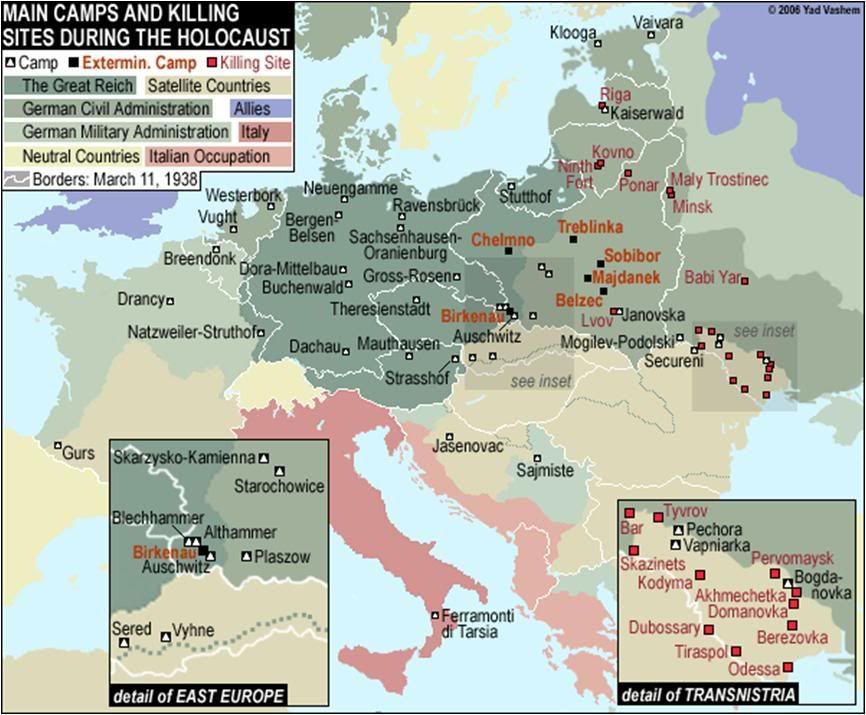
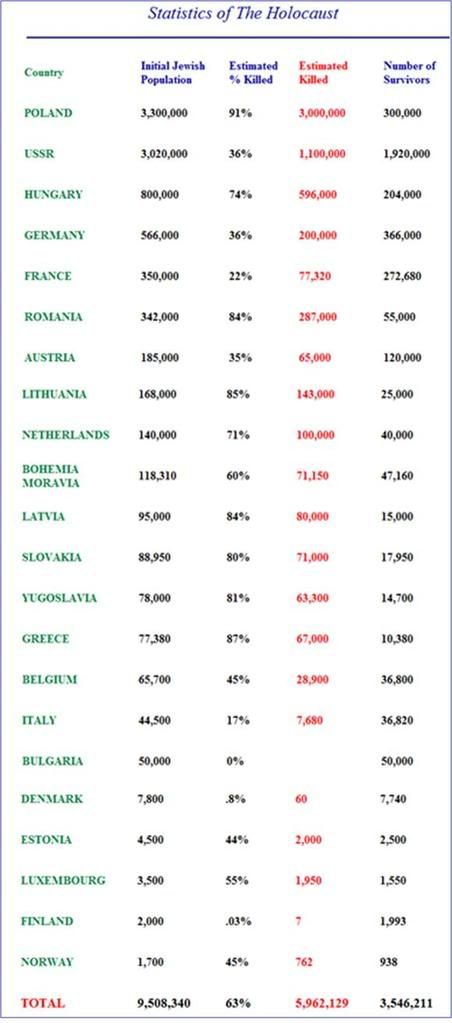 Below, left, the Hall of Rememberance at Yad Vashem with the pictures and names of Holocaust victims; right, bodies discovered at Auschwitz after the Allies liberated the camp.
Below, left, the Hall of Rememberance at Yad Vashem with the pictures and names of Holocaust victims; right, bodies discovered at Auschwitz after the Allies liberated the camp.
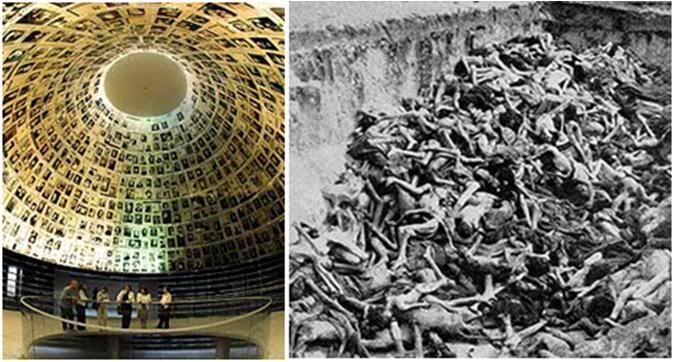
[Modificato da TERESA BENEDETTA 11/05/2009 18:00] |
| |
 11/05/2009 18:10 11/05/2009 18:10 |
|
| | | OFFLINE | | Post: 17.418
Post: 136 | Registrato il: 28/08/2005
Registrato il: 20/01/2009 | Administratore | Utente Junior | |
|
 DAY 1 IN ISRAEL:
DAY 1 IN ISRAEL:
VISIT TO THE HOLOCAUST MEMORIAL
YAD VASHEM IN JERUSALEM

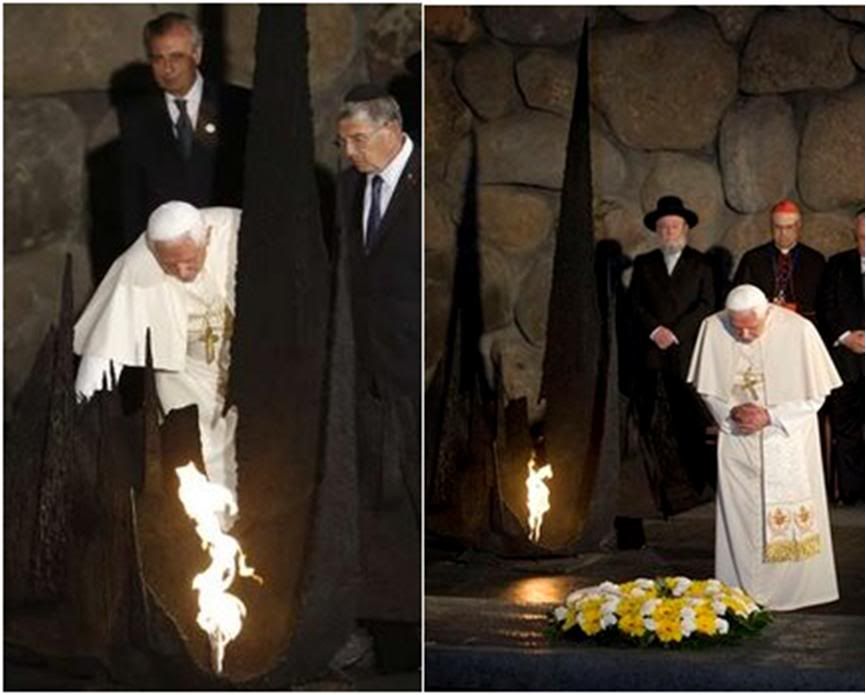 THE POPE'S ADDRESS
THE POPE'S ADDRESS
“I will give in my house and within my walls a memorial and a name … I will give them an everlasting name which shall not be cut off” (Is 56:5).
This passage from the Book of the prophet Isaiah furnishes the two simple words which solemnly express the profound significance of this revered place: yad – “memorial”; shem – “name”.
I have come to stand in silence before this monument, erected to honor the memory of the millions of Jews killed in the horrific tragedy of the Shoah.
They lost their lives, but they will never lose their names: these are indelibly etched in the hearts of their loved ones, their surviving fellow prisoners, and all those determined never to allow such an atrocity to disgrace mankind again. Most of all, their names are forever fixed in the memory of Almighty God.
One can rob a neighbor of possessions, opportunity or freedom. One can weave an insidious web of lies to convince others that certain groups are undeserving of respect. Yet, try as one might, one can never take away the name of a fellow human being.
Sacred Scripture teaches us the importance of names in conferring upon someone a unique mission or a special gift. God called Abram “Abraham” because he was to become the “father of many nations” (Gen 17:5). Jacob was called “Israel” because he had “contended with God and man and prevailed” (Gen 32:29).
The names enshrined in this hallowed monument will forever hold a sacred place among the countless descendants of Abraham. Like his, their faith was tested. Like Jacob, they were immersed in the struggle to discern the designs of the Almighty.
May the names of these victims never perish! May their suffering never be denied, belittled or forgotten! And may all people of goodwill remain vigilant in rooting out from the heart of man anything that could lead to tragedies such as this!
The Catholic Church, committed to the teachings of Jesus and intent on imitating his love for all people, feels deep compassion for the victims remembered here.
Similarly, she draws close to all those who today are subjected to persecution on account of race, color, condition of life or religion – their sufferings are hers, and hers is their hope for justice.
As Bishop of Rome and Successor of the Apostle Peter, I reaffirm – like my predecessors – that the Church is committed to praying and working tirelessly to ensure that hatred will never reign in the hearts of men again. The God of Abraham, Isaac and Jacob is the God of peace (cf. Ps 85:9).
The Scriptures teach that it is our task to remind the world that this God lives, even though we sometimes find it difficult to grasp his mysterious and inscrutable ways.
He has revealed himself and continues to work in human history. He alone governs the world with righteousness and judges all peoples with fairness (cf. Ps 9:9).
Gazing upon the faces reflected in the pool that lies in stillness within this memorial, one cannot help but recall how each of them bears a name.
I can only imagine the joyful expectation of their parents as they anxiously awaited the birth of their children. What name shall we give this child? What is to become of him or her? Who could have imagined that they would be condemned to such a deplorable fate!
As we stand here in silence, their cry still echoes in our hearts.
It is a cry raised against every act of injustice and violence.
It is a perpetual reproach against the spilling of innocent blood.
It is the cry of Abel rising from the earth to the Almighty.
Professing our steadfast trust in God, we give voice to that cry using words from the Book of Lamentations which are full of significance for both Jews and Christians:
“The favors of the Lord are not exhausted, his mercies are not spent;
They are renewed each morning, so great is his faithfulness.
My portion is the Lord, says my soul; therefore will I hope in him.
Good is the Lord to the one who waits for him, to the soul that seeks him;
It is good to hope in silence for the saving help of the Lord” (Lam 3:22-26).
My dear friends, I am deeply grateful to God and to you for the opportunity to stand here in silence: a silence to remember, a silence to pray, a silence to hope.
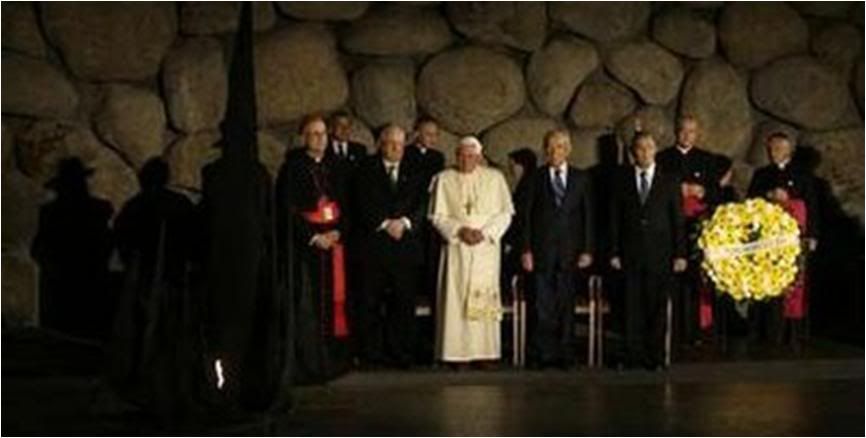 Below, left, the Pope was presented to six survivors of the Holocaust.
Below, left, the Pope was presented to six survivors of the Holocaust.
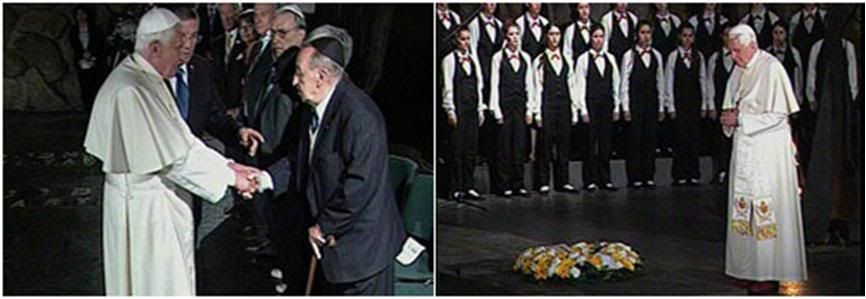
 WHEN PAUL VI SPOKE UP IN ISRAEL
WHEN PAUL VI SPOKE UP IN ISRAEL
IN DEFENSE OF PIUS XII
A most interesting item of information from the Vatican Radio dossier on the Pope's pilgrimage to the Holy Land - whioch includes a comprehensive review of the pilgrimages made by Paul VI and John Paul II as well - cites what Pope Paul VI told Israeli authorities about Pius XII when he visited the Holy Land in 1964.
I have now replaced the translation I earlier posted of the account in the dossier, with a fuller excerpt from the English text and more specific sourcing posted today on the blog Rorate Caeli. (Note that Paul VI uses the 'we' of formal tradition intead of 'I'):
The Church truly loves you all.
Our great Predecessor Pius XII affirmed this with all strength, and repeatedly, in the course of the last world conflict, and all know what he accomplished in defense and for the rescue of all those who faced difficulties, with no distinction whatsoever.
And nonetheless, you are aware, suspicions, and even accusations, have been hurled against the memory of this great Pontiff. We are glad of having the opportunity of affirming it on this day and in this place: nothing is more unjust that this outrage against such a venerable figure.
Those who, like Us, knew this admirable soul closely know just how far his sensibility could go, his compassion for human sufferings, his courage, the sensitivity of his heart.
Those who, just after the war, came, with tears in their eyes, to thank him for having saved their lives also knew it. In truth, following the One whom he represents down here, the Pope wishes nothing else than the true welfare of all men.
Paul VI
Farewell to Israeli authorities
Mandelbaum Gate (Jerusalem)
January 5, 1964
Paul VI had one advantage then that Benedict XVI does not have today.
He visited the Holy Land in January 1964, less than a year after Rolf Hochhuth's play 'The Deputy' (first performed in Berlin February 1963) first focused the spotlight on Pius XII's alleged 'inaction' during World War II to the plight of the Jews.
So it had not yet fully established the Black Legend against Pius XII that was soon to grow unchecked, and eventually picked up by those Jewish leadrs and opinion makers who capitalized on it to get back at Christianity for historical offenses by many of its leaders against the Jews through the centuries.
The controversy was born almost a full two years before Nostra aetate (December 1965).
Benedict XVI spoke up to set the record straight about Pius XII in two major addresses last year at the Vatican, but he is unlikely to bring it up in any public discourse while he is in Israel.
[Modificato da TERESA BENEDETTA 11/05/2009 21:37] |
| |
 11/05/2009 21:57 11/05/2009 21:57 |
|
| | | OFFLINE | | Post: 17.419
Post: 137 | Registrato il: 28/08/2005
Registrato il: 20/01/2009 | Administratore | Utente Junior | |
|
 Things are moving so fast that the Vatican Press Office has issued a statement about an incident during the inter-faith encounter with Pope Benedict today before the wire services had even reported the meeting, much less the incident! I learned about it when I went to the Vatican Radio site for the text of the Pope's address to the inter-religious encounter.
Things are moving so fast that the Vatican Press Office has issued a statement about an incident during the inter-faith encounter with Pope Benedict today before the wire services had even reported the meeting, much less the incident! I learned about it when I went to the Vatican Radio site for the text of the Pope's address to the inter-religious encounter.
First the statement from Fr. Lombardi:
Vatican Press Office Statement regarding
unscheduled remarks by Sheikh Tayssir Attamimi
during the Inter-religious Meeting
at the Notre Dame of Jerusalem Centre

Statement of Jesuit Fr. Federico Lombardi, Director of the Press Office of the Holy See:
The intervention of Sheikh Tayssir Attamimi was not scheduled by the organizers of the meeting.
In a meeting dedicated to dialogue this intervention was a direct negation of what a dialogue should be.
We hope that such an incident will not damage the mission of the Pope aiming at promoting peace and also inter-religious dialogue, as he has clearly affirmed in many occasions during this pilgrimage.
We hope also that inter-religious dialogue in the Holy Land will not be compromised by this incident.
Here's the first English-service news item occasioned by the Vatican statement. I left the headline as they have it, because I think the use of the phrase 'Vatican condemns...' is not only factually wwrong but also unnecessarily inflammatory, especially as the object of the supposed condemnation is a Muslim! Fr. Lombardi's statement was carefully crafted to avoid sounding offensive even as it states is points clearly - and yet the media can spoil it all by deliberate distortion.
Vatican condemns Muslim sheik's outburst
at inter-faith meeting in Jerusalem

Jerusalem, May 11 (dpa) - A Vatican spokesman condemned Monday night an outburst by a Muslim religious judge at an interfaith meeting hosted by Pope Benedict XVI in Jerusalem, saying the remarks were "a direct negation of what dialogue should be."
Sheikh Taysir Tamimi, the chief justice of the religious courts in the West Bank and Gaza, who had not been scheduled to speak, commandeered the microphone at the end of the meeting and began to criticise Israel.
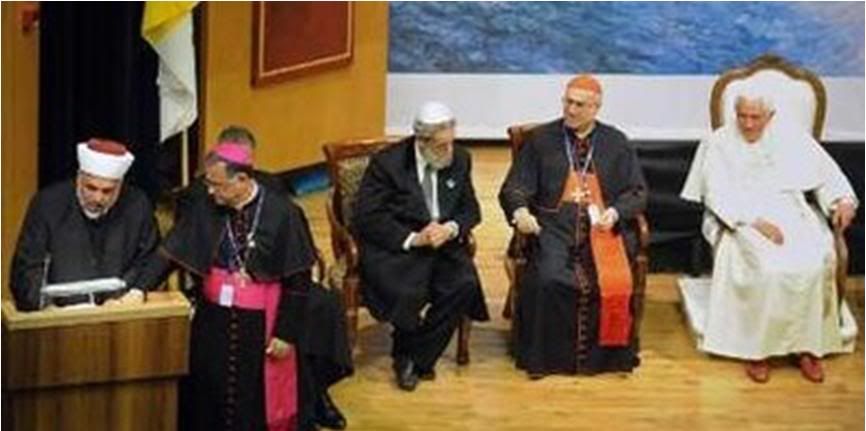 Mons. Twal trying to stop Tamimi in vain.
Mons. Twal trying to stop Tamimi in vain.
Speaking in Arabic, he called on Christians and Muslims to work against the Jewish state, saying that "we struggle together and we suffer together from the injustice of the Israeli occupation and its oppressive practices, and we look forward to freedom and independence."
"His Holiness the Pope, I call on you in the name of the one God to condemn these crimes and pressure the Israeli government to stop its aggression against the Palestinian people," he said.
Latin Patriach of Jerusalem Fouad Twal attempted without success to get Tamimi to stop speaking. Although some people in the room applauded the remarks, others appeared distinctly uncomfortable.
It was not clear whether Benedict understood what Tamimi was saying.
The meeting, attended by Jewish, Christian and Muslim religious leaders, ended after Tamimi's tirade.
"We hope that such incident will not damage the mission of the Holy Father aiming at promoting peace and inter-religious dialogue as he has clearly affirmed in many occasions in this pilgrimage," Father Federico Lombardi, director of the Holy See press office, said in a statement.
"We hope also that inter-religious dialogue in the Holy Land will not be damaged by this incident," he added.
Benedict XVI arrived in Israel late Monday morning for a five day visit during which he will visit Christian, Jewish and Muslim holy sites and will also visit the Palestinian Authority.
 Sheikh attacks Israel,
Sheikh attacks Israel,
Pope walks out
By MATTHEW WAGNER

May 11. 2009
In an impromptu speech, delivered in Arabic at the Notre Dame Pontifical Institute in Jerusalem, Sheikh Tayseer Tamimi, chief Islamic judge in the Palestinian Authority, launched a 10-minute tirade against the State of Israel for confiscating Palestinians' land and carrying out war crimes against the residents of Gaza.
He also called for the immediate return of all Palestinian refugees, and called on Christians and Muslims to unite against Israel.
Tamimi invoked the name of Saladin, the Muslim sultan who recaptured Jerusalem from the Crusaders in 1187. Tamimi said that unlike Israel, Saladin upheld the religious freedoms of all faiths.
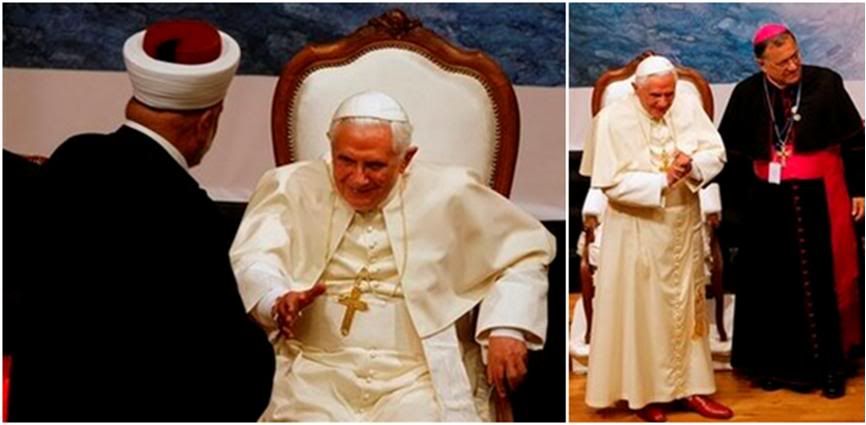
Following the diatribe and before the meeting was officially over, the Pope exited the premises. However, he shook Tamimi's hand before walking out.
The Pope, speaking before Tamimi, discussed the importance of religion and truth for the advancement of humanity's mutual understanding.
He was visibly uncomfortable with the tone of Tamimi's discourse. Even those who did not understand his Arabic quickly understood that the Muslim cleric was giving a militant speech.
Several attempts were made by Latin Patriarch in the Holy Land Fouad Twal, a Palestinian, to politely stop Tamimi. But Tamimi would not be deterred from reading his written speech, apparently prepared in advance without the knowledge of the organizers.
When Tamimi finished, applause could be heard from a few dozen in an audience of a few hundred.
Father Federico Lombardi, director of the Holy See Press Office, responded to Tamimi's tirade by e-mail.
"The intervention of Sheikh Tayseer Tamimi was not previewed by the organizers of the inter-religious meeting that took place at Notre Dame Center in Jerusalem.
"In a meeting dedicated for dialogue this intervention was a direct negation of what dialogue should be. We hope that such incident will not damage the mission of the Holy Father aiming at promoting peace and inter-religious dialogue as he has clearly affirmed in many occasions in this pilgrimage.
"We hope also that inter-religious dialogue in the Holy Land will not be damaged by this incident," Lombardi said.
Haifa Chief Rabbi Shear Yashuv Cohen, the only Jewish representative on the stage with the Pope, attacked Tamimi afterwards for "cynically exploiting the media opportunity to incite and disparage the State of Israel."
Cohen, who is also the co-chairman of a joint Chief Rabbinate-Holy See inter0religious committee, said he would refuse to meet with Tamimi again.
Oded Weiner, director-general of the Chief Rabbinate, called Tamimi's comments "scandalous" and said the Rabbinate was cutting off all ties with him.
"This unplanned speech embarrassed and was disrespectful toward our honored guest, the Pope," Weiner said immediately after the speech.
"While the Pope comes on a mission of peace and brotherhood, Sheikh Tamimi comes with a message of war," Weiner said.
The Foreign Ministry and Tourism Ministry released a joint statement saying it was "very unfortunate" that the sheikh took advantage of the event to "wildly incite against Israel."
The statement said that Israel condemned the comments, and that instead of furthering peace and dialogue, the sheikh chose to "sow division and hatred between Israel and the Palestinians, and Jews, Moslems and Christians."
Tamimi staged an identical verbal attack against Israel during Pope John Paul II's visit in March 2000.
Then, Tamimi called on "the occupier" to stop "strangling Jerusalem and oppressing its residents."
Citing land confiscations, house demolitions, settlements and the Baruch Goldstein massacre in Hebron in 1994, Tamimi said Israel had a long record of "genocide" and "shooting and wounding Palestinian children." [And what does he call the long record of Palestinian suicide bombing massacres of Israelis?]
"The establishment of an independent Palestinian state with Yasser Arafat as its president and Jerusalem as its capital - this will stop the strife between the religions," Tamimi said at the time.
He also refused to shake the hand of then-chief Rabbi Yisrael Meir Lau.
[Surely, someone at the Latin Patriarchate should have been aware of Tamimi's incident with John Paul II and cautioned Mons. Twal - who put together this interfaith meeting - about him. It's possible Twal himself was not aware of it because he was serving in some nunciature abroad at the time.]
Rev. Dr. Trond Bakkevig of the Council of Religious Institutions of the Holy Land, the interfaith body that works with Tamimi, said he was "terribly sorry" about Tamimi's speech. But he hoped that it would not shed a negative light on the entire evening.
"It is important that the whole evening is not just Tamimi's speech," said Bakkevig, who represented the (Lutheran) Church of Norway.
[Dream on! The nature of the media beast - which appears capable of sucking vulnerable people dry of their brains and ability to think for themselves - is such that the negative will always get the headlines and the media attention, while the positive is either ignored altogether or underplayed.]
[Modificato da TERESA BENEDETTA 12/05/2009 06:23] |
| |
 11/05/2009 23:10 11/05/2009 23:10 |
|
| | | OFFLINE | | Post: 17.420
Post: 138 | Registrato il: 28/08/2005
Registrato il: 20/01/2009 | Administratore | Utente Junior | |
|
 While listening today to the off-camera emcee at Yad Vashem introducing the 'numbers' on the program for the ceremony, I was impressed in a number of ways by the insistent message in what should otherwise be straightforward announcement (along the lines of "Now we wil hear from Pope Benedict") - almost every introduction mentioned the unspeakable outrage committed by "the German Nazi crminals and their collaborators.... who murdered six million Jews" in World War II (only, the language was consistently stronger than my paraphrase, and declaimed with the requisite emotion).
While listening today to the off-camera emcee at Yad Vashem introducing the 'numbers' on the program for the ceremony, I was impressed in a number of ways by the insistent message in what should otherwise be straightforward announcement (along the lines of "Now we wil hear from Pope Benedict") - almost every introduction mentioned the unspeakable outrage committed by "the German Nazi crminals and their collaborators.... who murdered six million Jews" in World War II (only, the language was consistently stronger than my paraphrase, and declaimed with the requisite emotion).
But instead of being annoyed by the relentless repetition, it struck me that it was a measure of the overriding passion felt by most Jews - certainly by the authorities of Yad Vashem - about the Holocaust.
(Even if I am nagged by the thought that perhaps there was undue emphasis on 'German' - he could simply have said Nazi - and on 'their collaborators' - was it, I am thinking paranoically, a dig at Pius XIII?]
But now comes the reactions of some of those who sat there with the Pope, who, as expected, fault him for not saying enough. HE WILL NEVER SAY ENOUGH AS FAR AS THEY ARE CONCERNED, and I find their absolute faultfinding and perpetual rancor truly sickening.
Everyone with a cause to advocate - Jordanian radicals, Palestinian extremists, the high priests of Shoah-as-sacrosanct-quasi-religion, homosexual-pandering liberal Eurocrats, bleeding-heart condom-pushing liberals - have discovered, as Italy's B-class entertainers know too well, that the fastest, surest way to get themselves into the headlines is to criticize/denounce/deride/oppose/contradict the Pope.
And MSM is only too ready to accomodate them.
Pope, in Israel, honors Holocaust dead
By Philip Pullella and Ari Rabinovitch

JERUSALEM, May 11 (Reuters) – German-born Pope Benedict on Monday made an emotional visit to Israel's memorial to victims of the Holocaust and said their suffering could not be denied, but some Jewish leaders said his comments did not go far enough.
Benedict visited the somber Hall of Remembrance of the Yad Vashem memorial, spoke to survivors, rekindled an eternal flame and laid a wreath of yellow and white flowers over a slab of stone covering victims' ashes.
He spoke of the "horrific tragedy of the Shoah," the Hebrew term for the Holocaust, and called it an atrocity that had disgraced mankind and must never be repeated.
"May the names of these victims never perish. May their suffering never be denied, belittled or forgotten," he said.
Catholic-Jewish relations soured in January when Benedict lifted the excommunication of four traditionalist bishops, including one who had denied the Holocaust.
Israel's former chief rabbi Israel Meir Lau, who attended Monday's service, expressed disappointment that the Pope was not more explicit in his comments.
"There certainly was no apology expressed here," he said. There was no "expression of empathy with the sorrow."
[Apology for what? And in behalf of whom? His only relation to the Holocaust is that he is German and the Nazis were German. What did they expect him to do at Yad Vashem? Tell the world he is ashamed to be German because the Nazis were German? And what 'empathy for the sorrow'? Was not the entire address empathy of the most sincere kind?]
The Pope had made a moving speech, Lau said, but "something was missing. There was no mention of the Germans or the Nazis who participated in the butchery, nor a word of regret." [He did not have to mention the Nazis and the Germans - the emcee took care of that, everytime he spoke. And is there anyone who does not know that the Nazis were responsible for the Holocaust and that they were Germans? As for regret, when someone says This should never be allowed to happen again', is that not stronger than mere regret?]
Yad Vashem director Avner Shalev-Yad said the Pope should have spoken of his own German background at the memorial. [Why? He is not there to promote himself. He is there as the Vicar of Christ and head of the Catholic Church.]
"He stood here as a Pope, but on the other hand he is a human being, and he had that experience, and I think the world expected he would have shared part of that awful experience in his address," he said.
[SHOULDA, WOULDA, COULDA - this carping will never stop. Is there anything in Judaism that precludes against the exercise of what Christians call charity? Apparently, militant Jews like these critics of the Pope are stuck at the Mosaic law of 'an eye for an eye', but I doubt that they would be satisfied even if the Pope gouged out his own eyes in 'symbolic atonement'.]
Born Joseph Ratzinger in Bavaria in 1927, Pope Benedict was a member of the Hitler Youth when enrolment was compulsory, although biographers say he was never a Nazi party member or a supporter of Hitler. [As if without what 'biographers say', Pulella would consider that Ratzinger could have been a Nazi party member or a supporter of Hitler. Dear Lord, what does it take for people like Pulella to show some moral fiber once in a whiule?]
During the service in the hall, whose floor is inscribed with the names of 22 of the most infamous of the Nazi camps, the stone walls echoed with the voice of a cantor chanting a Jewish prayer for the dead. Benedict chatted with six elderly Holocaust survivors.
"I told the Pope he was born in Germany but I don't look at him as a German but as a human being and head of the Catholic Church," said survivor Ed Mosberg, a Jew who was born in Poland and now lives in the United States.
"But I told him that he knows that the Holocaust happened and I asked him to condemn all the deniers," Mosberg said.
Since the affair of Holocaust-denying bishop Richard Williamson exploded in January, the Pope has several times said there is no room for Holocaust deniers in the Church.
After the outcry over the lifting of Williamson's excommunication, the Vatican said it had not known enough about the British bishop's past.
Israel's President Shimon Peres, who also attended the Yad Vashem service, told the Pope earlier at the airport arrival ceremony that he could contribute to peace in the Middle East.
At the airport, the Pope called for a "just resolution" of the Israeli-Palestinian conflict "so that both peoples may live in peace in a homeland of their own, within secure and internationally recognized borders."
The call highlighted differences with Israel's new, right-leaning government. Since becoming prime minister six weeks ago, Benjamin Netanyahu has not endorsed creation of a Palestinian state, a U.S. and Arab priority. Netanyahu says he puts Israel's security first.
At the Pope's last event on Monday night, a senior Palestinian Muslim cleric fiercely denounced Israeli policy in Jerusalem in the presence of the pope and appealed to the Pope to help end what he called the "crimes" of the Jewish state.
The speech, at the end of a meeting between the Pope and Christian, Muslim and Jewish clergy engaged in contacts among the three main religions in Jerusalem, angered both the Vatican and Israel's chief rabbinate, which said it would boycott the dialogue forum until the Palestinians barred the cleric.
(Additional reporting by Reuters Jerusalem bureau staff; editing by Andrew Roche)
[Modificato da TERESA BENEDETTA 11/05/2009 23:59] |
| |
 12/05/2009 01:10 12/05/2009 01:10 |
|
| | | OFFLINE | | Post: 17.421
Post: 139 | Registrato il: 28/08/2005
Registrato il: 20/01/2009 | Administratore | Utente Junior | |
|
 This story is getting very good play in Israel, as may be expected.
Pope pledges to do 'utmost'
This story is getting very good play in Israel, as may be expected.
Pope pledges to do 'utmost'
to gain Schalit's release
By GREER FAY CASHMAN
The family of Gilad Schalit asked Pope Benedict XVI on Monday to use his influence to prompt the soldier's Hamas captors for a sign that he was still alive.
During a meeting at Beit Hanassi with Schalit's father, Noam, and other family members, the Pope promised to do his utmost to work for the soldier's release.
Noam Schalit told the Pope that for three years, no one had been allowed to visit his son in captivity.
When Gilad Schalit was 11 years old, he wrote a story, "When the Shark and the Fish First Met." The story was turned into a book, which was translated into Italian and was a best seller at the Turin International Book Fair a year ago.
Noam Schalit presented a copy to the Pope, who asked Schalit, his wife Aviva, and Gilad's grandfather, Zvi Schalit, many questions about the author.
The 15-minute meeting took place before President Shimon Peres and the Pope went out into the garden of Beit Hanassi to speak in front of 600 guests.
Among them were former president Yitzhak Navon and the widows of presidents Chaim Herzog and Ezer Weizman, as well as government ministers, Knesset members, members of the papal delegation, leaders of the various religious communities in Israel, members of the diplomatic corps, and leading Israeli figures in different fields.
The message of the Schalit family was endorsed by singers Dudu Fisher and David D'Or, backed by an ecumenical girls' choir singing "Bring Him Home" in Hebrew, Arabic and English.
However, relatives of executed Israeli spy Eli Cohen who had been invited to the reception were upset that they had not been given the same opportunity as the Schalits to meet the Pope and ask him to intercede with the Syrian authorities as another step in the long attempt to bring Cohen's remains to Israel for burial.
In a letter Cohen's brother Abraham wrote to the Pope, he noted that the Pontiff's visit to the Holy Land coincided with the 44th anniversary of Eli Cohen's execution by hanging in Martyrs Square in Damascus.
Cohen's widow, Nadia, who has been tirelessly campaigning for the release of his body, said that the state had forgotten what it owed him. Both she and her brother-in-law said that part of Israel's victory in the 1967 Six Day War could be credited to Cohen.
Nadia Cohen added that her children were now older than their father had been at the time of his death.
Peres promised Abraham Cohen that he would deliver the letter to the Vatican's secretary of state, Cardinal Tarcisio Bertone.
Another guest at the reception was State Comptroller Micha Lindenstrauss, whom Abraham Cohen approached and asked to assist.
When The Jerusalem Post asked Lindenstrauss whether he was going to help, he replied that he would so privately, but not in his public capacity.
In fact, he said, he had been making efforts privately for a long time and was well aware of the situation, since one of his closest friends is author Sami Michael, Nadia Cohen's brother.
 Our beloved Pope needs something like the 'shadow of Peter' miracle described in the Acts of the Apostles to deal with all the expectations heaped on his plate from all sides!
Our beloved Pope needs something like the 'shadow of Peter' miracle described in the Acts of the Apostles to deal with all the expectations heaped on his plate from all sides!
|
| |
|
|
|
|